Resume builder

The Best Research Skills for a Resume
If you want to apply for a research position, you need to provide evidence of research skills on your resume. In this article, we explore what the best research skills for a resume are, why they are important and how to list them properly. We also provide a researcher resume sample to get you started – you can use it as inspiration or a template.

Table of Contents
What Are Research Skills?
A career like research is an excellent option for anyone who can collect, analyze and interpret data, solve complex problems, dive deep into discovery, and offer innovative solutions. The best thing about being a researcher is that you can not only succeed in science and academia but also climb up the career ladder in the corporate world. Indeed, having solid research skills opens the door to many roles and industries, including academic environments, government settings, transnational corporations, startups, tech giants, and non-profit organizations, to name but a few.
From human behavior to regional studies to biotech, there are myriads of research spheres where a qualified individual can make a difference. Researchers utilize their skills to explore a variety of topics, and if you have your mind set on pursuing a career as a researcher, you need to understand what skill set is pivotal for success in this field.
In a nutshell, research skills are all about searching ways to resolve problems. They are knowledge, abilities and competencies that ensure you can investigate particular topics, perform critical analysis, extract and organize data, interpret results, form hypotheses, and derive data-driven conclusions.
As a researcher, you are expected to be capable of relaying your findings to other people in a compelling and digestible form and even inspire action, both in yourself and in others.
Whether you are a seasoned researcher or a novice in this field, you need to put the right skills on your resume . Below you will find a list of the most in-demand research skills in today’s job market.
The Top 10 Research Skills for a Resume
Communication.
Communication is a crucial aspect of a research career since you are required to share information, relay findings and spread knowledge efficiently and effectively, both orally and in writing . While communication skills certainly have a place on your resume , that doesn’t mean adding “Communication” to your list of skills is enough to move on. You need to provide relevant examples verifying that you can research things as part of a team and work towards a common goal. You could add something like this to add credibility to your claim:
Recruited 7 research assistants for clinical studies by visiting clinics and sending out email invites, increasing participation by 20%.
Explained 100+ research procedures to a group of study participants in 10 days, resulting in a 0% incident rate.
Problem Solving
Being an advanced problem solver means you can consistently identify issues and find effective and efficient solutions to them . It is an extremely valuable skill when it comes to research-based activities, and 86% of employers look for workers who are capable of solving problems in the workplace according to the National Association of Colleges and Employers’ Job Outlook 2022 survey. If you want to add problem-solving skills to your resume, you need to underpin them with relevant accomplishments. For instance, you could add examples like these:
Resolved course accessibility issues by creating interactive presentations for remote learners, increasing student satisfaction by 89%.
Developed and introduced a new computing environment for analysis, identifying 100% of failure patterns and improving issue detection by 75%.
Analytical Skills
Having analytical skills means you can parse data into digestible pieces, interpret them correctly and make data-based connections and conclusions . Data analysis incorporates a vast set of competencies, including technical skills like proficiency in programming languages, such as Python and R, familiarity with data visualization tools, like Tableau and Power BI, and a strong grasp of statistical analysis methods, such as hypothesis testing, regression analysis, and sample size determination. Armed with these skills, a researcher can take data to the next level and drive both innovation and profitability.
Being able to make sense of facts and figures both manually and using automated solutions will help you thrive in most roles, so recruiters would love to know that you are an analytical thinker when considering your candidacy. Your best bet here is to make sure they can find this out by examining your resume. You can add examples like the ones below to prove you can tackle complicated issues using your analytical skill set:
Collected, cleaned and analyzed first-party data from 10+ departments to identify the socio-economic impact of the COVID-19 pandemic on the company.
Performed regression analysis to determine the effects of a company-wide minimum wage increase, concluding that the hiring process was accelerated by 25% due to the wage change in question.
Qualitative Analysis
Qualitative analysis allows you to analyze a research subject using non-numerical and non-quantifiable parameters, characteristics and indicators and is based on abstract concepts . For instance, you can use qualitative attributes like human behavior or brand reputation to make business decisions or recognize investment opportunities. This skill is in demand today as it helps researchers use their observations to make conclusions, identify patterns and tackle challenges. Since you cannot quantify this area of your expertise, you need to provide relevant context to convince the reader that you are capable of analyzing non-tangible aspects of a subject. You can do that by using appropriate examples, like the following ones:
Evaluated the quality and accuracy of 200+ data sources in a month.
Performed quality control of high-volume content in a rapidly changing environment, maintaining a quality score of 99.9%.
Quantitative Analysis
Quantitative analysis is an approach that allows you to collect, study, measure, and analyze data . From statistical research to financial modeling, quantitative analysis includes a powerful toolkit that helps a researcher refine and simplify vast amounts of raw data to make better decisions and forecast trends.
Quantitative analysis has countless applications: with it, you can track metrics, measure variables and evaluate parameters in multiple fields, from finance and accounting to molecular biology and astrophysics. Therefore, it is no wonder that it is one of the most important research skills for a resume and highlighting it the right way is likely to help you move forward in the job searching process. You can prove that you know how to work with tangible data by providing relevant examples, like the following ones:
Designed a new data analysis technique, saving 30 monthly hours in parameter comparisons.
Used SQL to analyze customer data and identify areas for improvement related to customer conversions, resulting in a conversion boost by 75%.
Academic Writing
Academic writing is the ability to create complex documents containing scientific data, such as formulas, graphs, and charts . Academic writing skills help researchers prepare reports, presentations and articles for scientific journals and magazines, and if you have them, it means you know how to present technical information clearly and concisely. Recruiters from scientific fields are especially interested in candidates capable of writing academically, so submitting a resume with examples of written work is likely to help you secure a position as a researcher. Listing your publications to prove your expertise is the best option here, but since you might not have enough space to add all your papers, books and articles, you could highlight your academic writing proficiency with something like this:
Created 350+ articles on the principles of academic research for the university’s database, increasing student satisfaction by 60%.
Published 30+ papers focused on structural changes in protein conformations.
We know that expressing your writing potential in limited words can be difficult, so here getting assistance from a summarizing tool can be a good idea.
Literature Review
Literature review is a methodology that implies conducting rigorous research on a particular topic . Having literature review skills means you can explore your subject area in greater depth using sources like books, journal articles, industry magazines, etc. Such competencies allow you to build upon existing knowledge and generate new ideas, accelerating your research and pushing it to its full potential. Naturally, your literature review skills are a valuable asset to your resume. We recommend you to illuminate them with appropriate examples, focusing on tangible outcomes:
Gathered and reviewed 10+ articles on Stata to extract variables from a dataset.
Performed 100+ literature reviews to implement changes in clinical practice, boosting quality of care by 70%.
Time Management
Time management is a powerful soft skill that is especially valuable in research environments. It allows you to manage your time effectively, break large tasks into manageable chunks and prioritize them properly, set up measurable, attainable, and time-bound goals, and even juggle your responsibilities . Proper time management helps you stay focused on your work, boosts your productivity and thereby leads to consistently high results and impressive outcomes. From carrying out experiments to writing reports to teaching, as a researcher, you need to apply time management strategies on a daily basis to successfully accomplish your tasks. You can show you are good at time management on your resume by showcasing your successes, like in the examples below:
Developed a database for organizing behavioral data for 100+ study participants, decreasing data processing time by 30%.
Implemented data analysis techniques in Python, increasing the amount of data analyzed per hour by 17% and accelerating project completion by 40%.
Attention to Detail
Paying attention to detail is a vital aspect of being a researcher. Having this skill helps you gather credible information, perceive meaningful connections, notice discrepancies, and deliver high-quality work based on correct evidence. Since each and every aspect of a career in research requires efficiency and trustworthiness, attention to detail is something you cannot go without – otherwise, your progress will come to a screeching halt. Naturally, you need to illuminate this skill on your resume as recruiters seek candidates who can look at details with a critical eye and minimize distractions. And the best way to do that is by providing a relevant example of success. You can use the ones below for reference:
Checked 10 + data sheets for completion and quality per day, resulting in a <1% error rate.
Supervised the maintenance and updates of the lab’s database with a 99% accuracy rate.
Editing & Proofreading
Editing and proofreading skills are essential to perform successful research since they ensure it is both accurate and easy to read . While editing is more about making your text more digestible and improving the overall quality of your writing, proofreading corrects surface issues like errors in spelling, punctuation and grammar. Both require you to have a solid command of the language you use and a certain degree of focus. The devil is indeed in the details, so you need to always polish your texts before submitting them. Only this way will they be perceived by your peers and superiors as constructive and professional. And to prove you are good at editing and proofreading, you need to add appropriate examples to your resume. Here is how you can demonstrate your ability to provide high-quality texts:
Edited 11 federal grant proposals designed by my team, which generated $200+ in lab funding.
Edited a research paper co-authored with 2 postdoctoral employees regarding protein generation, which received the Best Paper Award in 2020.
How to List Research Skills on a Resume
Your resume is the best place to highlight your research experience and the value you could bring to your next role. The key here is to put your research skills in the right section so that they get noticed by the reader. You have no fewer than 7 options here:
- A dedicated research section
- Your work experience section
- The education section
- The list of your research publications
- The projects section
- The skills section
- Your resume summary
If you have a solid research background, you may want to create a separate section on your resume and call it Research or Research Experience . This place will help you expand on your projects and their details, specify the nature of your research, and describe the specifics of your previous roles, providing relevant examples and demonstrating the most prominent accomplishments.
If your career is all things research, the work/professional experience section can incorporate your research skills and accomplishments. List your employers and your duties, along with the dates of your employment, like you would do when describing your non-research work experience.
Your education section is an appropriate place to highlight your research skills if you are a student or a recent graduate. You can put it at the top of your resume if you want to draw more attention to your research background when applying for your first job in science or academia.
If you have a whole host of published works, it could be a great idea to create a separate section for listing your publications . This will help you add credibility to your research skills and accomplishments. Research-related accomplishments can also be highlighted as projects on your resume. This might be appropriate if your research background is not so extensive or not quite relevant to your current career aspirations.
You can list your research skills in your skills section as long as they are tangible and relevant for the job you want to land. We recommend you to avoid general skills here and focus on industry-specific expertise, illuminating it with the keywords you can find in the corresponding job listing and relevant skill levels .
Highlighting your research skills in the summary section is appropriate if you are applying for a role where a robust research background is essential. Your resume summary is just a few lines appearing at the top of the document, so make sure to add only the most important research skills there – those that you want the reader to see first and foremost.
Why Are Research Skills Important?
Research-oriented positions and most jobs in academia require you to have a solid set of research skills. Employees outside these roles can also benefit from research experience – research skills are transferable , meaning you can bring them to the table no matter your position, career field or job level. Therefore, they are a valuable addition to a resume in many cases.
Businesses and organizations are eager to employ candidates with proven research skills because they can
- come up with original plans and ideas,
- design innovative products and services,
- improve processes,
- keep up with technology,
- identify customers’ needs and requirements and find ways to meet them,
- resolve complicated issues,
- analyze competitors’ strengths and weaknesses,
By adding research skills to your resume, you show recruiters that you can think outside the box, know how to work with data and technology, are capable of making well-informed decisions, and are good at solving problems. This makes you a valuable hire in today’s skill-based job market
A Resume Sample to Apply for a Research Position
JOHN/JANE DOE Research Assistant Location ⋅ Email ⋅ Phone number Diligent and hardworking clinical researcher seeking a position at [Name of Company] to apply academic expertise and facilitate biological research. PROFESSIONAL EXPERIENCE Company/Organization, Location Dates of Employment Research Assistant Assisted scientists in 30+ research projects related to therapeutics for COVID-19 Conducted data-driven testing with an accuracy rate of 98% Supervised a team of 3 junior research assistants with daily laboratory duties Company/Organization, Location Dates of Employment Graduate Research Assistant Participated in cell research projects as part of a cross-departmental team of 30 researchers. Performed cell counts with 99% accuracy Was engaged in developing a platform to investigate immune responses to virus-infected hepatocytes. … Company/Organization, Location Dates of Employment Research Student Assistant Gathered and analyzed data and evidence for 10+ clinical research cases monthly. Awarded “Research Impact Award” in recognition of consistent research excellence (only 1 student is awarded in a class of 100). … EDUCATION NAME OF UNIVERSITY Location Degree, Major Dates of Education SKILLS Molecular cloning RNA isolation Cell counting Knowledge of SQL code and queries Data analysis Literature review
A career in research is an extremely exciting yet quite a demanding path. Since the competition for positions in the field is very fierce, as a researcher, you need to have high levels of determination and persistence and a powerful combination of skills. The research skills we have outlined in this article are what recruiters expect to see on your resume, so make sure to expand on them to get the job of your dream, rise to the top of your game and deliver ground-breaking research.
Leave a Reply Cancel reply
Your email address will not be published. Required fields are marked *
Save my name, email, and website in this browser for the next time I comment.
Explore Jobs
- Jobs Near Me
- Remote Jobs
- Full Time Jobs
- Part Time Jobs
- Entry Level Jobs
- Work From Home Jobs
Find Specific Jobs
- $15 Per Hour Jobs
- $20 Per Hour Jobs
- Hiring Immediately Jobs
- High School Jobs
- H1b Visa Jobs
Explore Careers
- Business And Financial
- Architecture And Engineering
- Computer And Mathematical
Explore Professions
- What They Do
- Certifications
- Demographics
Best Companies
- Health Care
- Fortune 500
Explore Companies
- CEO And Executies
- Resume Builder
- Career Advice
- Explore Majors
- Questions And Answers
- Interview Questions
How To Put Research On Your Resume (With Examples)
- How To Write A Resume
- How To Build A Resume
- Specific Resume Words
- Action Verbs On A resume
- Words To Describe Yourself
- Resume Outline
- How To Make A Resume
- How To Make A Resume On Word
- How To Write A Resume Profile
- General Resume Examples
- Resume With No Experience
- Student Resume
- College Resume
- Entry Level Resume
- Military Resume
- Internship Resume
- First Resume
- College Application Resume
- 2 Page Resume
- Blank Resume Template
- College Freshman Resume
- Work History
- Resume Templates
- Resume Tips
- Best Resume Writing Services
- Things To Avoid On A Resume
- Resume Paper To Use
- What To Include In A Resume
- How To Write A Bio
- How To Write A Personal Statement
- Lied on Your Resume?
- Avoid Age Discrimination
- Words and Phrases You Shouldn't Include in Your Resume
- How Many Skills Should You List On A Resume
- Send A Resume As A Pdf
- Resume Critique
- Make A Resume Stand Out
- Resume Spelling
- Resume Past Or Present Tense
- How To List Projects On A resume
- Best Resume Action Words
- How To Quantify Your Resume
- Resume Bullet Points
- Are Resume Writers Worth It
- How Many Jobs To List On Resume
- Please Find Attached My Resume
- How To List Contract Work On Your Resume
- How To Put Research On Your Resume
- What Is A CV?
- CV Vs Resume
- CV Templates
- CV Examples
Find a Job You Really Want In
Research experiences and skills are an incredibly important aspect of many job applications, so it’s important to know how to put them on your resume correctly. Hiring managers and recruiters want employees who can help drive innovation by being able to apply research skills to problem solve and come up with creative growth solutions. If you’re a job seeker looking to include your research skills on a resume , we’ll go over how to list research on resume, where you can include it on a resume, and give you some examples. Key Takeaways: If you don’t have traditional research experience, highlight the skills used for research that you’ve used in past jobs. Consider creating a separate research section in your resume if you have a lot of research experience or merge sections, depending on which section you want to bolster with research. Research experience is one of the best assets to include on a resume so be on the lookout for more opportunities. In This Article Skip to section What are research skills? Where to put research experience on your resume How to include research on your resume Examples of research on a resume How to put research on your resume FAQ References Sign Up For More Advice and Jobs Show More What are research skills?
Research skills are any skills related to your ability to locate, extract, organize, and evaluate data relevant to a particular subject. It also involves investigation, critical thinking , and presenting or using the findings in a meaningful way.
Depending on what job you’re applying for, research skills could make or break your ability to land the job. Almost every job requires some research skills and you probably already have some of those skills mastered by now.
For most careers, research is a vital process to be able to answer questions. “Research skills” are not a single skill, but multiple ones put together.
Some skills that are necessary for research are organization, problem-solving, critical thinking, communication, and specific technical skills, like coding, Excel, and copywriting.
Where to put research experience on your resume
Including research experience and skills on a resume can be incredibly flexible. When thinking about how to add it to your resume, you want to consider how the research experience adds to your resume.
Your research experience can be included in a few different sections of your resume. Some of those sections include:
Academic accomplishments
Research experience
Work experience/history
College activities
Volunteer work
Presentations and publications
Skills section
If you’ve had smaller research roles but no “official” research experience, you can highlight the skills associated with the types of research mentioned above in your job description under the work history section in your resume.
If your job history is a research position, then naturally, you would include research under the work history section. You can also merge your sections depending on what type of position you are applying for.
For example, you could create a “Research and Education” section or a “Research and Publications” section. If your research is not related to your education and you don’t have any publications, you can also detail it in a separate “Research” section in your resume.
How to include research on your resume
To include your research on your resume, you should gather all the necessary information and then quantify your accomplishments to fit into specific sections. Here is a more detailed list of how to write about research experience in resume:
Gather all the necessary information. The first step is to collect all of the important details like the title of the research project, the location of the research project, the principal investigator of the project (if applicable), and the dates of the project. You will list these details much like you would list a company you have worked for in the past.
Read the job description carefully. Every resume and cover letter you write should be tailored to the job you’re applying for. When a hiring manager puts a necessary qualification in their job posting, you must be sure to include it in your resume.
Make sure that you highlight the right types of research skills on your job applications and resumes.
Quantify your accomplishments. When describing your role on the project, you will want to summarize your accomplishments and deliverables. Hiring managers and recruiters love seeing numbers. When you write out the deliverables from your project, make sure you quantify them.
Incorporate into your work history section. If there were times when you used your research skills in your past employment opportunities, include them in your work experience section. You can also include publications, conferences you may have presented at, and any awards or recognition your research had received.
If you have completed research in an academic setting, then presentations (oral and poster) are an important part of the research process. You should include those details along with the titles of your publications.
Add to your research section. Other aspects of research that you can detail to make your application more competitive are adding skills specific to your project to the skills section of your resume.
These skills will vary depending on the subject matter, but some examples include coding languages, interviewing skills, any software you used and are proficient in using, managerial skills , and public speaking if you have presented your research at conferences.
Add research to your skills section. If the specific research you did is less important than the skills you used to perform it, highlight that in your skills section. That way, you don’t have to take up a lot of work or education history with slightly irrelevant information, but hiring managers can still see you have research skills.
Just be sure you’re more specific about a research methodology you’re an expert in because the skills section doesn’t give you as much room to explain how you leveraged these abilities.
Sprinkle research throughout your resume. If you have a lot of experience performing research in professional, volunteer, and educational settings, pepper it in a few different sections. The more hands-on experience you have with research, the better (for jobs that require research).
Examples of research on a resume
Let’s look at some examples of how research can be included on a resume:
University research example
EDUCATION Undergraduate Thesis, University of Connecticut, Dec. 2017-May 2018 Worked alongside UCONN English Department head Penelope Victeri to research the poetry of New England writers of the 20th century. Explored common themes across the works of Elizabeth Bishop, Wallace Stevens, and Robert Lowell. Performed online and in-person research on historical documents relating to each author , including information on the political, religious, and economic landscape of the US at the time. Analyzed poetic works of each author and drew on similar contemporary regional authors’ works. Prepared 20,000 words thesis entitled “Place, Allegory, and Religion: Three 20th Century New England Poets” and defended my written arguments to a panel of English professors.
Customer service research example
WORK EXPERIENCE Conducted interviews with 20 customers each week to gain insight into the user experience with company products Used Google analytics to determine which pages were driving most web traffic, and increased traffic by 11% Reviewed thousands of customer surveys and compiled findings into monthly reports with graphic findings Presented at weekly marketing meeting to inform marketing team of trends in customer experience with our products
Laboratory research example
RESEARCH Conducted experiments on rat brains by introducing various novel chemical compounds and levels of oxygen Ran electricity through brain slices to view interaction of different chemical compounds on active brain cells Prepared sterile samples for daily check and maintained 89% percent yield over the course of a 3-month study Presented findings in a final 15 -page research report and presentation to the Research and Development team
Examples of common research skills to list on your resume
Here are examples of research skills in action that you may have overlooked:
Searching for local business competition
Sending out customer satisfaction surveys
Summarizing current policies and laws in effect for a particular topic
Creating lesson plans based on current education standards
Reading literature reviews and implementing changes in clinical practice
Attention to detail
Problem-solving skills
Critical thinking
Project management skills
Communication skills
How to put research on your resume FAQ
Why are research skills important?
Research skills are important because they can help you identify a problem, gather information, and evaluate that information for relevancy. Including your research skills on a resume will show hiring managers that you have the ability to suggest new ideas and help their organization adapt and change as the industry changes.
What are research skills?
Some common research skills include:
critical thinking
Computer skills
Can I list research as a skill?
Yes, you can list research as a skill on your resume. Including your research skills in your resume can help show a potential employer that you have the ability to suggest new ideas and use critical thinking to find solutions to problems. Most research skills will use attention to detail, problem-solving, and project management skills.
California State University San Bernardino – Incorporating Research Project Experience on Your Resume
University of Missouri – How to Put Research on Your Resume
How useful was this post?
Click on a star to rate it!
Average rating / 5. Vote count:
No votes so far! Be the first to rate this post.

Heidi Cope is a former writer for the Zippia Career Advice blog. Her writing focused primarily on Zippia's suite of rankings and general career advice. After leaving Zippia, Heidi joined The Mighty as a writer and editor, among other positions. She received her BS from UNC Charlotte in German Studies.

Related posts
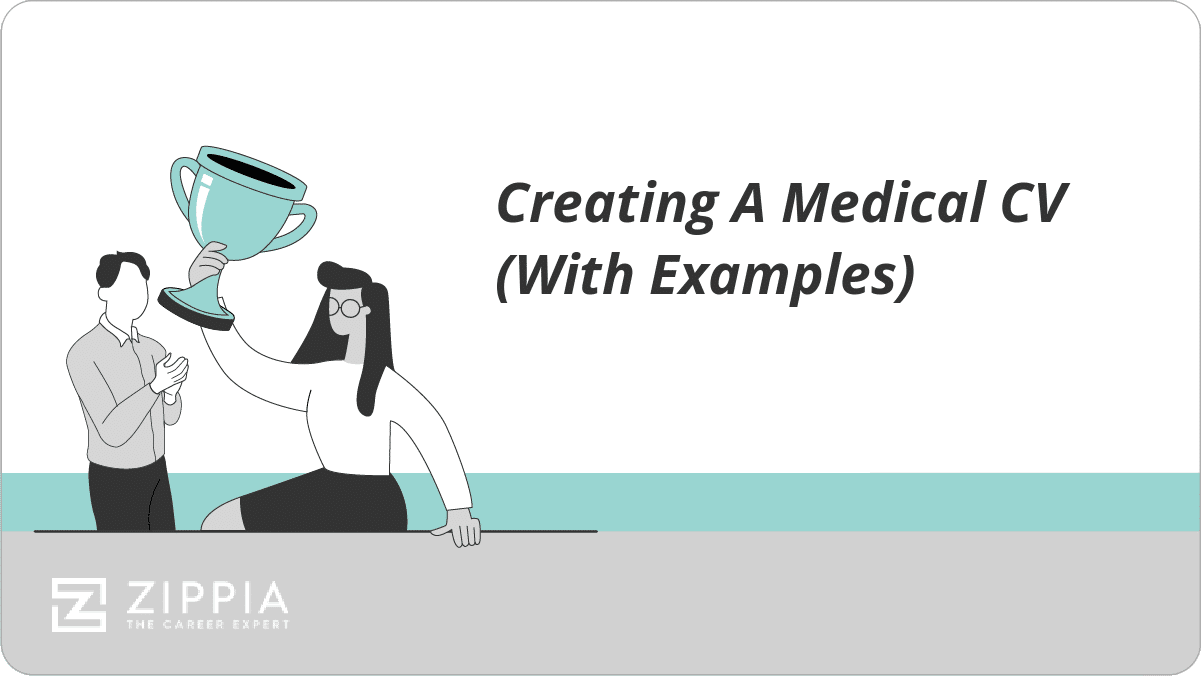
Creating A Medical CV (With Examples)

How To Follow Up With A Recruiter (With Examples)

8 Ways To Stand Out In A Group Interview
Are People More Productive Working From Home? [2023]
- Career Advice >
- Get The Job >
- How To Put Research On Resume Research Experience
- Resume Templates
- Resume Examples
- Free Resume Builder
- How to Write a Resume
- Resume Format
- Resume Packs
- Cover Letter Templates
- Cover Letter Examples
- Free Cover Letter Generator
- How To Write a Cover Letter
- CV Templates
- CV Examples
- Free CV Maker
- Resume Help
- Cover Letter Help
- Job Interview
- Career Advice
How to Put Research on a Resume: Tips and Examples
When most people think of research, they think of scientists in labs or graduate students trying to complete a thesis or dissertation. The truth is research comes in many types and forms.
Have you ever analyzed how target audiences interact with your product? Have you ever cross-checked product prices among the competition or compared which features their applications have? That’s also research.
The point is this: Many organizations are looking for people with strong analytical skills and research experience, even in areas that do not directly relate to the product or service they provide. Why? Because “research” is a skill that carries over into all academic, scientific, and business endeavors.
So whenever you’re perusing job posts, always check if mentioning your research experience may be helpful. If so, you will need to know how to include your research experience on a resume.
How to Put Research Experience on Resume?
Research experience belongs to the Work Experience section of your resume. Depending on your field of work, you can either mention some of your research skills when describing your work duties and accomplishments.
Or, if you’re working on a scientific resume for an academic position, you can set up a separate Research section on your resume (or even share your research work as a separate attachment).
At any rate, your research experience must be presented in a logical and coherent manner. Here’s how you put research on your resume:
- List all research work you have done previously, no matter what kind it may have been. It may have been academic research from your schooling. It may have been market research you did in your previous positions.
- Take a lingering look at the job description for the role you’re after. Scan the applicant requirements section for specific research skills.
- Cherry-pick the most relevant research experiences to include in your resume (yes, every resume has to be customized to the job description!).
- Include all your research directly in the sections of your resume that summarize your current and previous positions. If you can quantify the results of your research, do so. Employers like to see actual numbers.
Sample Entry for Research Experience on a Resume
Let’s say you’re after a Product Marketing Manager position with a SaaS company. The job ad says they’re looking for candidates, experienced in doing market research, segmented customer demographics studies, and brand messaging split testing. You have those skills. Here is how you might include them in your resume.
XYZ Corp. 2018-Present Position: Market Researcher Responsible for analysis of customer satisfaction with current products
- Conduct product satisfaction surveys on a weekly basis
- Analyze survey results using Power BI tools to understand the trends in user engagement, satisfaction, and attrition.
- Source additional qualitative data from customer support and sales teams to provide a more comprehensive analysis.
- Collaborate with the Product Owner and Program Manager on inputs for new product features.
ABC Corp. 2018-2019 Position: CRO Specialist Responsible for conceptualizing and implementing CRO strategies for e-commerce websites.
- Google Analytics, heatmaps, and session recording data to create conversion benchmarks for main landing pages.
- Make recommendations for changes in microcopy, CTA placements, and information layouts, page-by-page.
- Have improved the conversation rate by 23% for an international food retailer.
- Generated over $100K in revenue from one promotional landing page for a coffee retailer.
Sample Undergraduate Research on Resume
Here’s another option: You want to talk about relevant coursework in college. Any research you did as an undergraduate related to your career can be relevant, especially when you’re an entry-level candidate.
Again, read the job posting carefully, and see what will fit. Here’s a sample of how you can include it on your resume.
Education University of Missouri 2020 BS in Agriculture
Additional Information: Research Project
Conducted original research on the effects of phosphorus and nitrogen in soil samples on the growth of corn. Concluded with recommendations for percentages of each in the soil to achieve maximum growth.
How to Put Research Skills on Your Resume
First, understand this: Research experience and research skills are two very different things. Experience is actual research work that you have done. Skills indicate your ability to conduct research.
So you’ll want to list your skills separately from your academic or work projects. A good way to do so is by creating a featured skills section on your resume. Depending on the resume template you use, you can locate it in the sidebar area or header.
Good Research Skills for a Resume
Need some ideas? Here are several examples of resume-worth research skills:
- Research question development
- Field data collection
- Data aggregation and analysis
- Statistical models in Matlab
- Custom analytics projects in PyTorch
- Customer survey development
- Interview techniques
- Qualitative research design
- Experiment designs
Research experience is an important qualifier for so many career positions today. If you feel comfortable working with data and know a thing or two about statistical analysis, your value to any employer increases manyfold. So always give your research skills a prominent placement on your resume!

Elena runs content operations at Freesumes since 2017. She works closely with copywriters, designers, and invited career experts to ensure that all content meets our highest editorial standards. Up to date, she wrote over 200 career-related pieces around resume writing, career advice... more
you might also like

6 Best Colors For Your Resume (According to Pro Designers)

How to Put an Internship on a Resume: FAQs Answered

Resume Skills For Retail: Big List of Examples

90+ Childcare Skills For Your Resume (+ Daycare Worker Resume Example!)

The Ultimate List of Nursing Skills For a Resume
Leave a response cancel reply.
- • Directed a multi-sector research project evaluating the impact of digital resources in academic environments, benefiting over 30 institutions.
- • Implemented innovative qualitative research methods that increased project efficiency by 25%.
- • Authored impactful research reports presented at national conferences, influencing educational policy directions.
- • Supervised and mentored a team of 3 junior analysts, improving team productivity and research output quality.
- • Managed project timelines and deliverables for complex studies, resulting in 95% on-time completion rate.
- • Developed strong professional relationships with stakeholders and collaborators, which led to securing 2 significant research grants.
- • Conducted in-depth analysis on STEM education trends, influencing curriculum development for 100+ educational institutions.
- • Played a critical role in a team that delivered 4 major research projects yearly, exceeding stakeholder expectations.
- • Managed cross-functional teams, increasing overall project efficiency by 15%.
- • Presented research findings at 10+ industry conferences, enhancing the company's professional reputation.
- • Leveraged advanced data collection tools to gather and analyze information from over 500 interview subjects.
- • Assisted in the preparation of grant proposals that secured funding of over $500,000 for environmental research.
- • Organized and managed data collection for a large-scale research study on conservation best practices.
- • Played a key role in publishing 3 research papers that contributed to new sustainability guidelines.
- • Supported senior researchers in conducting fieldwork and data analysis for interdisciplinary research projects.
13 Researcher Resume Examples & Guide for 2024
Your researcher resume must demonstrate your expertise in your field. Clearly highlight publications, presentations, or projects you've contributed to. Showcase your analytical and data collection skills. Elaborate on the methodologies you're proficient with to prove your technical capabilities.
All resume examples in this guide
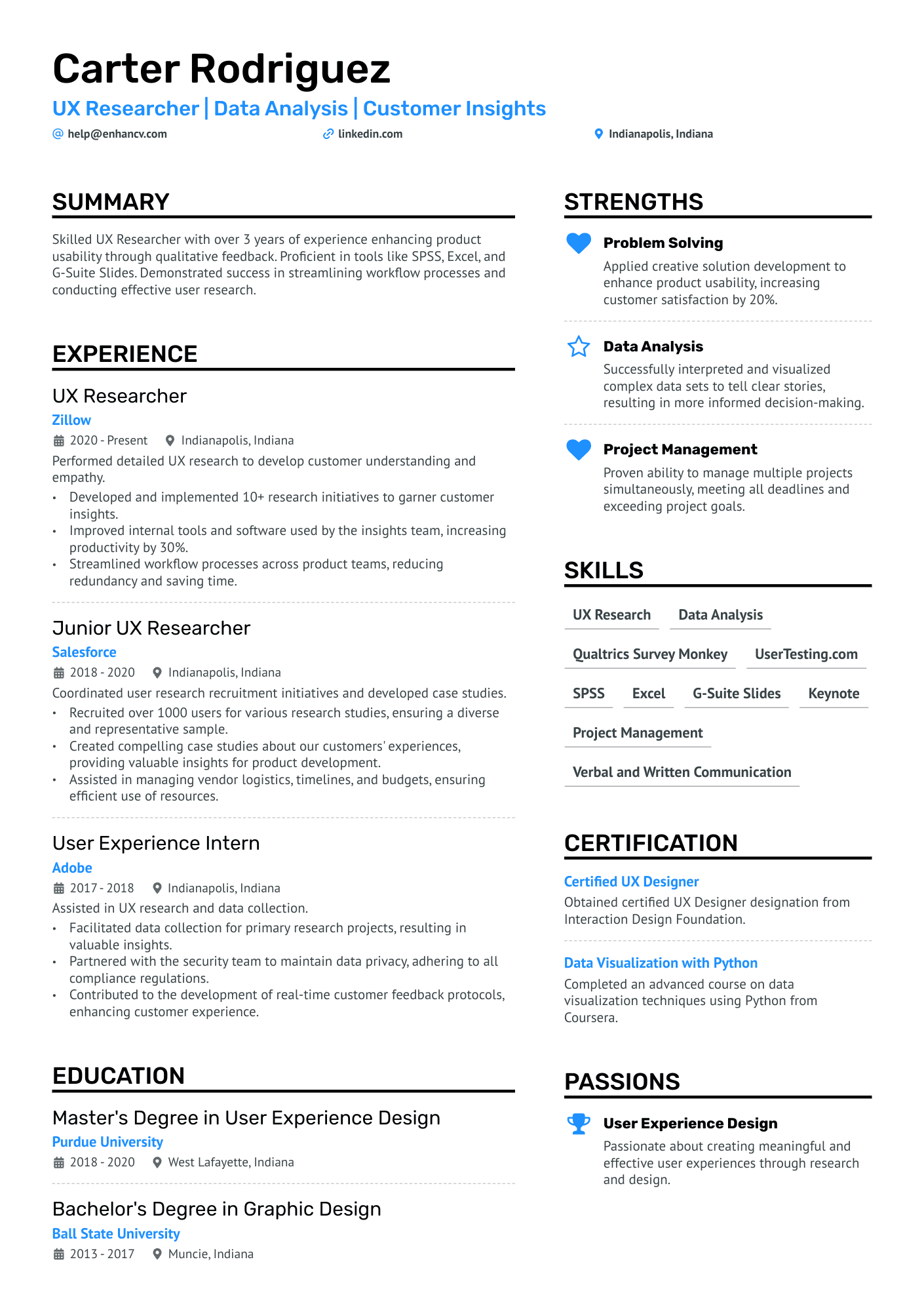
UX Researcher
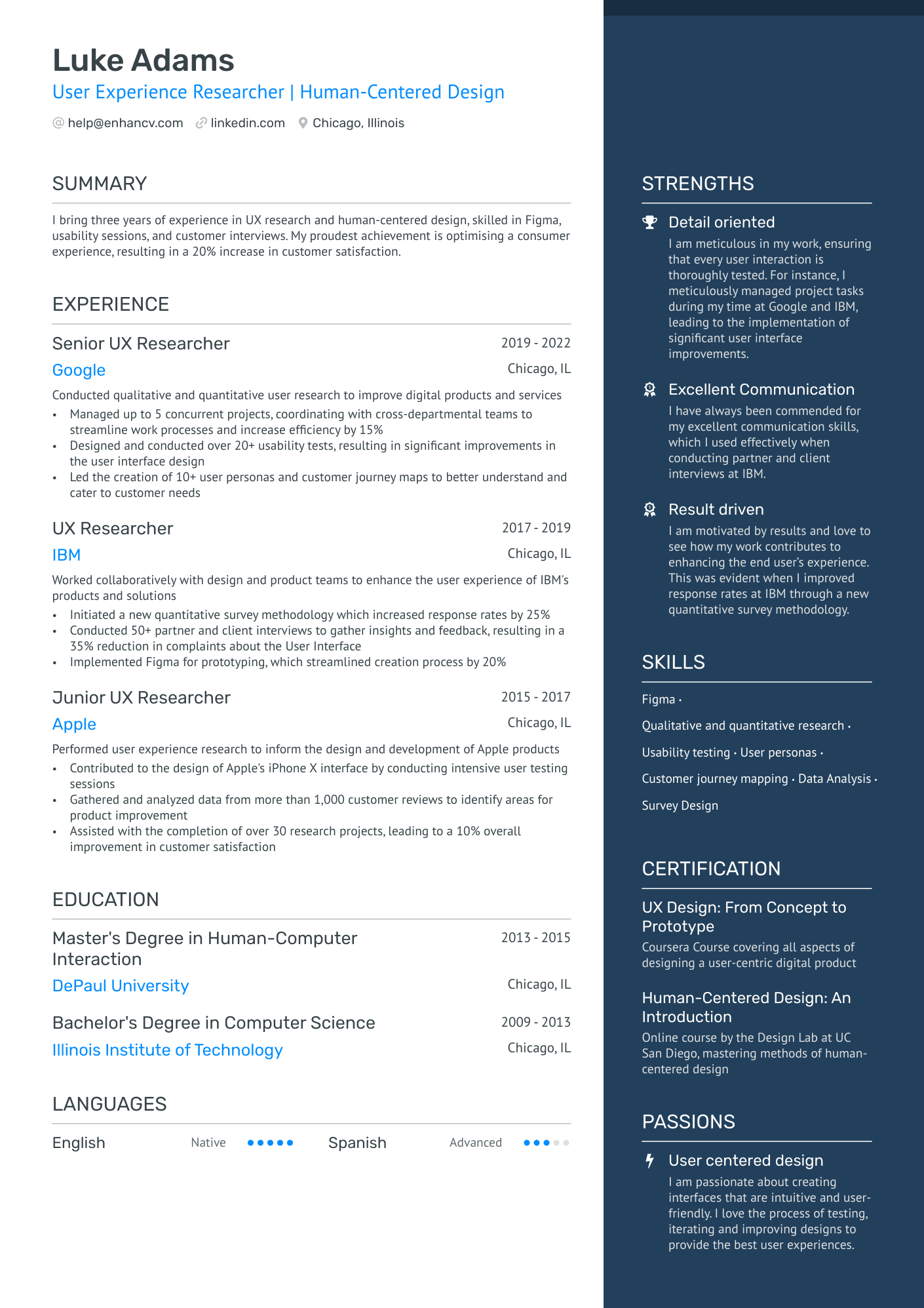
User Researcher
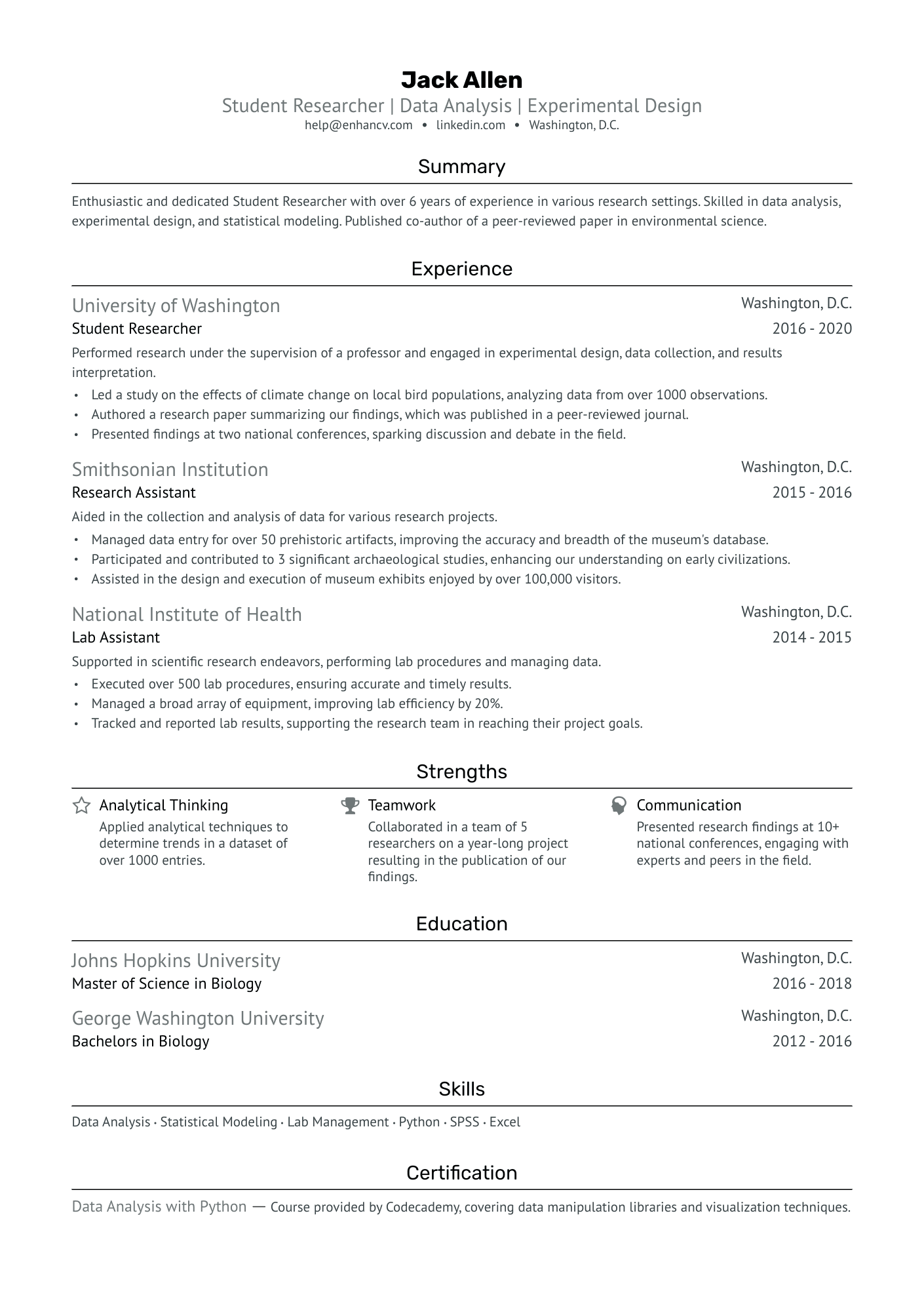
Student Researcher
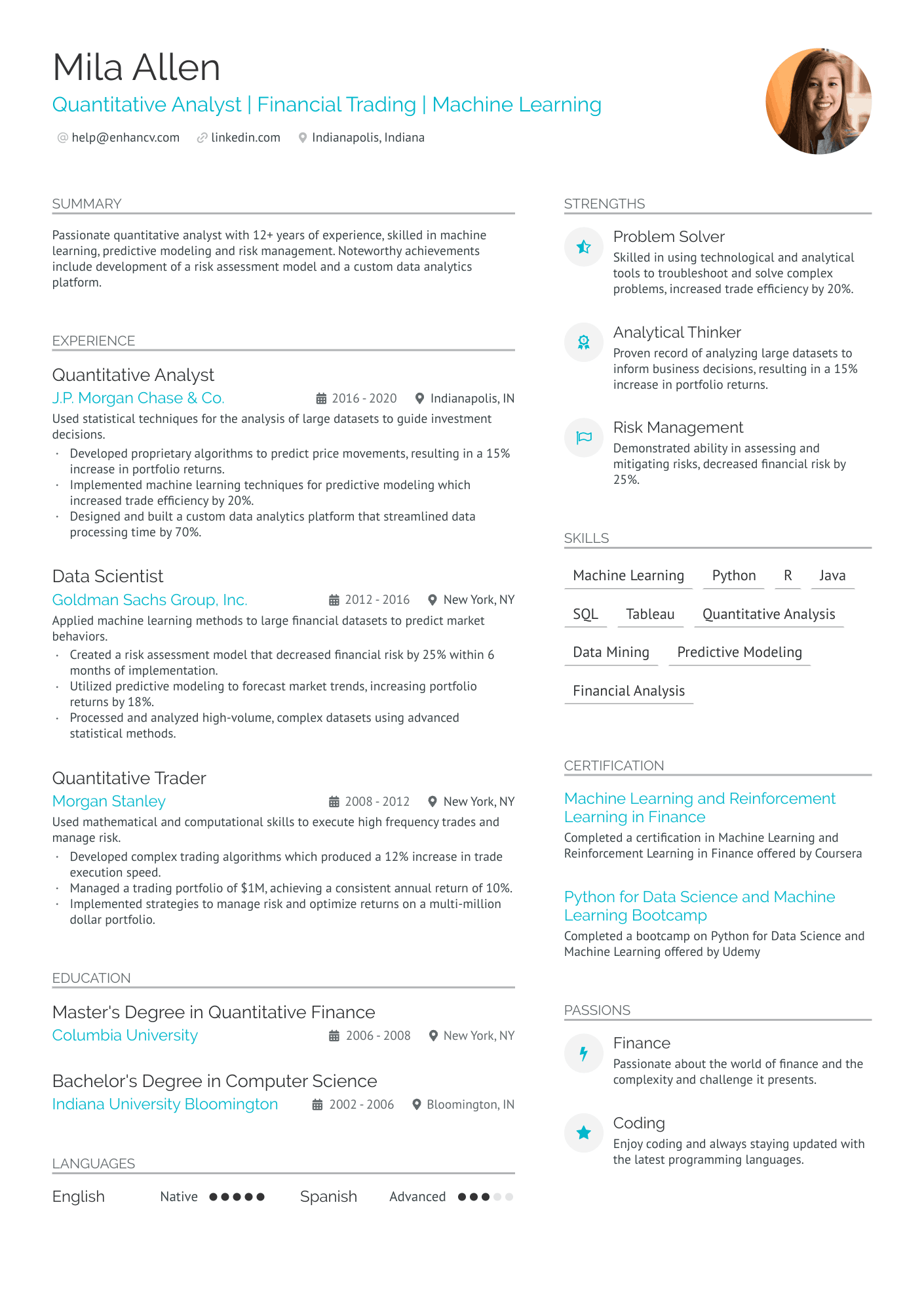
Quantitative Researcher
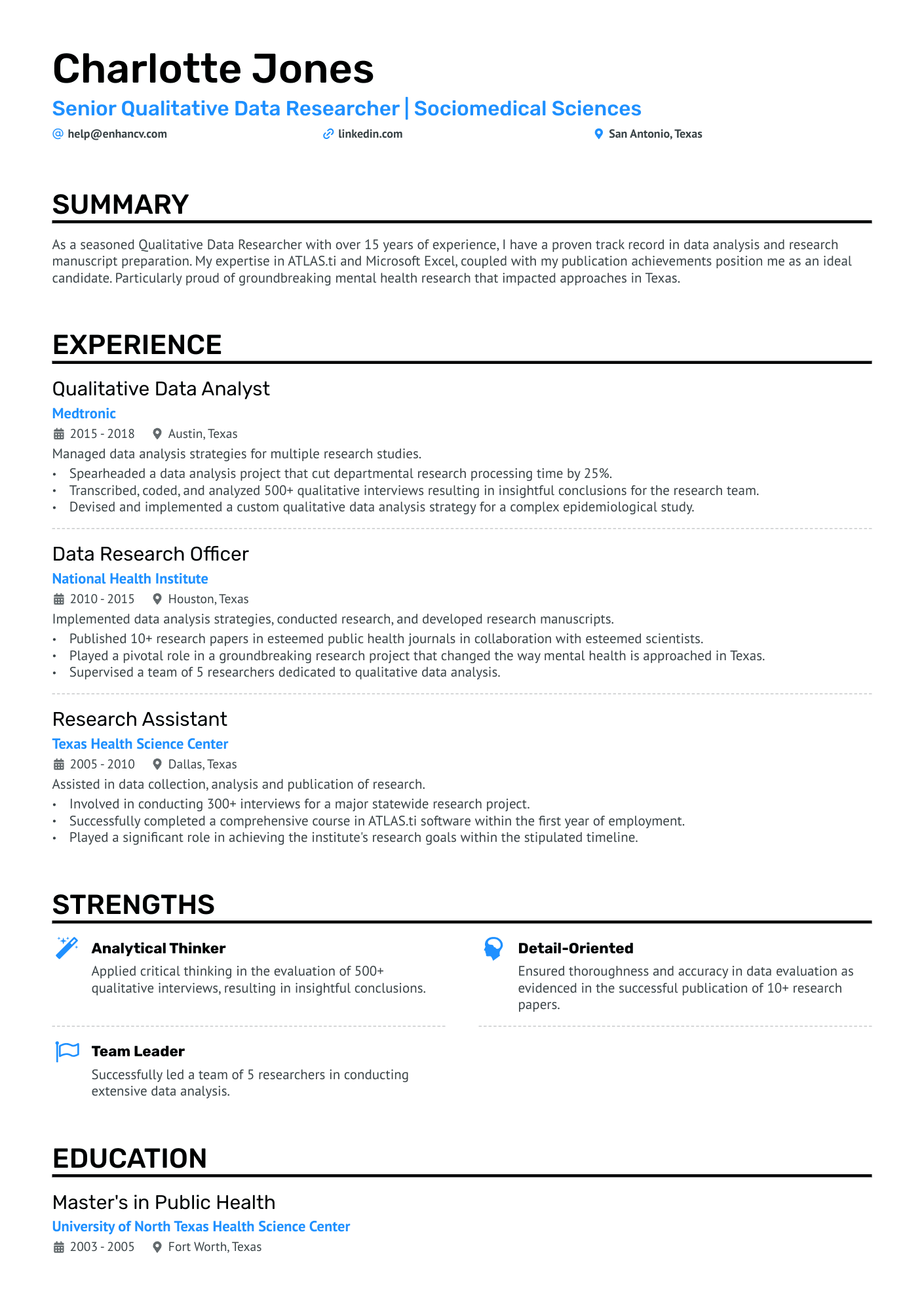
Qualitative Researcher
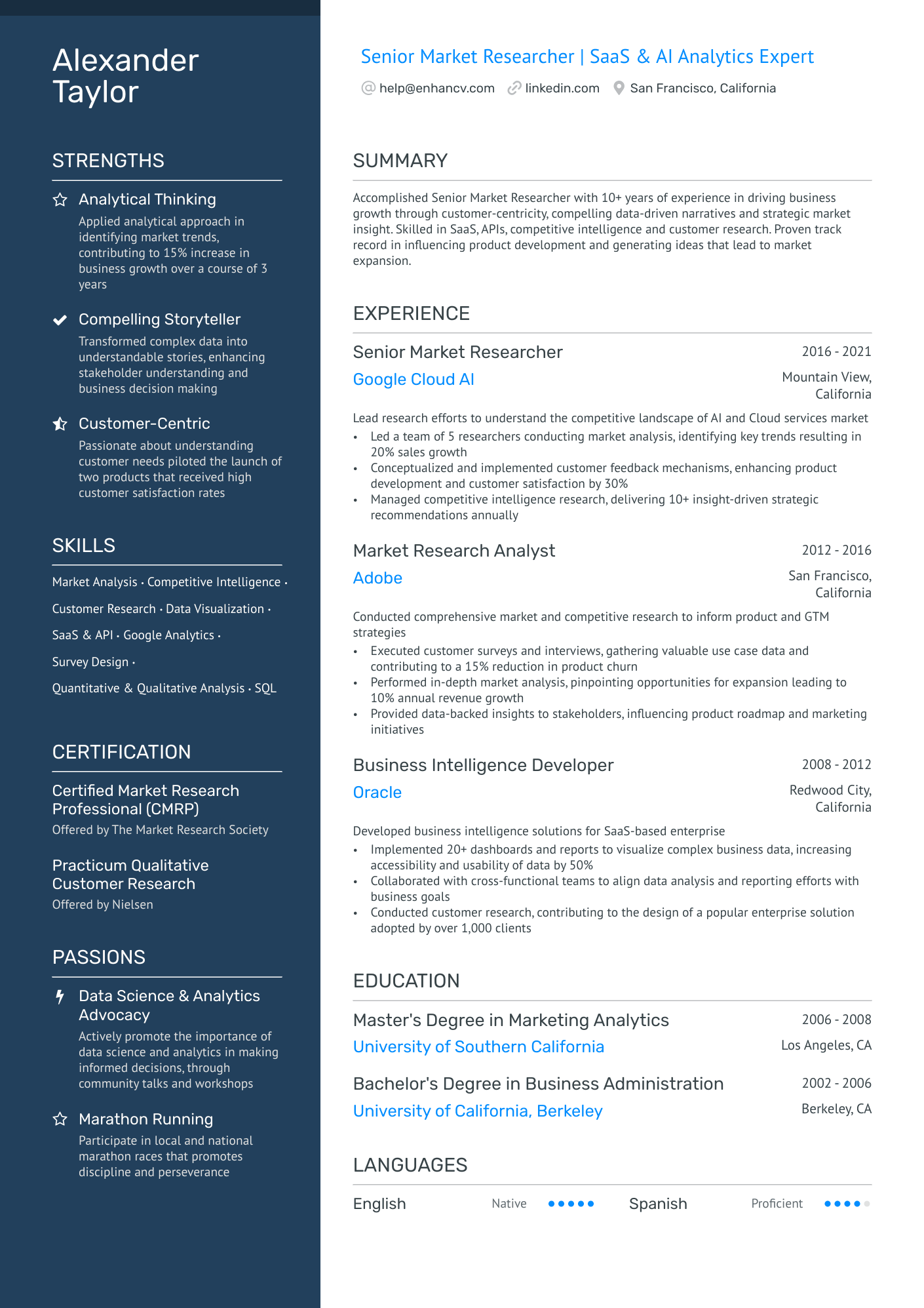
Market Researcher
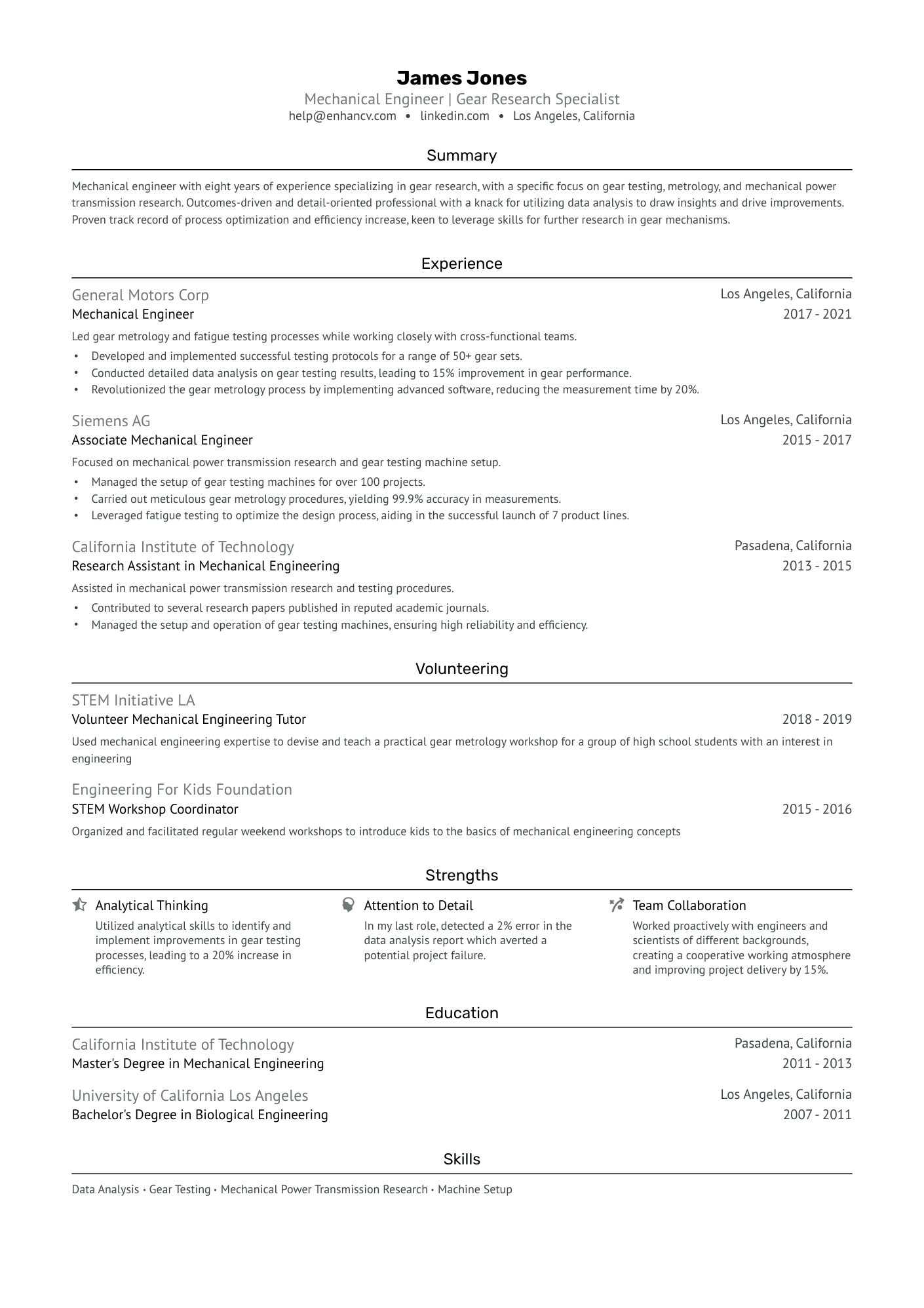
Undergraduate Researcher
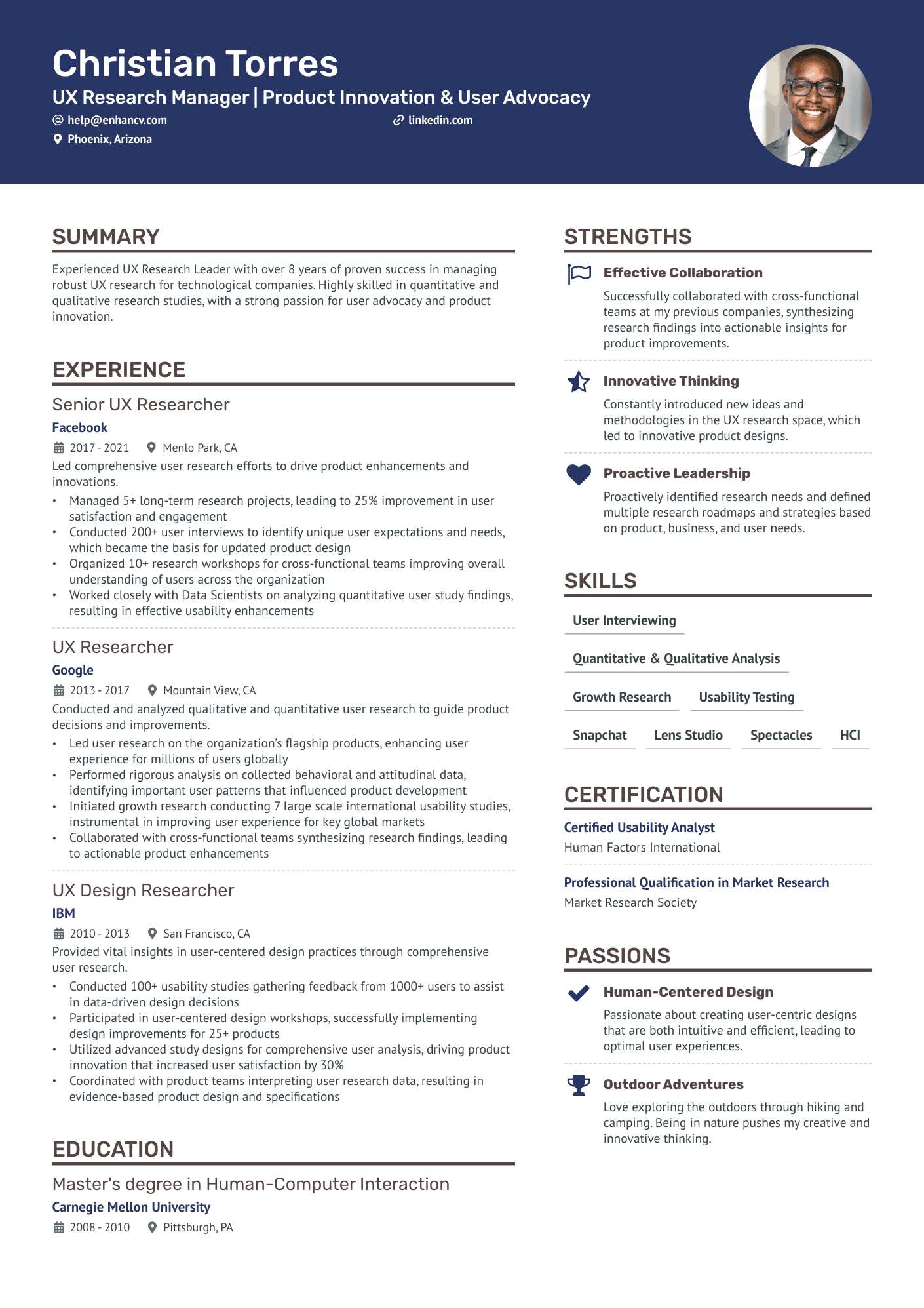
Product Researcher
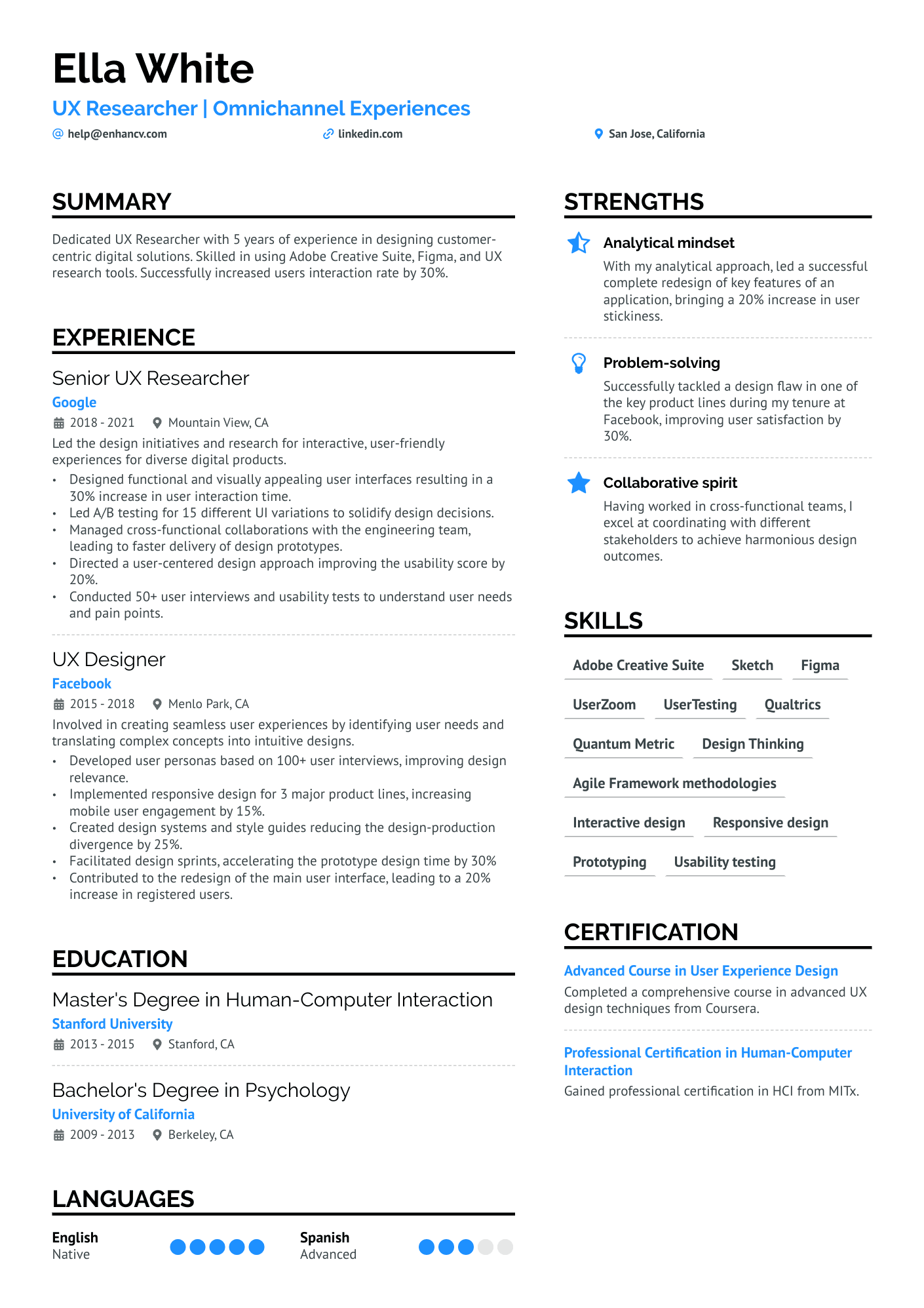
Psychology Researcher
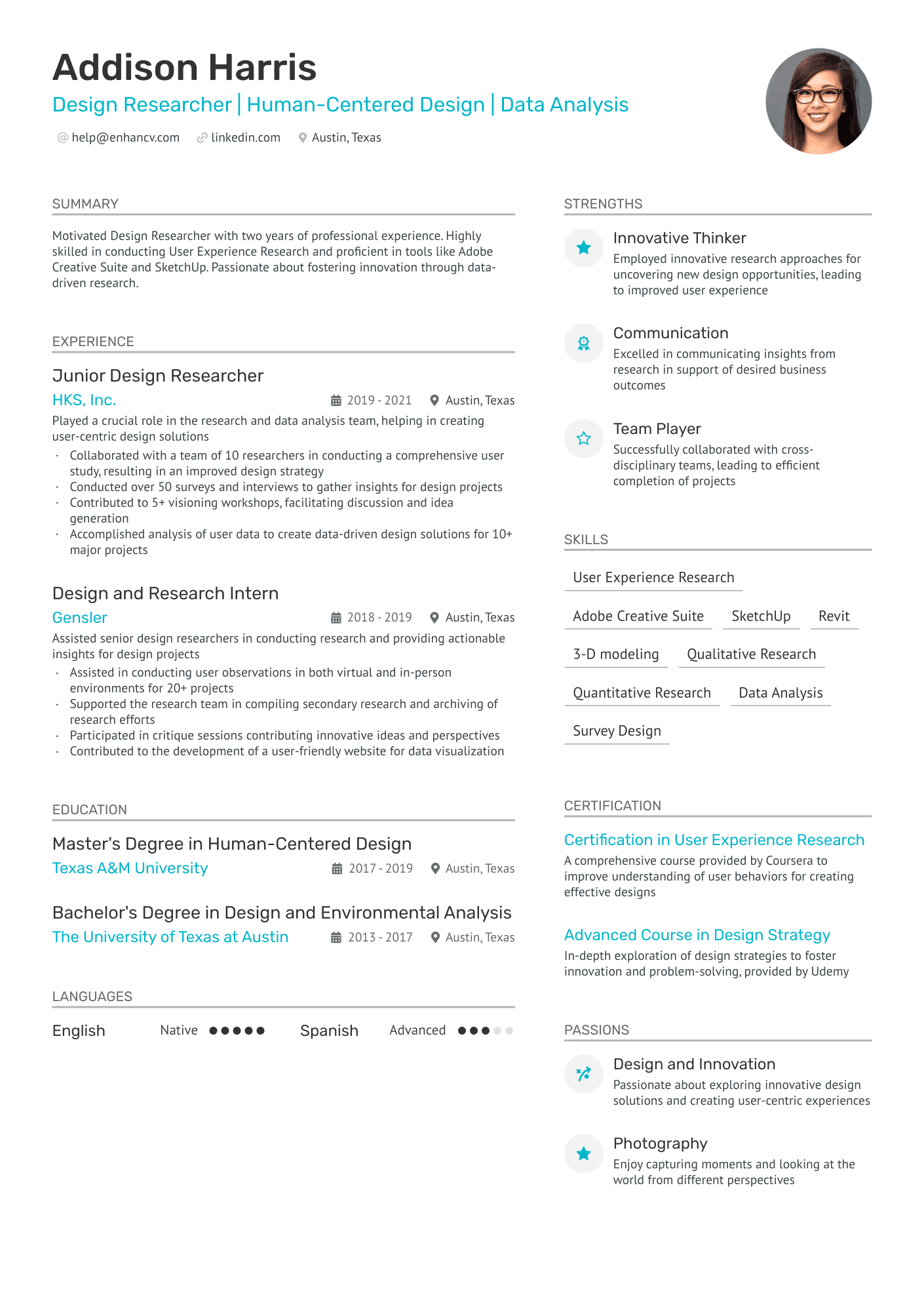
Design Researcher
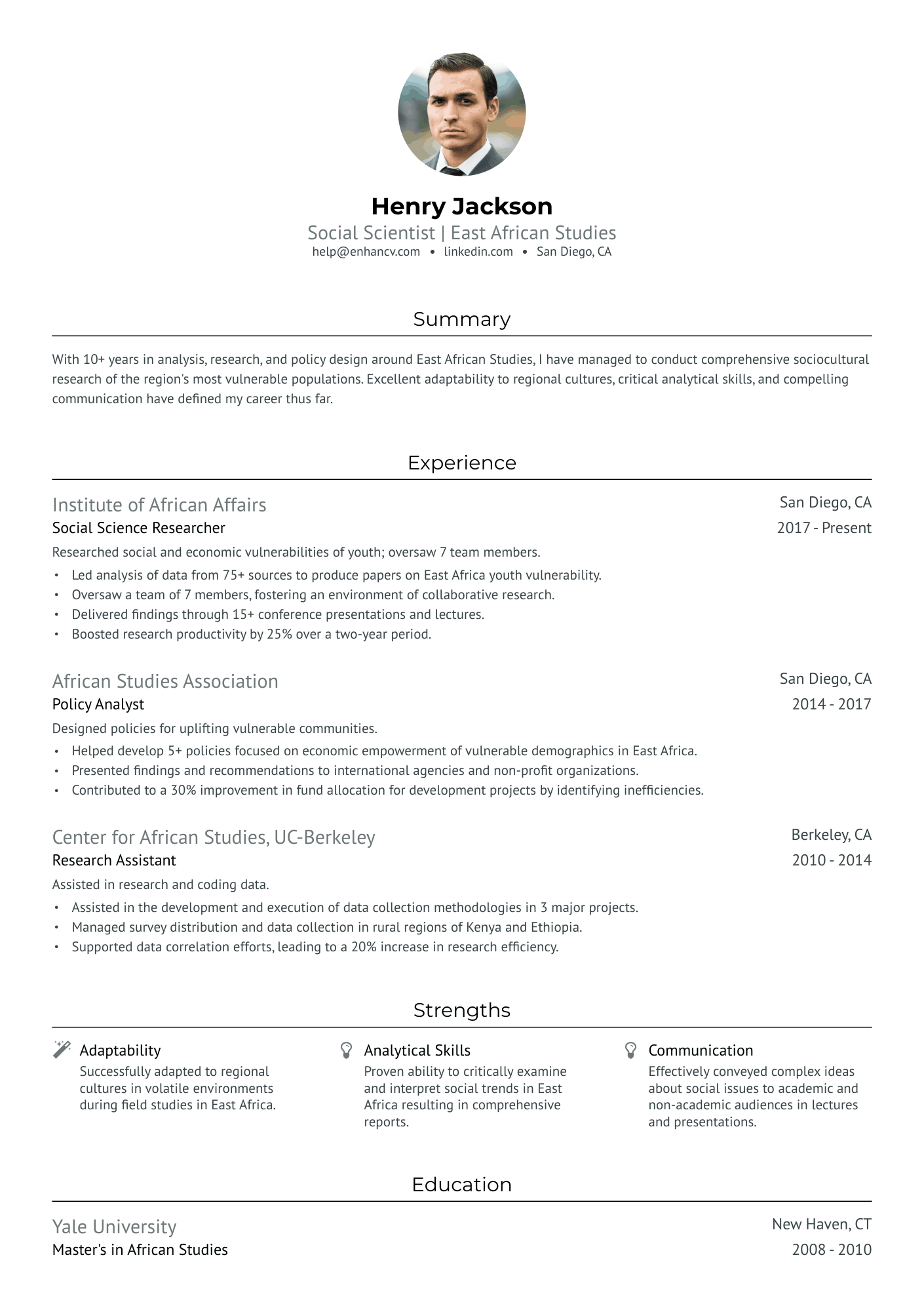
Lab Researcher
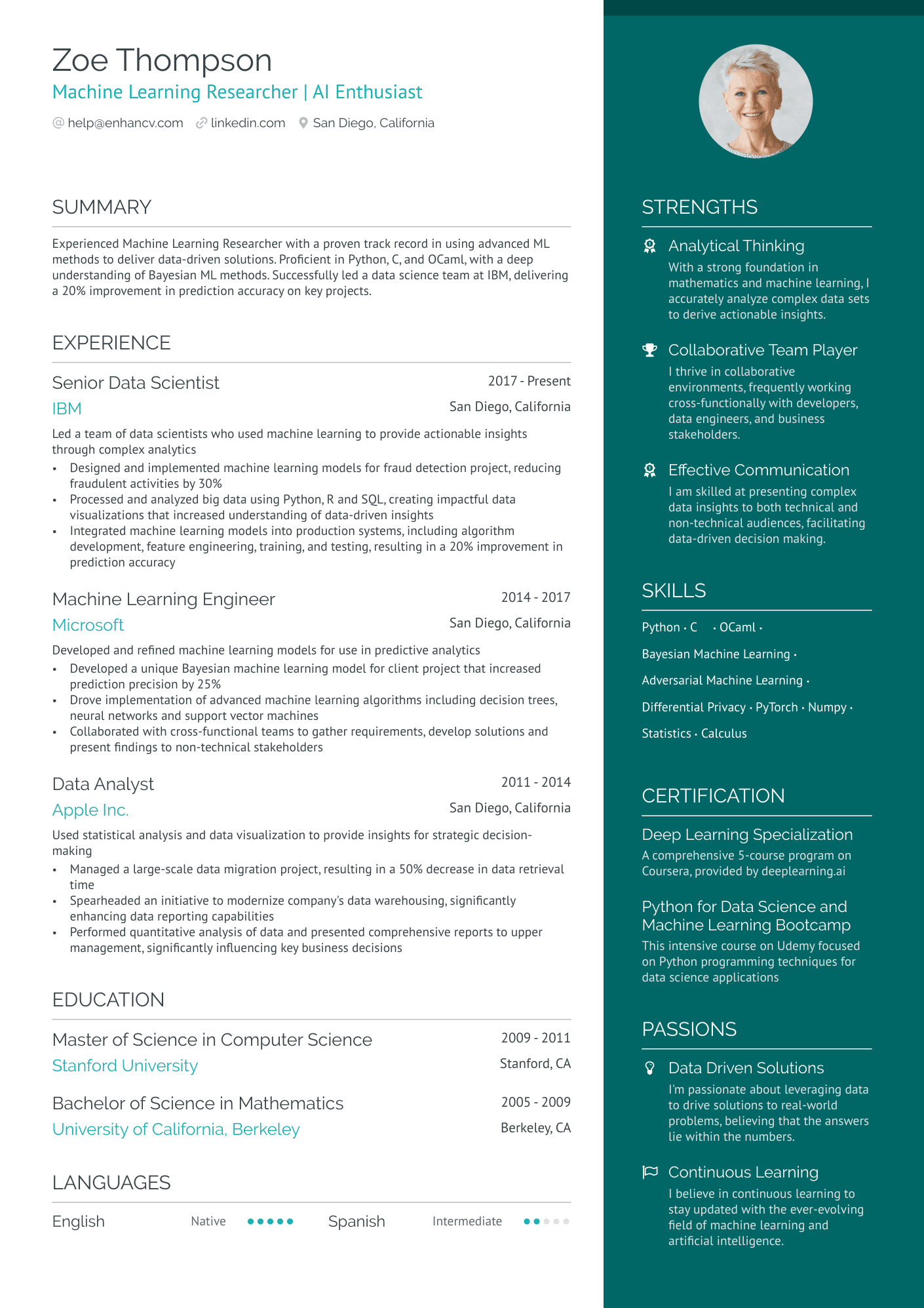
Machine Learning Researcher
Resume guide.
Resume Format Tips
Resume Experience
Skills on Resume
Education & Certifications
Resume Summary Tips
Additional Resume Sections
Key Takeaways

As a researcher, you may struggle with translating your extensive project experience into a concise format that appeals to a broad range of employers. Our guide will provide you with tailored strategies to effectively distill your research accomplishments into an impactful resume that resonates across industries.
- Utilize real-life examples to refine your researcher resume;
- Effectively write the experience section of your researcher resume, even if you have minimal or no professional experience;
- Incorporate the industry's top 10 essential skills throughout your resume;
- Include your education and certifications to highlight your specific expertise.
If the researcher resume isn't the right one for you, take a look at other related guides we have:
- Lab Manager Resume Example
- Lab Technician Resume Example
- Scientist Resume Example
- Chemist Resume Example
- Research Assistant Resume Example
- Lab Assistant Resume Example
- Research Director Resume Example
- Radiologic Technologist Resume Example
- Research Manager Resume Example
- Research Associate Resume Example
Simple guide to your researcher resume format and layout
- professional experience - use the reverse-chronological resume format;
- skills and achievements - via the functional skill-based resume format;
- both experience and skills - with a hybrid resume format .
What is more, keep in mind that your resume may be initially assessed by the ATS (Applicant Tracker System) (or the software used by companies in the hiring process). The researcher resumes that suit the ATS:
- have a header that includes either a role keyword or the job you're applying for;
- should be no longer than two pages;
- be submitted as PDF, unless specified otherwise.
Upload & Check Your Resume
Drop your resume here or choose a file . PDF & DOCX only. Max 2MB file size.
If you happen to have some basic certificates, don't invest too much of your researcher resume real estate in them. Instead, list them within the skills section or as part of your relevant experience. This way you'd ensure you meet all job requirements while dedicating your certificates to only the most in-demand certification across the industry.
The five (plus) definite sections your resume for a researcher job should include are:
- Header with your headline, contact details, and/or a preview of your work
- Summary (or objective) to pinpoint how your success aligns with the role
- Experience with bullets of your most relevant achievements in the field
- Skills to integrate vital job requirements (both technical and personal)
- Your further dedication to the field, showcased via relevant higher education and/or certifications
What recruiters want to see on your resume:
- Publishing Record: Evidence of publications in reputable journals or conferences relevant to the field.
- Research Experience: Detailed description of past research projects, roles, and contributions.
- Grant Writing Skills: Demonstrated success in securing research funding from grants, fellowships, or scholarships.
- Technical Expertise: Proficiency with tools and methodologies specific to the research area, like statistical analysis software, lab techniques, or data analysis programs.
- Collaboration and Communication: Examples of working effectively within interdisciplinary research teams and communicating complex research findings to diverse audiences.
Creating your researcher resume experience to catch recruiters' attention
Remember that for the researcher role, hiring managers are looking to see how your expertise aligns with their requirements. Here's where your resume experience section can help out. Make sure you:
- Include mainly roles that are relevant to the researcher job you're applying for;
- Don't go too far back in your experience - recruiters will only care what you did a decade ago if it's really important for the researcher role;
- Each bullet you include should say what you did, followed by the skills you used and the actual end result of your efforts;
- Quantify each of your achievements with numbers and possibly the overall effect it had on the organization;
- Highlight transferrable skills - or personal skills you've attained thanks to past jobs - that could be applicable within your potential workplace. This would showcase your unique value as a professional.
Formatting the experience section of your resume doesn't have to be an over-the-top deep dive into your whole career. Follow the researcher resume examples below to see how industry-leading professionals are presenting their experience:
- Designed and executed a comprehensive experimental study on the effects of new agricultural chemicals, increasing crop yields by 20% over a two-year period.
- Authored and co-authored 6 peer-reviewed journal articles in the field of synthetic biology, enhancing the company's academic presence and fostering collaborative opportunities.
- Mentored a team of junior researchers and interns, improving team productivity by 30% and helping to establish a robust research pipeline.
- Implemented new data collection protocols for patient trials, which improved data accuracy by 25% and ensured regulatory compliance.
- Coordinated with cross-functional teams to manage over 15 multi-center clinical trials, ensuring that deadlines were met and budgets were maintained.
- Presented findings at 3 international conferences, significantly raising the profile of the research programs and attracting future funding.
- Led the research and prototype development for a new medical device, which subsequently received FDA approval and led to a 150% increase in departmental revenue.
- Coordinated with a team of scientists to integrate artificial intelligence in the device's diagnostic process, improving prediction accuracy by 35%.
- Managed the intellectual property process for developed technologies, resulting in the granting of 5 patents and protecting the company's assets.
- Analyzed consumer behavior data and trends to inform the company's marketing strategies, contributing to a 40% increase in market share.
- Developed and administered over 200 surveys and focus groups to gather actionable customer insights, directly influencing product development.
- Worked directly with the sales team to refine target demographics, which led to more effective ad spend and a 25% increase in conversion rates.
- Directed a groundbreaking research initiative on renewable energy that secured $2M in grants from government and private sectors.
- Managed collaborations with industry partners to test and refine prototype solar panels, achieving a 50% increase in efficiency over existing models.
- Organized and chaired a successful international symposium on sustainable energy, fostering partnerships that led to further R&D investments.
- Led the development of a novel gene-editing platform, which resulted in a 200% increase in experiment throughput and reduced costs by 40%.
- Collaborated with pharmaceutical companies to leverage the platform for drug development, accelerating the timeline from discovery to preclinical trials.
- Managed the submission of regulatory documents for new research protocols, ensuring full compliance with all federal and state regulations.
- Processed and analyzed big data sets using advanced analytics tools, uncovering patterns that led to a 20% improvement in operational efficiency.
- Developed custom scripts and algorithms to automate data collection processes, saving the company an average of 250 man-hours per month.
- Designed an interactive dashboard that provided real-time insights into market trends, which became a key decision-making tool for the executive team.
- Monitored patient enrollment and data integrity for over 10 international clinical trials, ensuring adherence to study protocols and Good Clinical Practice guidelines.
- Provided key contributions to the successful launch of a Phase III trial, which saw a 95% retention rate of study participants due to enhanced engagement strategies.
- Developed training materials and conducted workshops for new clinical research coordinators, greatly improving the effectiveness and compliance of the research team.
Quantifying impact on your resume
- Include the number of publications you've authored to demonstrate the depth and breadth of your research experience.
- List the amount of research funds you've secured, as it shows your capability to attract significant financial resources for your work.
- State the number of experiments or studies you've conducted to quantify your hands-on experience in your field.
- Mention the number of citations your work has received to reflect its influence and acceptance in the research community.
- Highlight the size of the research teams you've led or participated in to show your collaborative and leadership skills.
- Detail the number of conferences you've presented at to exhibit your ability to communicate your findings to a professional audience.
- Provide the percentage by which your findings have improved a process or technique within your field to illustrate the practical impact of your research.
- Specify the number of patents you hold, if applicable, to demonstrate innovation and potential for commercial application of your work.
Action verbs for your researcher resume

Four quick steps for candidates with no resume experience
Those with less or no relevant experience could also make a good impression on recruiters by:
- Taking the time to actually understand what matters most to the role and featuring this within key sections of their resume
- Investing resume space into defining what makes them a valuable candidate with transferrable skills and personality
- Using the resume objective to showcase their personal vision for growth within the company
- Heavily featuring their technical alignment with relevant certifications, education, and skills.
Remember that your resume is about aligning your profile to that of the ideal candidate.
The more prominently you can demonstrate how you answer job requirements, the more likely you'd be called in for an interview.
Recommended reads:
- How To Include Your Relevant Coursework On A Resume
- How to List Continuing Education on Your Resume
The more trusted the organization you've attained your certificate (or degree) from, the more credible your skill set would be.
Balancing hard and soft skills in your researcher resume
Recruiters indeed pay close attention to the specific hard and soft skills candidates possess. Hard skills refer to technical abilities or your proficiency in technologies, while soft skills are the personal attributes and qualities developed over your lifetime.
If you're unsure about effectively quantifying these skills on your resume, follow our step-by-step guide. It's crucial to first understand the key job requirements for the role. Doing so enables you to accurately list your:
- Hard skills in sections like skills, education, and certifications. Your technical expertise is straightforward to quantify. Most organizations find it sufficient to mention the certificates you've earned, along with your proficiency level.
- Soft skills within your experience, achievements, strengths, etc. Defining interpersonal communication traits in your resume can be challenging. Focus on showcasing the accomplishments you've achieved through these skills.
Remember, when tailoring your researcher resume, ensure that the skills you list match exactly with those in the job requirements. For instance, if the job listing specifies "Microsoft Word," include this exact term rather than just "Word" or "MSO."
Top skills for your researcher resume:
Data Analysis
Statistical Analysis
Qualitative Research
Quantitative Research
Research Design
Literature Review
Data Collection
Data Interpretation
Academic Writing
Scientific Publication
Critical Thinking
Problem Solving
Attention to Detail
Time Management
Communication
Adaptability
Project Management
Ethical Judgment
List your educational qualifications and certifications in reverse chronological order.
The importance of your certifications and education on your researcher resume
Pay attention to the resume education section . It can offer clues about your skills and experiences that align with the job.
- List only tertiary education details, including the institution and dates.
- Mention your expected graduation date if you're currently studying.
- Exclude degrees unrelated to the job or field.
- Describe your education if it allows you to highlight your achievements further.
Your professional qualifications: certificates and education play a crucial role in your researcher application. They showcase your dedication to gaining the best expertise and know-how in the field. Include any diplomas and certificates that are:
- Listed within the job requirements or could make your application stand out
- Niche to your industry and require plenty of effort to obtain
- Helping you prepare for professional growth with forward-facing know-how
- Relevant to the researcher job - make sure to include the name of the certificate, institution you've obtained it at, and dates
Both your certificates and education section need to add further value to your application. That's why we've dedicated this next list just for you - check out some of the most popular researcher certificates to include on your resume:
The top 5 certifications for your researcher resume:
- Project Management Professional (PMP) - Project Management Institute
- Certified Research Administrator (CRA) - Research Administrators Certification Council
- Institutional Review Board Professional (CIP) - Public Responsibility in Medicine and Research
- Certified Clinical Research Professional (CCRP) - Society of Clinical Research Associates
- Data Analysis & Statistics Certificate (DASC) - Various Institutions
Highlight any significant extracurricular activities that demonstrate valuable skills or leadership.
- When Should You Include Your High School on Your Resume?
- How To List Certifications On A Resume (Examples Included)
Researcher resume summary or objective? The best choice is based on your experience
If you're wondering about the relevancy of the resume summary or the resume objective to your Researcher application - here's the truth.
The summary and objective provide recruiters with your expertise and accomplishments at a glance, within an up-to-five-sentence structure.
The difference is that the:
- Resume objective is also more focused on emphasizing your career goals. The objective is the perfect fit for (potentially more junior) candidates who'd like to balance their relevant experience with their career goals.
- Resume summary can provide you with space to also detail the unique value of what it's like to work with you. Researcher candidates who have many noteworthy accomplishments start from the get-go with their summary.
Ensure that either type of resume introduction presents your Researcher expertise in the best light and aligns it with the job advert.
The more details you can provide with numbers, the more compelling your resume summary or objective will be.
Real-world Researcher candidates follow these frameworks in writing their resume summaries and objectives.
The end results are usually as such:
Resume summaries for a researcher job
- With a decade of profound experience in molecular biology, an extensive publication record, and a Ph.D. from MIT, the candidate is adept in genomics, proteomics, and bioinformatics. Awarded with the Young Scientist Award, they have led teams in groundbreaking cancer research, yielding patents and significant advancements in targeted therapy.
- A seasoned chemist with 15 years at GlaxoSmithKline specializing in pharmaceutical development, pivoting into biotechnology research with a strong desire to apply synthetic chemistry skills towards developing novel biologics. Recognized for innovation in small molecule synthesis, keen to contribute to interdisciplinary approaches in disease treatment.
- Former aerospace engineer with 12 years' tenure at NASA seeking to transition into climate research. Armed with robust analytical skills, a deep understanding of complex systems, and a master’s degree in environmental engineering, aiming to utilize simulation modeling to address pressing environmental challenges and climate change.
- After years of developing market forecasts and data models for economic research at a leading think tank, the candidate is eager to transfer their refined quantitative analysis skills into computational neuroscience research. With a strong grasp of machine learning and predictive analytics, they are ready to contribute to elucidating neural network functionalities.
- Graduating magna cum laude with a B.S. in biology, the applicant is enthusiastic about beginning a research career in immunology. Committed to lifelong learning and making impactful contributions, they are determined to leverage their strong foundation in cell biology and genetics to aid in developing innovative immunotherapies.
- As an ambitious recent graduate with a Master's in Computer Science and a passion for algorithm design, I am eager to delve into the world of bioinformatics research. With a zest for problem-solving and a commitment to advancing healthcare through technology, I aim to contribute to projects focused on genetic data analysis and personalized medicine.
Showcasing your personality with these four researcher resume sections
Enhance your researcher expertise with additional resume sections that spotlight both your professional skills and personal traits. Choose options that not only present you in a professional light but also reveal why colleagues enjoy working with you:
- My time - a pie chart infographic detailing your daily personal and professional priorities, showcasing a blend of hard and soft skills;
- Hobbies and interests - share your engagement in sports, fandoms, or other interests, whether in your local community or during personal time;
- Quotes - what motivates and inspires you as a professional;
- Books - indicating your reading and comprehension skills, a definite plus for employers, particularly when your reading interests align with your professional field.
Key takeaways
At the end of our guide, we'd like to remind you to:
- Invest in a simple, modern resume design that is ATS friendly and keeps your experience organized and legible;
- Avoid just listing your responsibilities in your experience section, but rather focus on quantifiable achievements;
- Always select resume sections that are relevant to the role and can answer job requirements. Sometimes your volunteering experience could bring more value than irrelevant work experience;
- Balance your technical background with your personality traits across various sections of your resume to hint at how much time employers would have to invest in training you and if your profile would be a good cultural fit to the organization;
- Include your academic background (in the form of your relevant higher education degrees and certifications) to show recruiters that you have the technical basics of the industry covered.
Researcher resume examples
Explore additional researcher resume samples and guides and see what works for your level of experience or role.

Looking to build your own Researcher resume?
- Resume Examples
Destinee, an ambitious techie that never settles
How to use resume lines in your resume, what should i put in the about me section on my resume, 15 tips to create an eye-catching resume that gets you the job (including templates), signs you hate your current job and how to find a new one, imposter syndrome at work: 4 strategies to battle it out.
- Create Resume
- Terms of Service
- Privacy Policy
- Cookie Preferences
- Resume Templates
- AI Resume Builder
- Resume Summary Generator
- Resume Formats
- Resume Checker
- Resume Skills
- How to Write a Resume
- Modern Resume Templates
- Simple Resume Templates
- Cover Letter Builder
- Cover Letter Examples
- Cover Letter Templates
- Cover Letter Formats
- How to Write a Cover Letter
- Resume Guides
- Cover Letter Guides
- Job Interview Guides
- Job Interview Questions
- Career Resources
- Meet our customers
- Career resources
- English (UK)
- French (FR)
- German (DE)
- Spanish (ES)
- Swedish (SE)
© 2024 . All rights reserved.
Made with love by people who care.
- Career Blog
Researcher Resume Examples & Templates for 2024

When it comes to landing a job in the field of research, having a well-crafted resume can be the key to standing out in a competitive job market. A researcher resume is a document that summarizes your professional experience, education, skills, and other relevant information for a potential employer.
An impressive researcher resume can make all the difference in securing an interview and ultimately, landing the job. A strong resume showcases your strengths and highlights your achievements in past roles, making you an attractive candidate to potential employers.
The objective of this article is to provide examples and templates for creating a standout researcher resume. By following the tips and advice provided in this article, job seekers in the field of research can create a strong and effective resume that will impress potential employers. The article will cover everything from formatting and structure to key skills to include and common mistakes to avoid. Whether you’re a recent graduate or an experienced researcher, this article will provide the information you need to create a winning resume.
Researcher Resume Basics
When it comes to applying for a research position, your resume serves as a tool to showcase your skills, experience, and achievements. Therefore, you need to make sure your resume contains certain essential components, adheres to specific formatting guidelines, and highlights the relevant keywords and phrases.
Essential Components of a Researcher Resume
Your resume should provide a clear and concise overview of your professional profile. Therefore, it should contain the following essential components:
Contact Information: Include your full name, email address, and phone number. It is also recommended to add your LinkedIn or personal website URL.

Professional Summary: This section should highlight your most relevant skills, experience, and achievements. Keep it brief and to the point, but make sure to emphasize your unique selling point.
Education and Certifications: List all of your academic degrees, including the institution name, graduation date, and relevant coursework. Also, add any relevant certificates or licenses you have acquired.
Work Experience: This section should detail your professional experience and accomplishments. List your work history in reverse chronological order and use bullet points to highlight your achievements.
Skills: Specify your relevant technical and soft skills, including languages, software, and research methodologies.
Formatting Guidelines
In addition to the essential components, it is important to follow specific formatting guidelines to make your resume stand out. Here are some tips:
Use a clear and legible font, such as Calibri or Arial, with a font size of 11-12 pt.
Use bullet points and short sentences to increase readability.
Make sure your resume fits on one or two pages.
Use task-oriented language and focus on measurable achievements.
Include white space to create a visually appealing layout.
Keywords and Phrases for a Researcher Resume
Using relevant keywords and phrases in your resume is essential for attracting the attention of recruiters and hiring managers. Here are some common ones:
Research methodologies: Mention the specific methodologies you have experience in, such as quantitative and qualitative research, data analysis, and statistical modeling.

Technical skills: Emphasize your proficiency in tools commonly used in research, such as SPSS, R, Stata, and Excel.
Soft skills: Highlight your communication, collaboration, and problem-solving skills, which are essential for working in a research team.
Publications and presentations: Mention any research papers, articles, or presentations you have contributed to, as this indicates your expertise in specific areas.
By following these guidelines, you can create a powerful researcher resume that showcases your abilities and gets you noticed by prospective employers.
Researcher Resume Examples and Templates
General researcher resume samples.
For those starting out in their research careers or those looking to transition into research from another field, a general researcher resume template can be a great starting point. This type of resume should focus on highlighting transferable skills such as critical thinking, attention to detail, and excellent communication abilities, as well as any prior experience in research-related activities or projects.
General researcher resume samples should also feature a strong summary statement that emphasizes the individual’s passion and commitment to research, as well as any specific career objectives or goals. It is also important to highlight any relevant training or certifications that the candidate has received, including research methodology courses, data analysis tools, or project management training.
Early Career Researcher Resume Examples
For early career researchers, developing a well-crafted resume that highlights relevant experience and educational credentials is key. Early career researcher resume examples should reflect an emphasis on academic achievements such as dissertations, published research papers, and academic awards. Additionally, individuals with limited work experience in research-related positions may wish to focus on volunteer work or internships that demonstrate their commitment to research and their ability to effectively contribute to research projects.
In order to stand out in a competitive job market, early career researchers should also highlight any transferable skills that could be applicable to research roles, such as data analysis, project management, or communication skills. And building a strong professional network through conferences and other academic events can also help individuals in their job search efforts.
Experienced Researcher Resume Examples
For experienced researchers with a track record of success in their field, maximizing the impact of their resume is crucial. Experienced researcher resume examples should highlight their accomplishments in research, including publications, patents, and successful grant applications. They should also focus on showcasing specialized skills and knowledge in their areas of expertise, such as experience with specific research methods or advanced data analysis techniques.
When it comes to the presentation of their resume, experienced researchers can experiment with a more creative approach that sets them apart from the competition. For instance, they may wish to include a portfolio of their work or highlight their leadership experience in research teams. Ultimately, an experienced researcher’s resume should clearly communicate their depth of knowledge and expertise in their field.
Academic Researcher Resume Examples
Academic researchers require a highly specialized resume that speaks to their unique educational and professional backgrounds. Academic researcher resume examples should highlight educational degrees, including any doctoral or postdoctoral work, as well as academic honors and awards. They should also emphasize academic publications, presentations, and other scholarly contributions to the field.
Academic researchers may also wish to highlight their teaching experience, any service they’ve provided to their academic department or larger community, and any unique research projects they may have led or participated in. In contrast to other types of researchers, academics may find success in using a CV rather than a traditional resume format, given their extensive and diverse academic backgrounds.
Creating a Researcher Resume
A strong resume is essential for landing a researcher position. When creating your researcher resume, you should think carefully about how you present your skills, experience, and achievements. This section will explore best practices for creating a researcher resume, including assessing your skills and experience, writing a professional summary, designing a concise and relevant work history, showcasing achievements and awards, and highlighting education and training.
Assessing Skills and Experiences
Before you start writing your resume, it’s important to assess your skills and experiences relevant to the researcher position you’re applying for. Identify the key skills and experiences required for the role, then match those with your personal qualifications. Be sure to highlight your research experience, subject matter expertise, and analytical skills. Make a list of your hard and soft skills and use them to create a customized resume for each job you apply to.
Tips for Writing a Strong Professional Summary
Your professional summary is the first section of your resume and sets the tone for the rest of the document. It should be a concise statement that highlights your experience and qualifications for the position. Focus on what you can contribute to the organization – such as research experience, data analysis skills, or the ability to communicate complex ideas – to show your value. Be sure to tailor your summary to the specific job requirement, rather than using a generic statement for all applications.
Designing a Concise and Relevant Work History
Your work history should demonstrate your research expertise and accomplishments. Use bullet points to highlight your key responsibilities, achievements, and any relevant projects you’ve worked on. Make sure to use action verbs and include quantitative data wherever possible to showcase the impact of your work. If you’ve had multiple positions, only include those that are relevant to the job you’re applying for. Keep your work history concise, specifically highlighting the experience that reflects why you’re a candidate for the role.
Showcasing Achievements and Awards
When listing your achievements and awards, make sure they are relevant to the researcher position. These can include any publications, conference presentations, or research projects that demonstrate your skills and expertise to your team successfully. If possible, quantify your achievements to show the impact of your research. Aim for achievements and awards from the past two years to keep things up to date and make an impact.
Highlighting Education and Training
In the education and training section of your resume, make sure to include your degrees and certifications that are relevant to the researcher job. You can also include any relevant training courses or workshops you’ve attended to learn new research methods or techniques. If you have a significant amount of experience or a degree in a relevant field, your education section will likely be less extensive but still relevant to show the baseline understanding of the field.
When designing your researcher resume, make sure to tailor it to the specific job you’re applying for.
Customizing the Researcher Resume
Customizing your researcher resume can be the key to land your dream job in your field of expertise. Employers are always looking for individuals who match their job description and have the skills required for the job. As a researcher, you must demonstrate that you can do just that.
Here are some tips to keep in mind when customizing your researcher resume:
Tailoring to the Job Description
Tailoring your resume to the job description is a great way to show the employer that you have what they are looking for. A job description lists the necessary skills, qualifications, and experience required for the role. You should review the position’s job description thoroughly and tailor your resume to highlight the qualities that the employer is looking for. Use relevant keywords throughout your resume, so that your experience aligns with the job description.
Highlighting Transferable Skills
Transferable skills are the ones that you use in one industry, but that can be applied to another. Highlighting these skills gives you an advantage over other candidates when you are looking to transition to another industry. Communication, analytical reasoning, and problem solving are just a few examples of transferable skills that researchers possess.
Addressing Employment Gaps
Employment gaps can be stigmatized as lack of commitment, poor work ethic, or lack of experience. Employers recognize that researchers often work on specific projects, and as a result, they might have gaps between jobs. Be honest about gaps in your employment and explain them as briefly and truthfully as possible. You can use transferable skills such as volunteering, freelancing, or acquiring additional certifications to fill in any gaps.
Emphasizing Relevant Experience
Emphasis relevant experience on your resume within your field of expertise. This experience should include any research, publication, and presentations you have conducted or participated. If you are applying for a position in a specific industry, emphasize the relevant work experience you have in that industry.
Using Action Words and Phrases
Action-oriented language can make a difference to grab the employer’s attention. Keep your sentences short and begin with strong action verbs, such as “Directed,” “Conducted,” or “Developed.” Use power words like “Managed,” “Created,” “Improved,” or “Instituted,” whenever possible.
When customizing your researcher resume, remember that making your resume stand out can make a difference. Tailoring your resume to the position, emphasizing your transferable skills, addressing any employment gaps, and providing an emphasis on relevant experience using action words and phrases will make for a winning researcher’s resume.
Cover Letter for a Researcher Resume
When it comes to applying for a research position, a cover letter can be just as important as a strong resume. A cover letter is an opportunity to introduce yourself, highlight your key qualifications, and showcase your enthusiasm for the position.
Purpose and Importance of a Cover Letter for Researcher Position
The purpose of a researcher cover letter is to convince the employer that you are the best candidate for the job. It is your chance to showcase your personality, research experience, communication skills, and other relevant qualifications that might not be evident in your resume.
A well-written cover letter can make you stand out from the competition and increase your chances of being invited for an interview. It demonstrates your interest, professionalism, and attention to detail, making a positive first impression on potential employers.
Components of a Researcher Cover Letter
A researcher cover letter should be concise, informative, and tailored to the specific job you are applying for. It should include the following components:
Header: Start with your name, address, phone number, and email address.
Salutation: Address the letter to the hiring manager or the person who is responsible for the hiring decision.
Introduction: In the opening paragraph, introduce yourself and explain why you are writing this letter. This is a good place to mention the job title you are applying for and where you heard about the position.
Body Paragraphs: In the next few paragraphs, highlight your relevant qualifications and skills that make you an ideal candidate for the position. You can provide specific examples of your research experience, publications, software skills, or any other relevant qualifications that showcase your potential value to the employer.
Closing Paragraph: End your letter by thanking the employer for considering your application, and express your interest in the position. You can also mention that you look forward to hearing from them soon and provide your contact information one more time.
Closing Salutation: Sign off your letter with a professional closing such as “Sincerely” or “Best regards,” and include your name and signature.
Best Practices for Writing a Researcher Cover Letter
To write an effective researcher cover letter, follow these best practices:
Customize Your Letter for Each Job: Avoid sending generic cover letters. Instead, tailor your letter to the specific job and employer, showcasing your interest and enthusiasm for the position.
Keep It Concise: Your cover letter should be no longer than one page. Be concise and focus on your main qualifications that make you a good fit for the position.
Showcase Your Research Skills: Make sure to highlight your research experience and skills, including any publications, citations, or presentations that demonstrate your expertise.
Provide Specific Examples: Use specific examples to demonstrate your qualifications and how they align with the employer’s requirements.
Supplementary Materials for a Researcher Resume
When it comes to creating a strong researcher resume, it’s important to not only highlight your education and work experience, but also include any relevant supplementary materials that can set you apart from other candidates.
Here are four types of supplementary materials that can help strengthen your researcher resume:
Recommendation Letter
A strong recommendation letter can provide valuable insight into your work ethic and research abilities. Consider asking a former professor or supervisor for a recommendation letter that highlights your research skills, attention to detail, and ability to collaborate with others.
Research Publications and Presentations
If you’ve had any research publications or presentations, it’s important to include them in your resume. This demonstrates your ability to conduct in-depth research and share your findings with others. Be sure to include the title of the publication or presentation, the date it was published or presented, and any co-authors or collaborators.
Certifications and Licenses
Include any certifications or licenses that are relevant to your research work. This could include medical licenses, lab certifications, or specialized training in data analysis or research methodology. These certifications and licenses demonstrate your commitment to continued learning and your proficiency in your field.
Professional Associations and Memberships
Membership in professional associations and organizations shows that you’re committed to staying up-to-date with the latest research trends and techniques. If you’re an active member of any professional organizations, include them on your resume. This also demonstrates your willingness to collaborate with other researchers and expand your professional network.
Including supplementary materials in your researcher resume can help you stand out from other candidates and demonstrate your dedication to research and continued learning. As you prepare your resume, consider which supplementary materials are most relevant to your experience and field of research.
Additional Advice
When it comes to your researcher resume, the content is important, but so is the strategy behind it. Here are some additional pieces of advice to help you succeed in your job search:
Follow-Up and Networking
Don’t be afraid to follow up with the hiring manager after submitting your application. A brief email or phone call can show your enthusiasm for the position and keep you at the top of their mind.
Networking is also crucial in the job search process. Connect with others in your field through online communities or industry events. You never know who may have a connection to a hiring manager or know of an unadvertised job opening.

Job Search Techniques
Don’t limit yourself to online job postings. Consider reaching out to companies directly or working with a recruiter who can help connect you with opportunities.
Additionally, tailor your resume and cover letter to each job you apply for. Use the job description as a guide for highlighting the most relevant skills and experiences.
Common Mistakes to Avoid
One common mistake is using generic language and phrases in your resume. Avoid buzzwords and focus on specific accomplishments and skills.
Another mistake is submitting a one-size-fits-all resume. Take the time to customize your resume to each job you apply for to increase your chances of standing out.
Frequently Asked Questions
How long should my resume be? Ideally, your resume should be one to two pages in length. However, if you have extensive experience or multiple relevant skills, it may be acceptable to have a longer resume.
Should I include references on my resume? No, it’s not necessary to include references on your resume. You can provide them separately if requested by the employer.
How often should I update my resume? It’s a good idea to update your resume every six to twelve months, even if you’re not actively job searching. This ensures that you always have an up-to-date version on hand.
By following these tips, you can create a strong researcher resume and increase your chances of landing your dream job. Good luck in your job search!
Related Articles
- Salaried Employee: A Clear Guide to Understanding What It Is
- Office Secretary Resume: Example and Writing Guide for 2023
- Firefighter Resume Writing: A Step-by-Step Guide & Template
- Business Consultant Resume Examples for 2023
- Corporate Accounting: Crafting a Winning Resume in 2023
Rate this article
0 / 5. Reviews: 0

More from ResumeHead

The analyses and opinions presented on Career Cloud are our own. We may receive commissions from purchases made after visiting links within our content.

What To Include On An Academic Resume + Academic Skills

Table Of Contents
What is unique about an academic resume, what should be included on an academic resume, employment history, publications, grants and fellowships, awards and honors, research experience, other relevant information , what should be left off an academic resume, important job skills for academic resumes, frequently asked questions , how many pages should an academic resume be, what are good academic skills, how do you write academic skills on a cv, what should an academic resume include, the bottom line.
An academic resume is not your typical resume. Often referred to as a Curriculum Vitae (CV) , an academic resume is designed to showcase your academic experience and accomplishments.
While crafting an academic resume isn’t difficult, you must include specific information to get the attention of hiring staff and help you land your desired position. You may only get one shot to impress, so having a top-notch academic resume is a must.
Below is the information you should include in your academic resume, academic skills, and how a resume writing service can help you create the perfect academic resume.
If you’re an employer looking to fill a position, check out our list of the best free job posting sites .
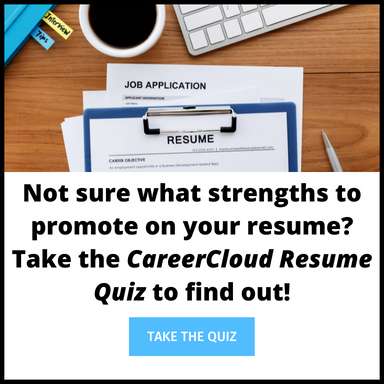
An academic resume is also called a Curriculum Vitae (CV). Think of a CV as a more comprehensive resume that dives deeper into your experiences. An academic CV is often much longer than a traditional resume, typically several pages long.
University or college faculty roles or research positions are ultra-competitive. An academic CV is primarily credential-focused. Because of that, it should include a more detailed look at your past experiences, teaching experience, relevant associations, awards, grants and fellowships, and other pertinent information.
An academic resume should include detailed information about your experience and credentials relevant to working in an academic setting. Below are some of the specific sections to include on an academic resume.
Start your resume by including your name and contact information at the top in the header section. Include information like your name, address, email, and phone number.
Use the resume summary section to share highlights of your academic and professional accomplishments briefly. Think in terms of the specific role you’re applying for and highlight the achievements that directly apply. You don’t need to include everything here since it’s only a summary.
Since many academic roles have specific degree prerequisites, nailing the education section of an academic resume is crucial.
List your educational experience in reverse chronological order, starting with your most recent degree earned or experience. List the college or university name, location (city, state), graduation date, your major, and the degree earned with each entry. You can also include other relevant information like your GPA, academic honors, and dissertation or thesis title.
List your employment history, starting with your most recent experience and work backward. Because this is an academic resume, only include academic-related tenure-track work experiences.
Depending on your specific experience, you could label this section as “Teaching Experience” or create a separate section for other teaching roles you’ve held.
For each listing, include your position, the institution, department, dates worked, and a description of your responsibilities or duties. Unlike a traditional resume, refrain from creating a bulleted list of your duties. In an academic CV, include more detailed information to provide more context of your experience.
Use this section to list any of your research that has been published, which helps to position you as an expert in your particular field.
Divide your publications into peer-reviewed and other publications, organized by publication date. You can break publications down further into subsections such as books, book chapters, journals, and other distinctions if desired.
Join The Break Community
Create another section on your resume If you’ve been awarded any grants or fellowships for research projects. Since receiving grant funding is competitive, including this information will showcase your accomplishments to the right people.
To list grants or fellowships, include the institution name, title, the grant or fellowship received, and the project dates. You can also include the amount awarded if you would like.
If you’ve won any awards related to your academic field, include them in a separate section. List the award name, the granting institution, and the date(s) received.
If you have experience as a research assistant, list any research projects in this section. Include the research project name, position held, institution name, and dates. Also, include a description of the research and any tasks you participated in on the project.
Depending on your experience, there could be other information you’ll want to include in your academic resume or CV. Perhaps you’ve been invited to speak on your area of expertise or participated in conferences or events related to your field of study. If that’s the case, create a separate section to include this information.
In a traditional resume, you typically don’t include references or make them available upon request. That’s not the case with an academic resume. It’s extremely helpful to include relevant references when trying to land an academic role.
Include the reference’s name, title, mailing address, phone number, and email address.
Related: How To List References On Your Resume
Just because an academic resume or CV is meant to be longer doesn’t mean you need to include every detail of your life. Work and other experience outside of the academic setting are out of place on an academic resume and shouldn’t be included.
An academic CV typically doesn’t include a skills section. If you end up including one, only include skills that directly apply to your field of study. Here are some academic skills you could include on your resume.
- Collaboration
- Critical thinking
- Design thinking
- Foreign languages
- Information management
- Interpersonal communication
- Oral communication
- Organization
- Peer review
- Problem-solving
- Project management
- Public Speaking
- Scientific writing
- Statistical analysis
- Time management
- Web development
- Written communication
There’s no set length for an academic resume, although typically, they can be several pages or longer.
Important academic skills include research, teamwork, analysis, project management, written and oral communication, and organization.
Although an academic CV typically doesn’t include a skills section, you could include this optional section towards the end of your resume. Typically skills are written as a bulleted list.
A professional academic resume should include a summary, education and work experience, teaching experience, publications, awards and honors, grants and fellowships, references, and other relevant information.
Having a professional-looking academic resume is a surefire way to get the right people’s attention when looking for a job in an academic setting. A resume writing service can help If you’re unsure exactly what information to include or how to format your academic resume.
Kevin Payne
Kevin Payne is a career, personal finance and travel writer. He is a regular contributor to Forbes Advisor, The Ascent and Bankrate. Kevin tackles tech, entrepreneurship and side hustle topics for Careercloud. He lives in Cleveland, Ohio with his wife and four kids.

How To Become A Virtual Assistant + Virtual Assistant Skills
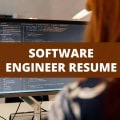
What To Include On A Software Engineer Resume + Software Engineer Skills
Want to build an unbreakable career.

- Self & Career Exploration
- Networking & Relationship Building
- Resume, CV & Cover Letter
- Interviewing
- Internships
- Blue Chip Leadership Experience
- Experiential Learning
- Research Experiences
- Transferable Skills
- Functional Skills
- Online Profiles
- Offer Evaluation & Negotiation
- Arts & Media
- Commerce & Management
- Data & Technology
- Education & Social Services
- Engineering & Infrastructure
- Environment & Resources
- Global Impact & Public Service
- Health & Biosciences
- Law & Justice
- Research & Academia
- Recent Alumni
- Other Alumni Interest Areas
- People of Color
- First Generation
- International
- Faculty & Staff
- Parents & Families
Tips for Adding Research to Your Resume
- Share This: Share Tips for Adding Research to Your Resume on Facebook Share Tips for Adding Research to Your Resume on LinkedIn Share Tips for Adding Research to Your Resume on X
Getting involved in research is a unique experience that can help you build important skill for school and beyond! Once you get started, it’s important to think about adding it to your resume. When applying to future research positions, jobs, internships, and/or graduate school, it’s important to show off your experience. You will want to show that you have this kind of experience and also show off the skills that you have used/developed in your research position.
What You Need to Include
Its important to summarize the basic details of each position on your resume so that whoever reads it understands what each position was before they even read your bullet points.
Your research experience should have; • Your Role/Title Example: Research Assistant, Student Lab Member, etc.
• Lab and University Name Example: Wildcat Lab, University of Arizona
• City/State, not the full address! Example: Tucson, AZ
• Start Month/Year – End Month/Year. Examples: February 2023 – Present | January 2022 – May 2022
Putting it all together! Research Assistant | Tucson, AZ Wildcat Lab, University of Arizona | February 2023 – Present
Next – Writing About Your Experience s
Writing about your experience is important because this is the part that shows off what you did in your research experience! It’s important to write in a way that shows off the skills you used in the role. This is why we recommend writing in a style called APR format.
APR stands for Action – Project/Problem – Results. This format gives the employer, or whoever is reading your resume, enough information to see what you did, which skills you used, and why or how the task was completed. You can review more about APR format on the Resume Section on our website.
When preparing to write this section, think about what you did in your research position. What did you do? Why were you doing it? What skills did you use? Why or How was it completed? These are some questions to think about why writing about your experience. Then, use bullet points to list specific roles, tasks, or accomplishments.
Example Bullet Points: • Code participants answers in Excel to ensure data is HIPAA compliance • Analyze data using IBM SPSS to create correlation models and to find significant numbers • Present at weekly meetings to share findings with research team members
In these examples, you can see each bullet point includes skills such as coding, analyzing, programming (IBM SPSS), and communication.
Putting It On The Page
Once you have finished your bullet points, you can add them to your resume! Students typically put their research experience in a section that allows these activities to stand out. If you feel like your research is something that you want to highlight, you can create a specific section for it!
Give it a unique header such as Lab Experience , Research Experience, etc. and you’re ready to go!
Example Resumes with Research
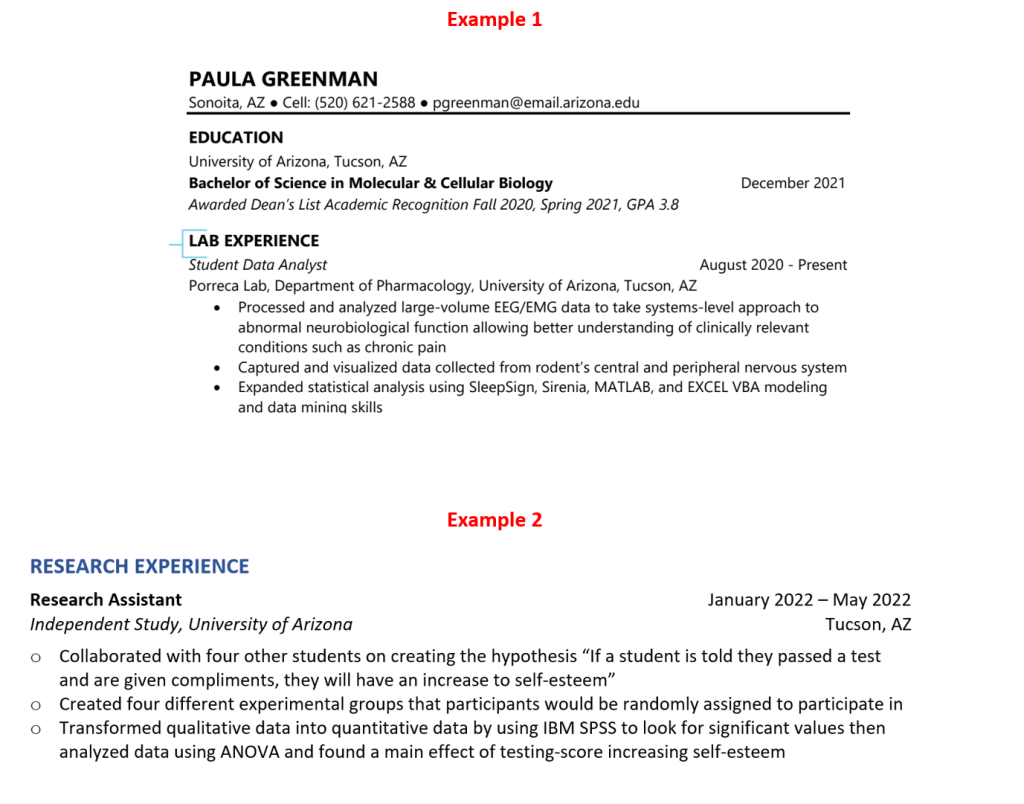
Adding Your Research Skills
Remember, you can also add your research skills to your skills section, if you have one! This is a good place to directly state the skills you used in your research experience. It’s important to state your technical skills, such as programming, equipment, etc. and transferrable skills such as communication, data analysis, etc.
Example Skills Sections
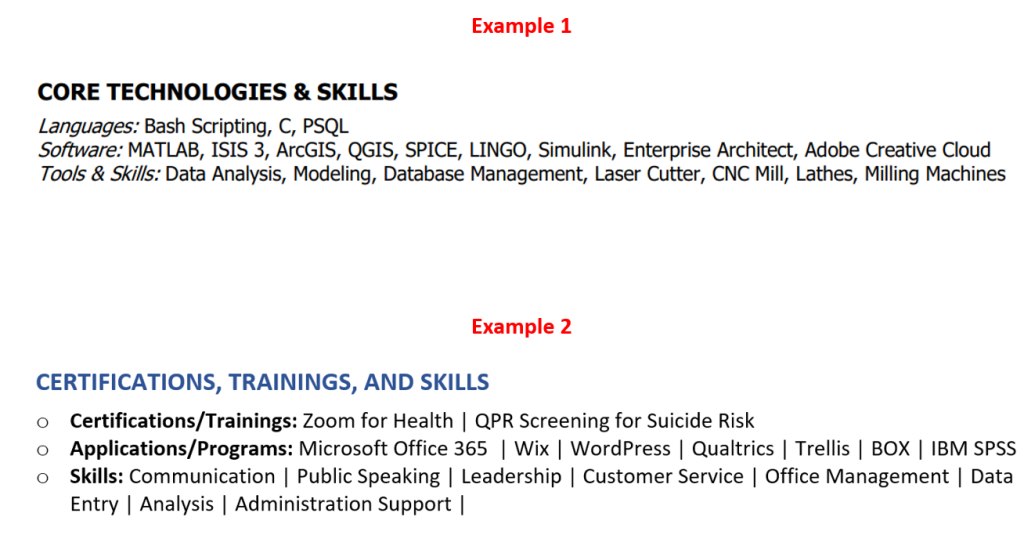
Resume Help
Get more resume information, templates, and more on our website or make an appointment with a Career Peer Coach , who can help you create a new resume or review your current one!
We respectfully acknowledge the University of Arizona is on the land and territories of Indigenous peoples. Today, Arizona is home to 22 federally recognized tribes, with Tucson being home to the O'odham and the Yaqui. Committed to diversity and inclusion, the University strives to build sustainable relationships with sovereign Native Nations and Indigenous communities through education offerings, partnerships, and community service.
Resume Worded | Resume Skills
Skill profile, improve your resume's success rate by using these research skills and keywords ..
- Hard Skills and Keywords for your Research Resume
- ATS Scan : Compare Your Resume To These Skills
- Sample Resume Templates
- How To Add Skills to Your Research resume
Research Resume Templates
- Word Cloud for Research Skills & Keywords
Browse Jobs in this Category
Frequently asked questions.
- 3. Effective Action Verbs for your Resume
Get a Free Resume Review
Looking for keywords for a specific job search for your job title here., © 2024 resume worded. all rights reserved., research resume keywords and skills (hard skills).
Here are the keywords and skills that appear most frequently on recent Research job postings. In other words, these are the most sought after skills by recruiters and hiring managers. So try to include them on your resume where possible. Go to the Sample Templates ↓ below to see how to include them on your resume. Remember that every job is different. Instead of including all these keywords on your resume, identify the keywords most relevant to the job you're applying to and include those. Use the free Targeted Resume tool to help with this.
- Python (Programming Language)
- R (Programming Language)
- Machine Learning
- Find out what your resume's missing
- C (Programming Language)
- Data Analysis
- Microsoft Access
- Deep Learning
- Computer Vision
- Programming
- Geographic Information Systems (GIS)
- Project Management
- Quantum GIS
- Cartography
- Market Research
- ArcGIS Products
- Project Planning
- Engineering
- Sustainable Development
- Public Speaking
- Research and Development (R&D)
- Product Development
- Manufacturing
- Laboratory Skills
- Design of Experiments (DOE)
- Materials Science
- Computer-Aided Design (CAD)
- Accreditation
- Simulations
- Signal Processing
- Artificial Intelligence (AI)
- Mechanical Engineering
- Electronics
- Finite Element Analysis (FEA)
- Embedded Systems
- Software Development
- Qualitative Research
- Quantitative Research
- Survey Design
- Life Sciences
- Research Design
- Clinical Research
- Clinical Trials
- Biotechnology
- Focus Groups
- Grant Writing
- Policy Analysis
- Questionnaire Design
- Customer Insight
- Molecular Biology
- Survey Research
- Consumer Behavior
- Advertising Research
- Segmentation
- Primary Research
- Online Research
- Report Writing
- Consumer Insight
- Cross-functional Team Leadership
- Continuous Improvement
- Product Management
- Team Leadership
- Strategic Planning
- Good Clinical Practice (GCP)
- Clinical Monitoring
- Clinical Trial Management System (CTMS)
- Electronic Data Capture (EDC)
- Clinical Development
- CRO Management
- Clinical Research Associates
- Clinical Data Management
- Standard Operating Procedure (SOP)
- Therapeutic Areas
- Clinical Operations
- Oncology Clinical Research
- Regulatory Submissions
- U.S. Food and Drug Administration (FDA)
- Clinical Site Monitoring
- Product Innovation
- Software Project Management
- Innovation Management
- Integration
- Business Strategy
- Agile Methodologies
- Software as a Service (SaaS)
- Cell Culture
- Biochemistry
- Cell Biology
- Western Blotting
- Spectroscopy
- Polymerase Chain Reaction (PCR)
- Nanotechnology
- Bioinformatics
- Market Analysis
- Secondary Research
- Marketing Strategy
- Competitive Analysis
- Market Intelligence
- Digital Marketing
- Business Development
- Lead Generation
- Program Evaluation
- Qualitative & Quantitative Research Methodologies
- Community Outreach
- Data Collection
- Public Policy
- Higher Education
- Project Coordination
- Communication
- Event Management
- Commercialization
- Product Launch
- Design Control
- Medical Devices
- Drug Discovery
- Quality System
- Technology Transfer
- Biomedical Engineering
Resume Skills: Data Analysis & Visualization
- Python (numpy, pandas)
- Match your resume to these skills
Resume Skills: Machine Learning
- Scikit-Learn
Resume Skills: Big Data
- AWS Redshift
Resume Skills: Programming & Web
Where on my resume do I add these buzzwords? Add keywords directly into your resume's work experiences , education or projects. Alternatively, you can also include a Skills section where you can list your technical skills in order of your proficiency. Only include these technical skills or keywords into your resume if you actually have experience with them.
Does your resume contain all the right skills? Paste in your resume in the AI Resume Scan ↓ section below and get an instant score.
Compare Your Resume To These Research Skills (ATS Scan)
Paste your resume below and our AI will identify which keywords are missing from your resume from the list above (and what you need to include). Including the right keywords will help you get past Applicant Tracking Systems (i.e. resume screeners) which may scan your resume for keywords to see if you're a match for the job.
Sample Research Resume: How To Include These Skills
Add keywords directly into your resume's work experiences , education or skills section , like we've shown in the examples below. use the examples below as inspiration..
Where on my resume do I add these buzzwords? Add keywords directly into your resume's work experiences , education or projects. Only include these technical skills or keywords into your resume if you actually have experience with them.
How do I add skills to a Research resume?
Go through the Research posting you're applying to, and identify hard skills the company is looking for. For example, skills like C (Programming Language), C++ and LaTeX are possible skills. These are skills you should try to include on your resume.
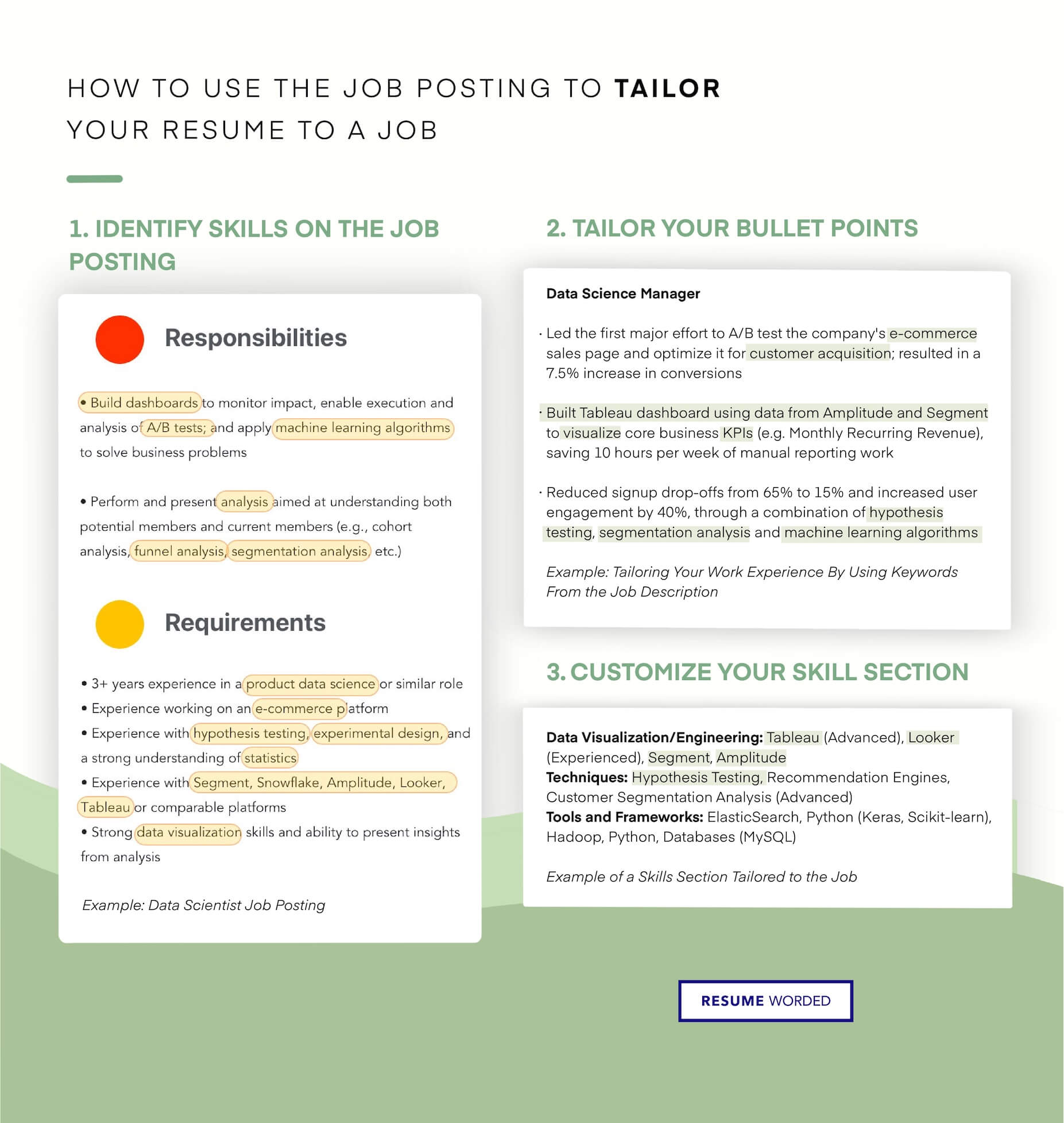
Add other common skills from your industry - such as Research, Python (Programming Language) and Machine Learning - into your resume if they're relevant.

Incorporate skills - like Consumer Behavior, Agile Methodologies and Regulatory Submissions - into your work experience too. This shows hiring managers that you have practical experience with these tools, techniques and skills.
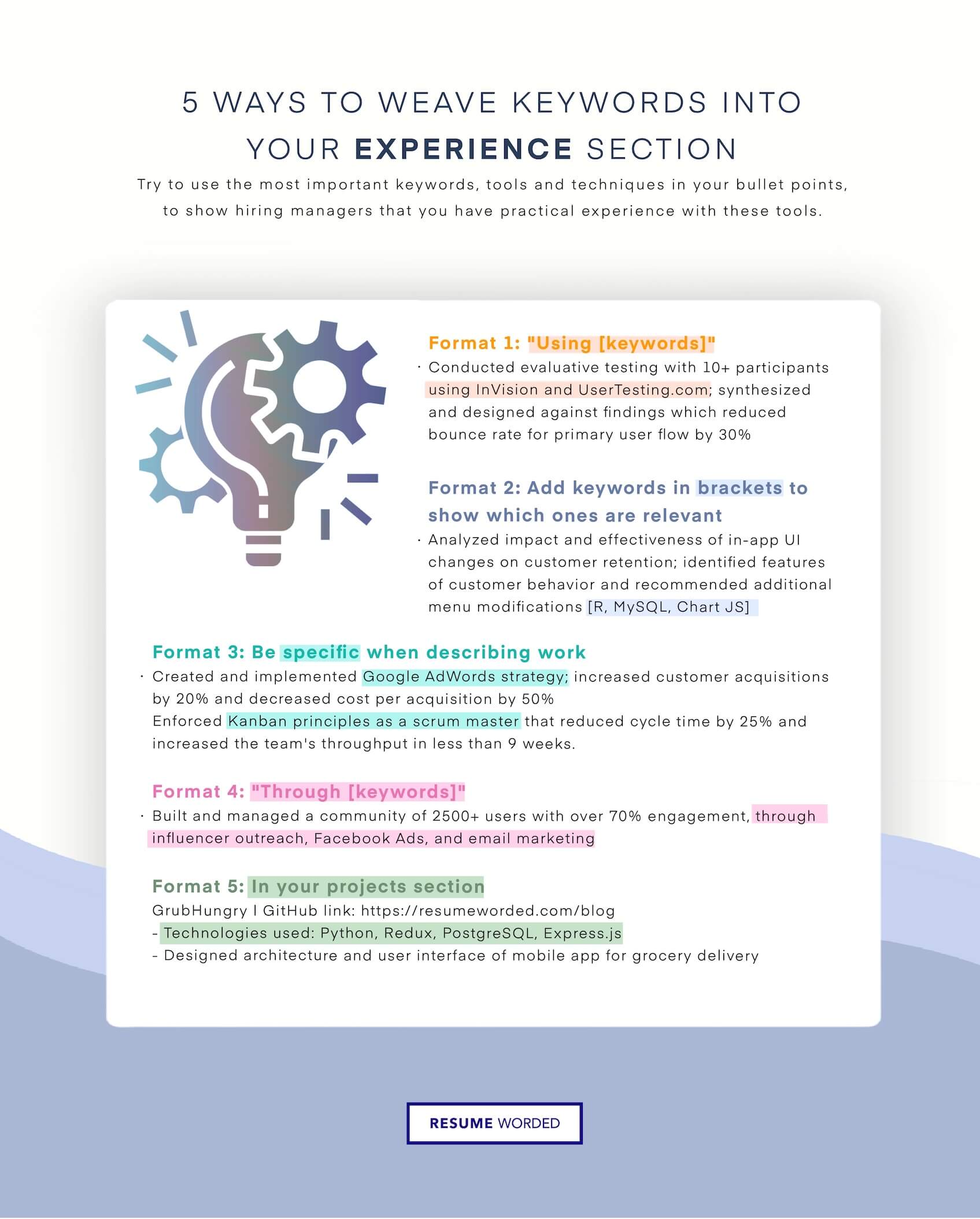
Consider including a section in your resume dedicated to your research experience. On Research resumes, hiring managers want to see research projects which you led or where involved with, and their outcomes.
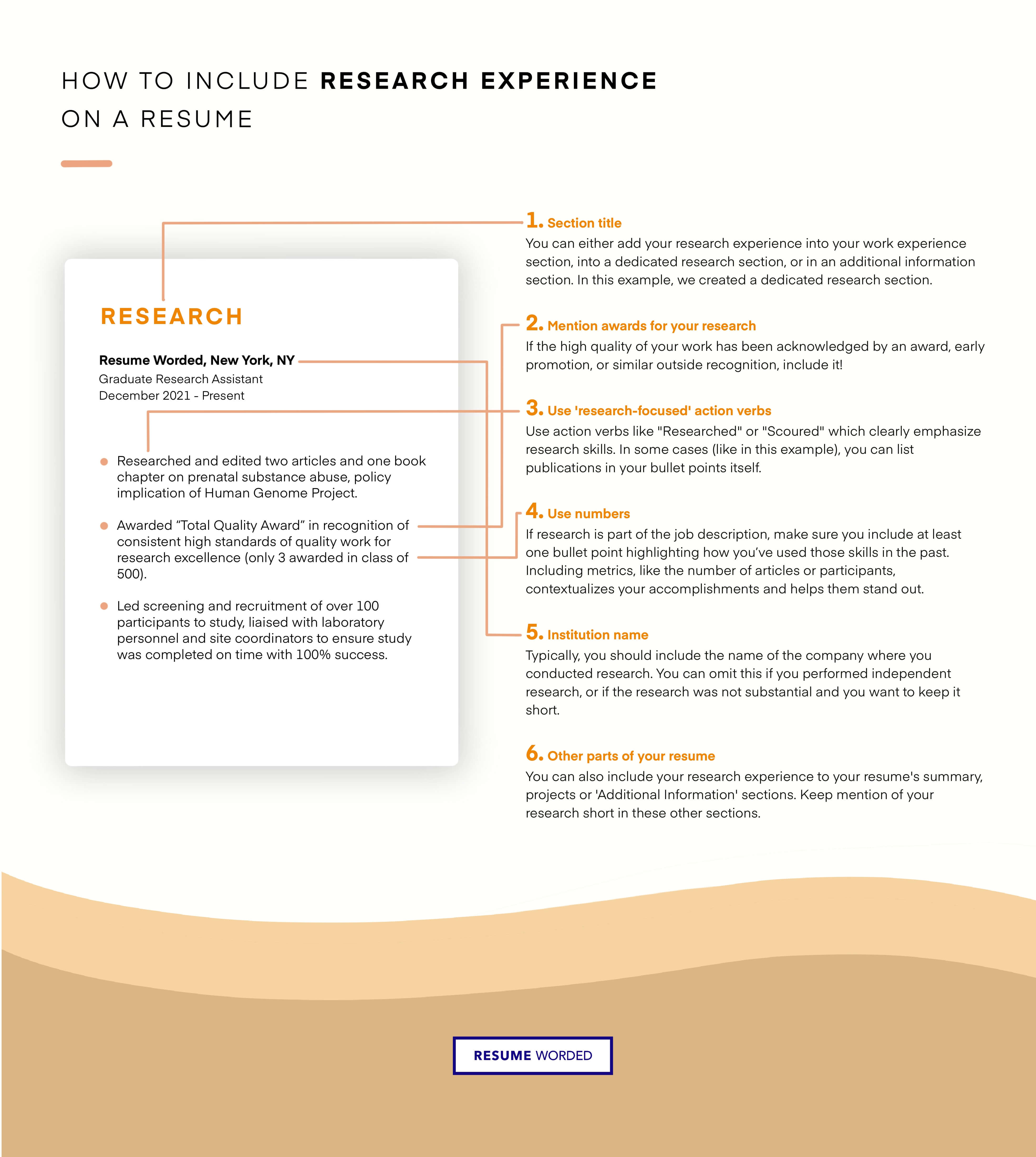
Try to add the exact job title, Research, somewhere into your resume to get past resume screeners. See the infographic for how to do this.
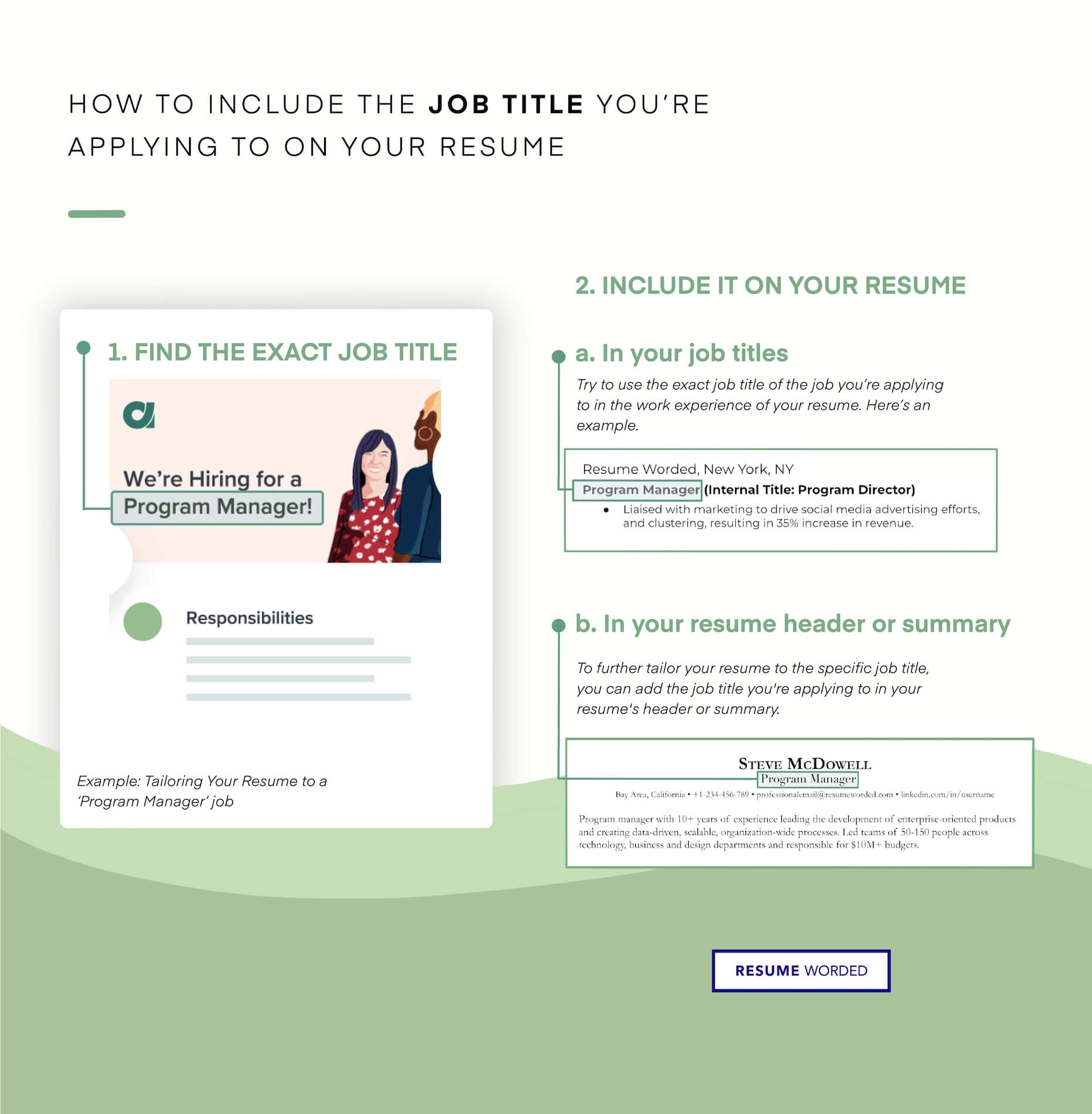
Here are examples of proven resumes in related jobs and industries, approved by experienced hiring managers. Use them as inspiration when you're writing your own resume. You can even download and edit the resume template in Google Docs.
Resume Example Clinical Research Assistant
An effective Description of the templates...
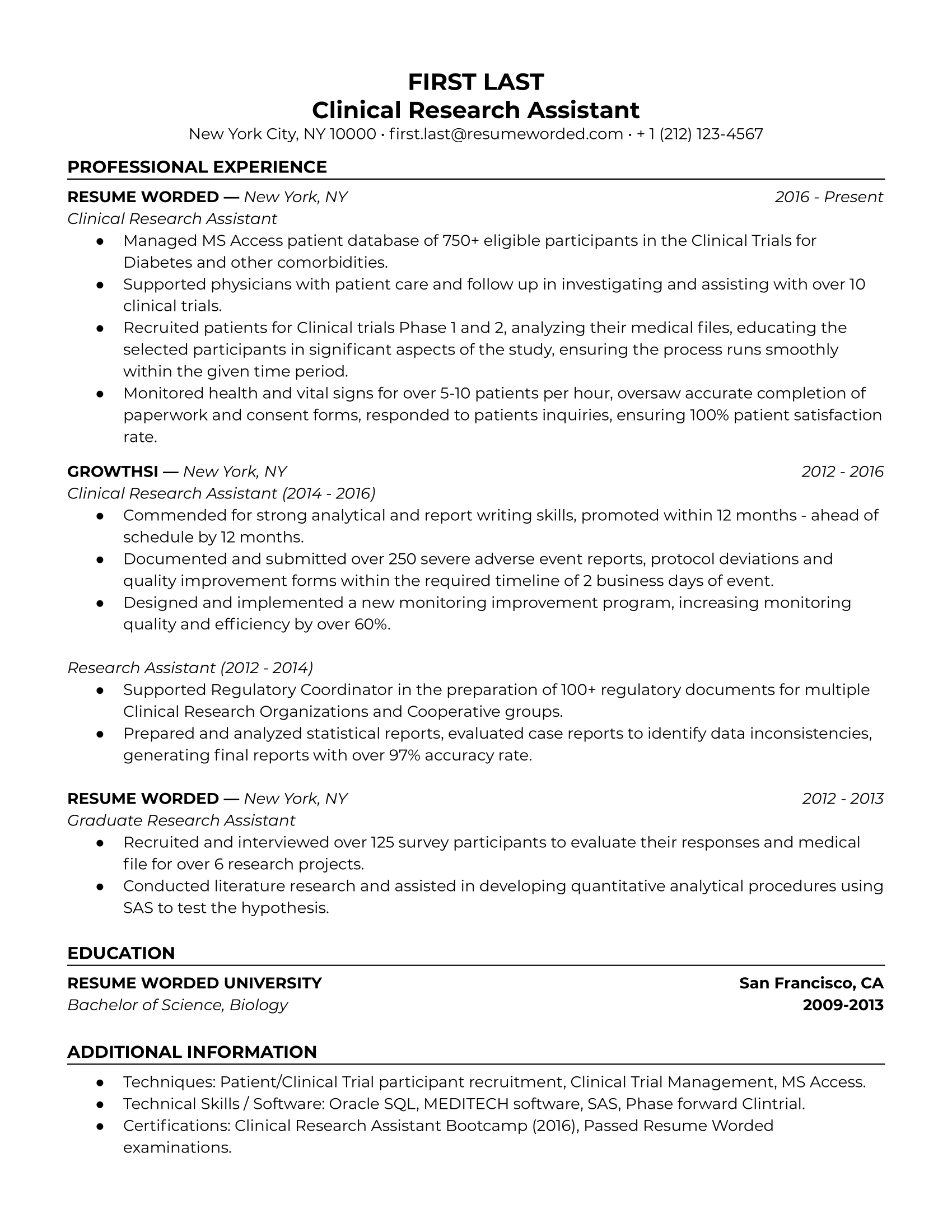
Download this resume template
Clinical research assistants work on clinical trials in hospitals and medical research centers. As a clinical research assistant, you’ll be assisting doctors and senior researchers by recruiting and enrolling research subjects, developing protocols, setting up and managing trials, collecting and analyzing data, and contributing to trial reports, regulatory authority applications, and grant writing. Ideally, you’ll need some experience or a degree in the field of study and clinical trial experience.
Tips on why this template works
focused on clinical research.
When applying for a more specialized position like clinical research assistant, you want to keep your resume as tightly focused as possible. That means prioritizing clinical research experience. It’s fine to include general research experience, but try to tailor your bullet points by including accomplishments relevant to clinical research, like preparing regulatory documents and conducting medical research.
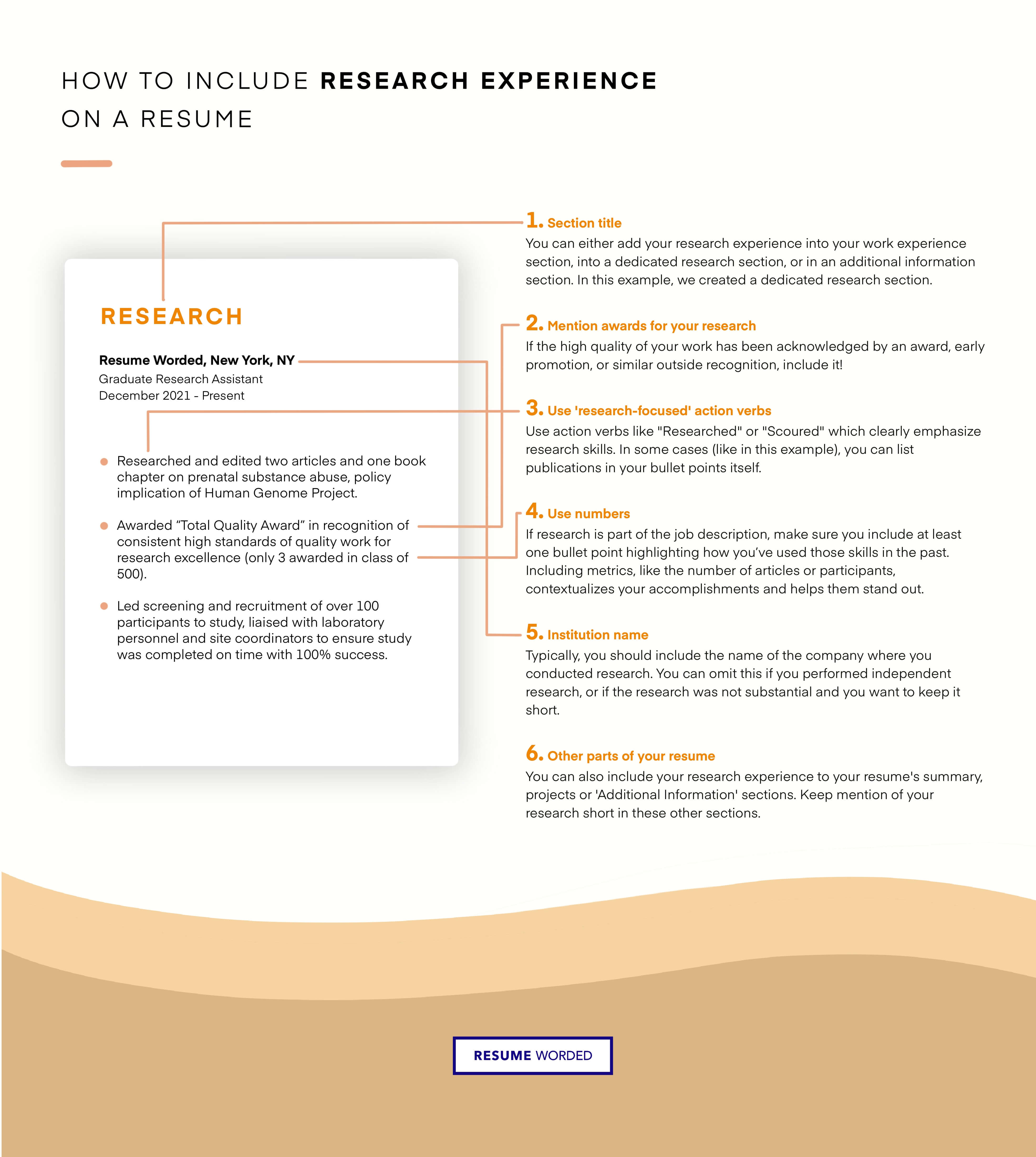
Good use of skills section to highlight research skills and tools
Jobs that require a lot of hard skills, like clinical research, may end up with a larger than usual skills section. Avoid making recruiters’ eyes glaze over by splitting it into subsections, like certifications, techniques, and technical skills. Make sure you’re exclusively listing hard skills — employers want to see things like relevant software skills and clinical trial experience.

Resume Example Laboratory Research Assistant
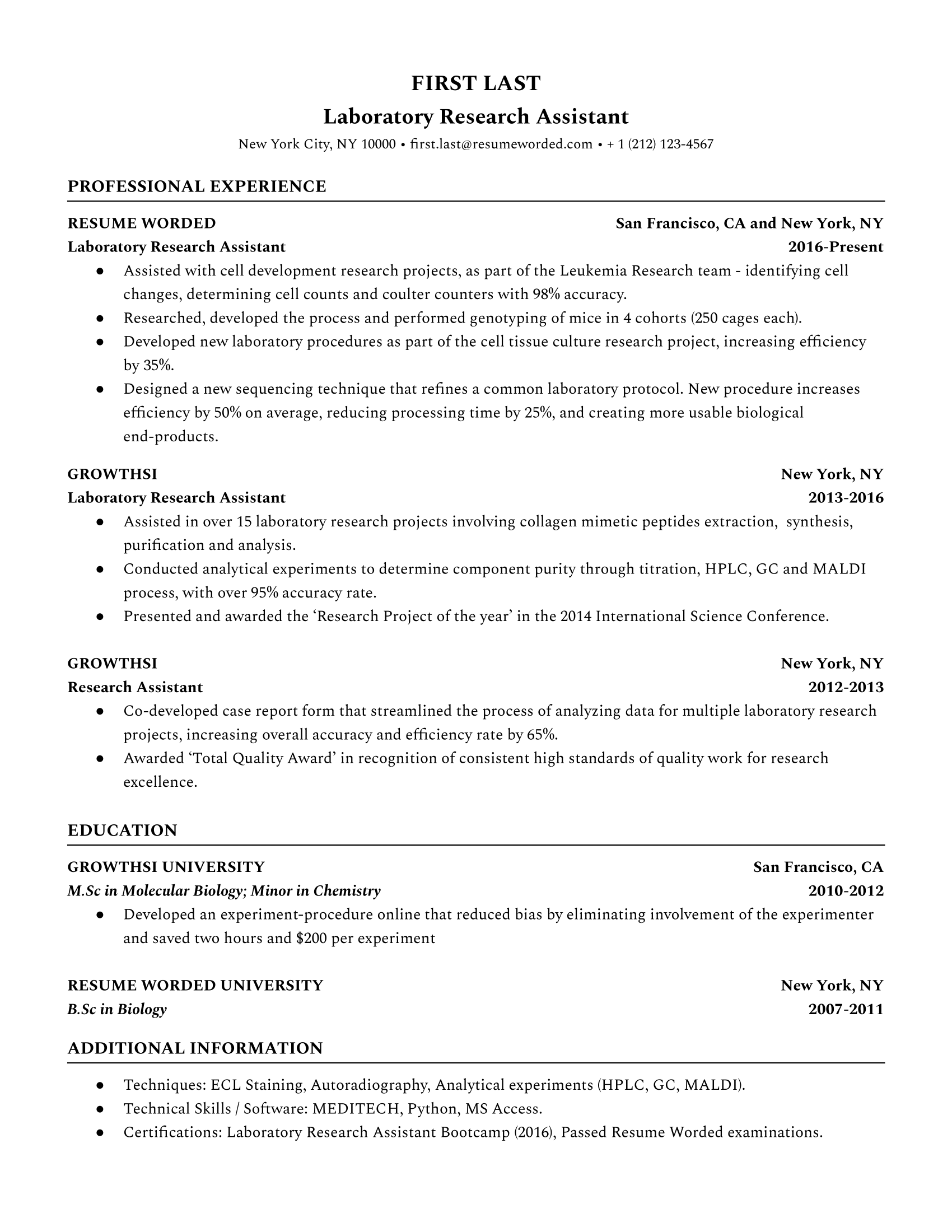
As a laboratory research assistant, you’ll be working in a laboratory environment to design projects, conduct research and experiments, write reports, perform general laboratory maintenance, and assist senior laboratory staff — so make sure to emphasize your technical skills. You may be working for a private laboratory, medical or research facility, or pharmaceutical company. Unlike standard research assistant positions, lab assistants typically work full-time, including weekend and evening shifts.
Bullet points feature strong action verbs
Every bullet point should start with a strong action verb. Remember, your resume is supposed to highlight your accomplishments, not simply list your job duties. As a laboratory research assistant, you’ll want to emphasize your scientific expertise. Verbs like Researched, Designed, and Developed all reflect the skills you’ll be expected to use on the job.
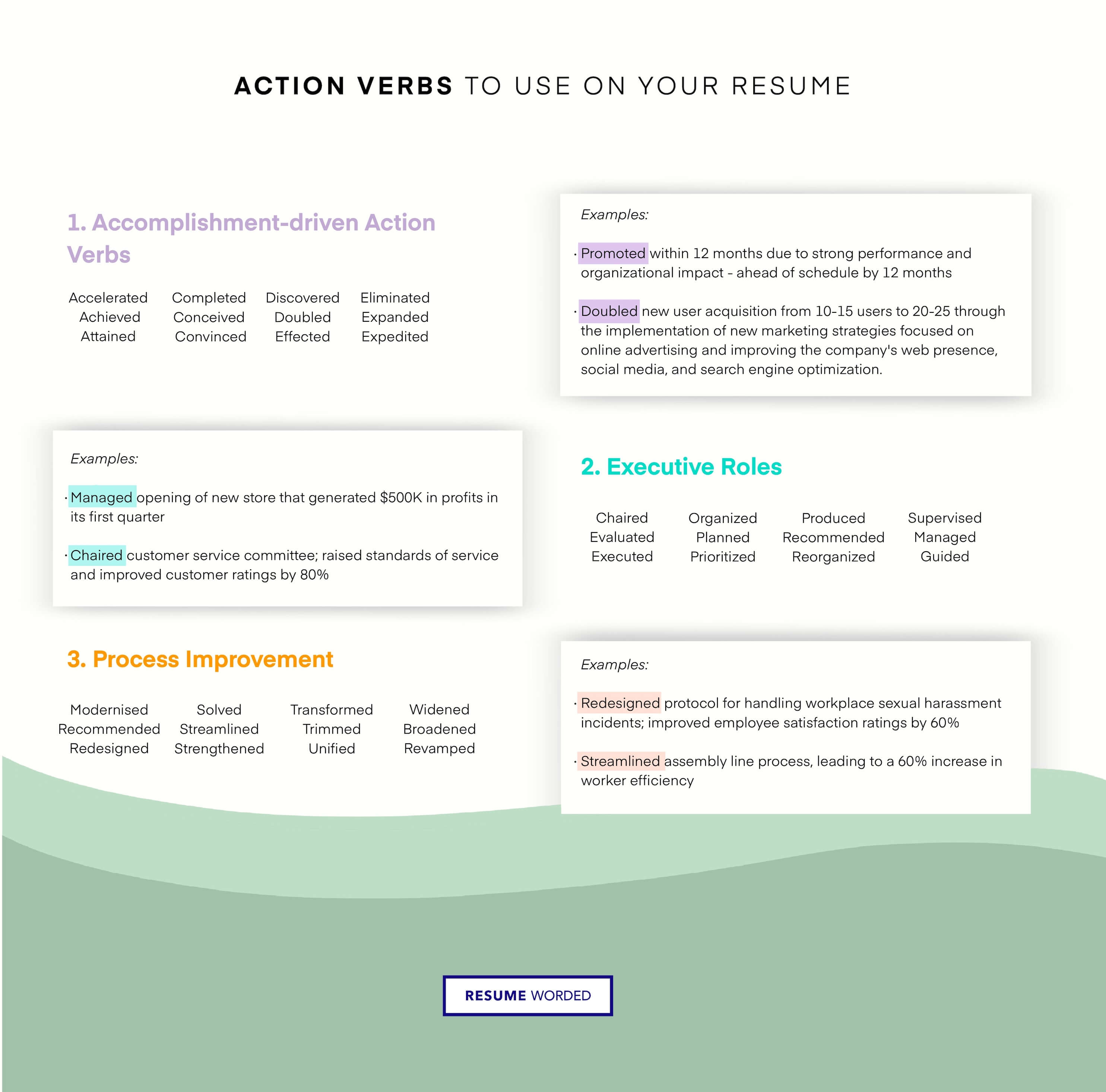
Uses hard numbers and metrics
Including metrics in your bullet points is the best way to demonstrate the outcome of your work. This doesn’t mean every bullet point needs to include numbers but try to quantify your accomplishments whenever possible. If you analyzed data with 98% accuracy, reduced processing times by 25%, or performed research on 1,000 subjects, say exactly that.
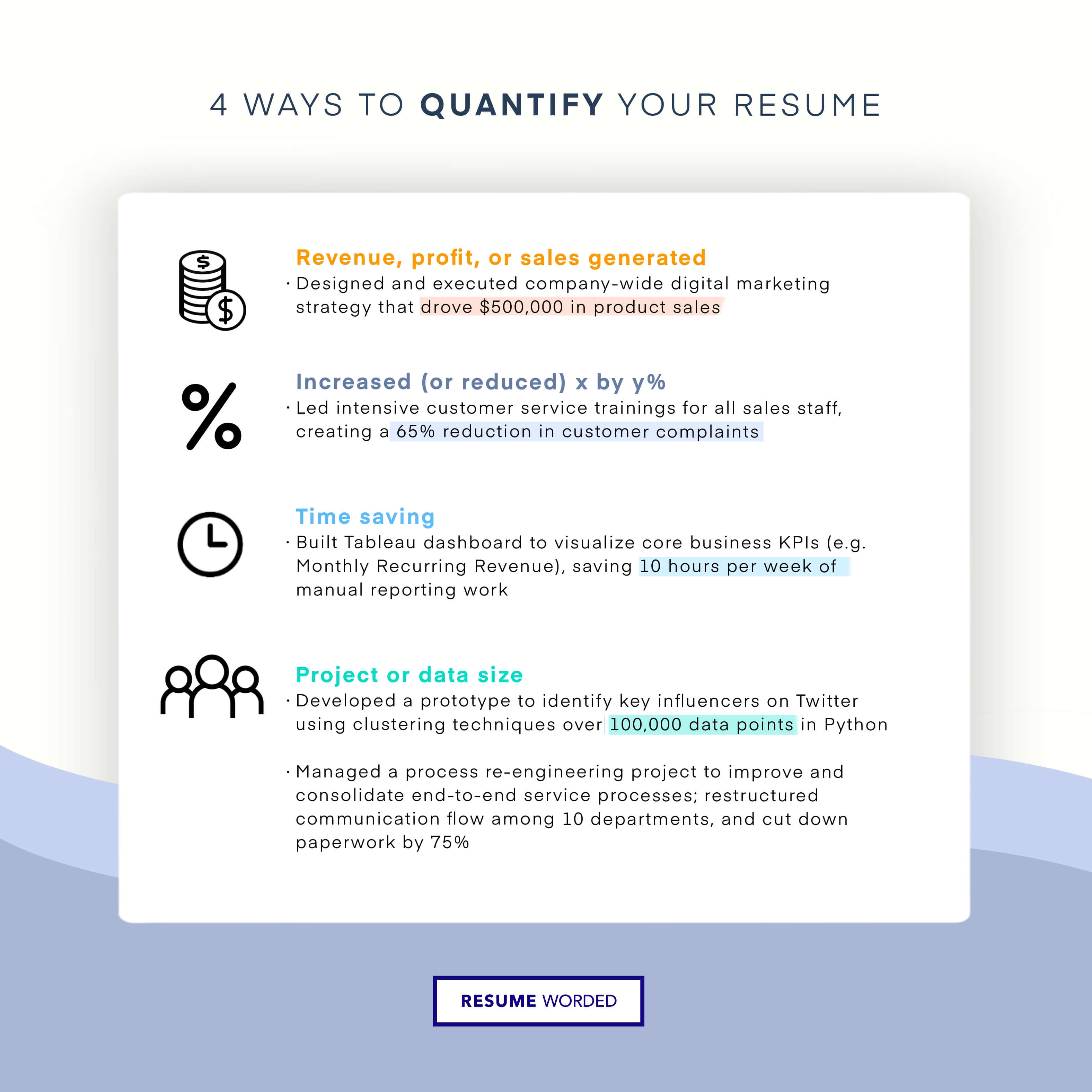
Resume Example Graduate Research Assistant
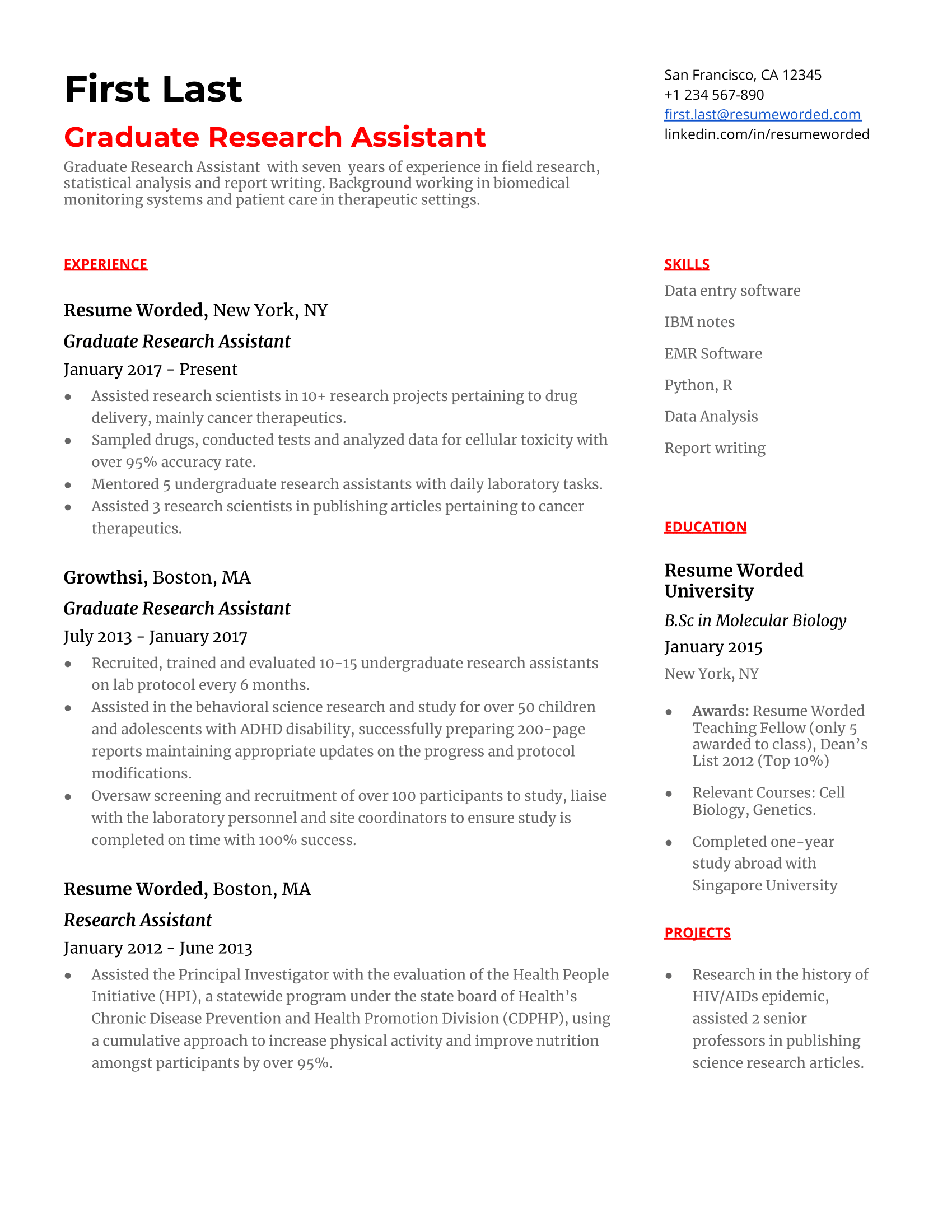
Graduate research assistants are able to work while they study, receiving a tuition reimbursement or stipend as well as valuable experience working in academia. As a graduate research assistant, you’ll have completed an undergraduate degree and be pursuing a master’s degree or PhD. You’ll generally be working closely with a supervisor to support their projects, including conducting research, analyzing data, writing reports, and supervising undergraduate research assistants.
Highlights university research projects
As a graduate research assistant, hiring managers won’t expect you to have extensive paid experience. If you’ve worked on previous research projects as a student, you can list these under your work experience or in an education or projects section. For greater impact, use action verbs and metrics to frame your accomplishments in an action-focused way.
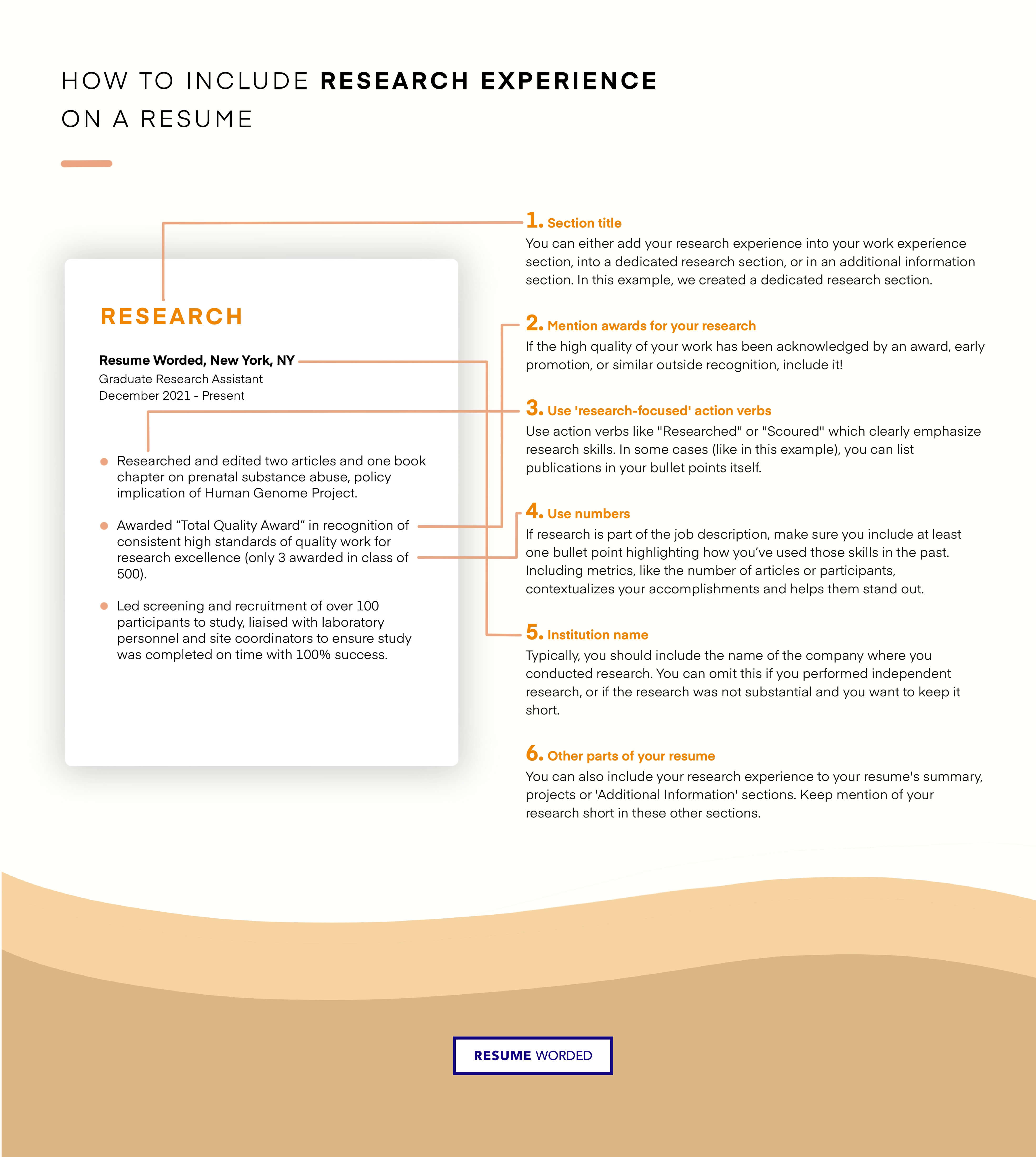
Includes a resume summary focused on graduate research interests and experience
Even as a graduate, you may have significant research experience, especially if you’ve been heavily involved in student research. You can highlight your skills and background with a short resume summary — no more than 100 words — explaining your years of experience, research or educational specialization, and 1-2 of your most impressive accomplishments.

Resume Example Chemistry Research Student
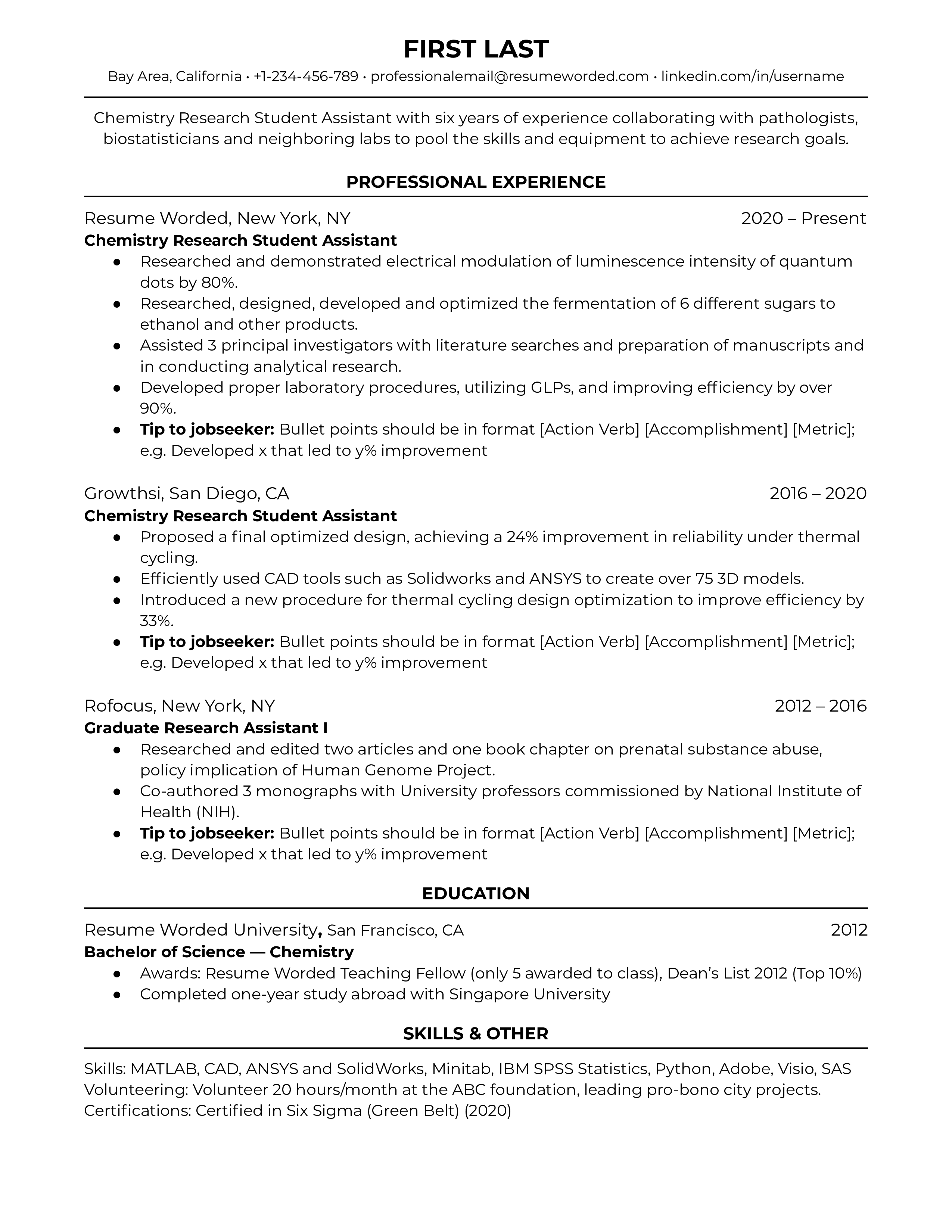
When applying to be a chemistry research student assistant, emphasize your past research experience and chemistry skills in your resume. Chemistry is a specific and precise discipline, and your resume should reflect these qualities. Aim to choose instances that detail your expertise in hands-on lab procedures or with relevant software, as opposed to simply listing out the responsibilities you were assigned. Use strong action verbs and be deliberate with what you include.
Emphasize hard skills with metrics relevant to chemistry
As mentioned above, chemistry is a precise discipline -- you’re often working in the lab with dangerous chemicals or complex equipment. That means that the employers reading your resume -- labs, government agencies, or academic institutions -- are looking for evidence of your experience and skills in those areas. Do your research to find what types of software the job posting notes, whether that’s MATLAB, Solidworks, or ANSYS. Emphasize the hard skills you’ve learned through your past experience with powerful action verbs, and highlight your achievements with quantifiable metrics.
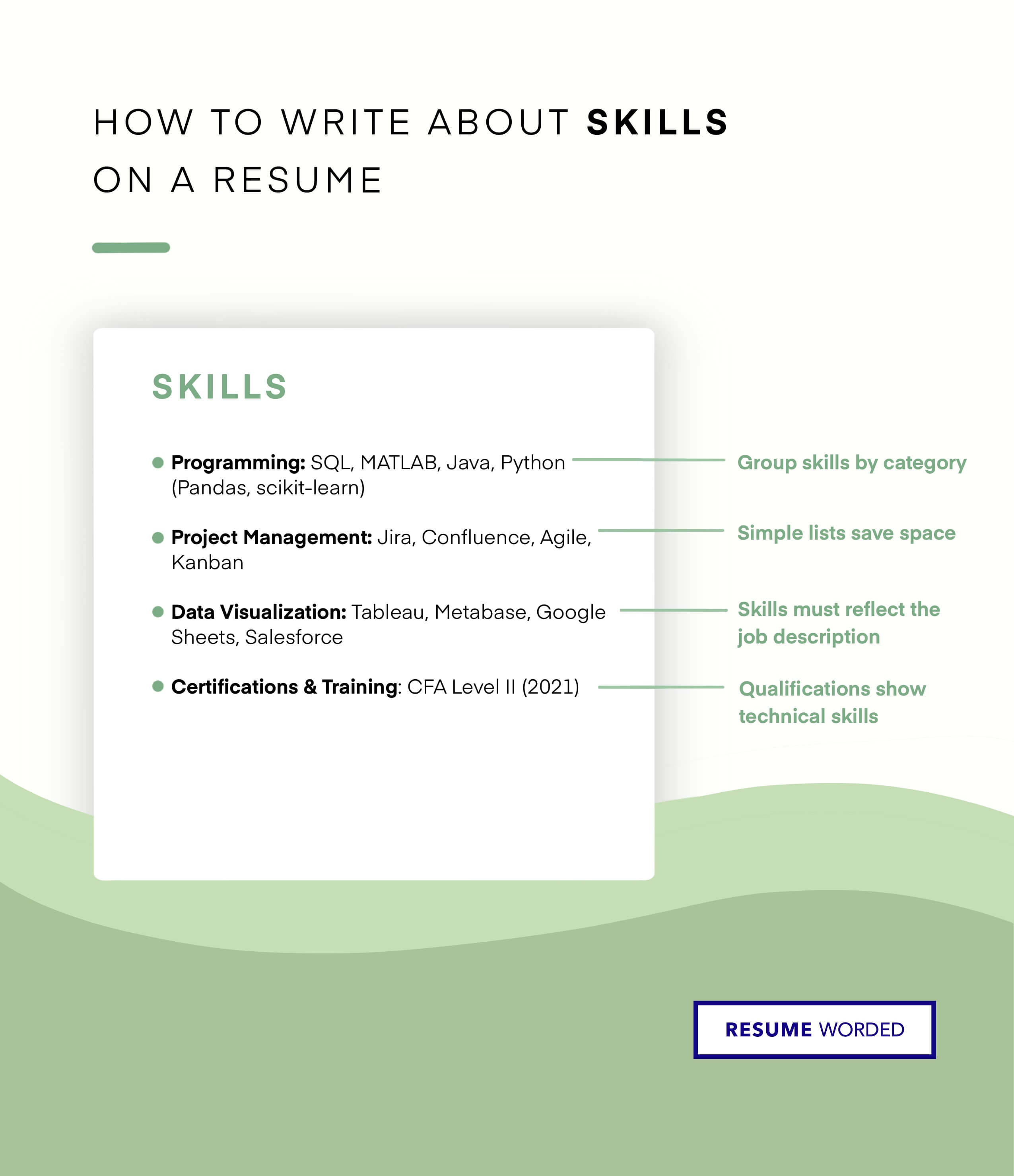
Concise, informational chemistry resume summary
This resume makes great use of a concise, information-packed elevator pitch that is well-written and to the point. Chemistry recruiting managers often don’t have time to carefully read through every detail of your resume, so a resume summary is a great way for them to get a high-level overview of your work history. When brainstorming what to put in your chemistry resume elevator pitch, include your personal strengths as a chemist, or even the types of people you’ve learned to work with (i.e., biostatisticians, pathologists, professors).
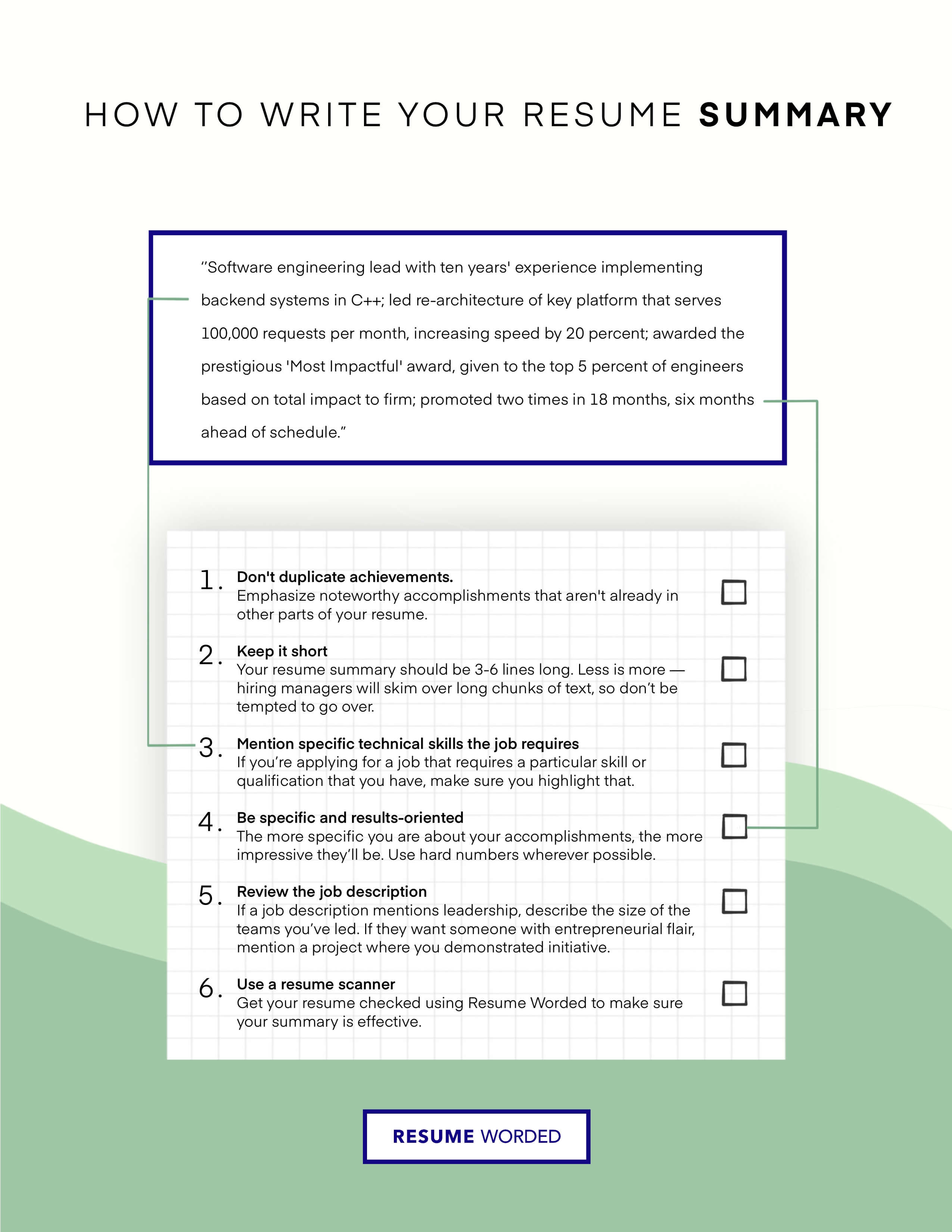
Resume Example Policy and Research Policy Analyst
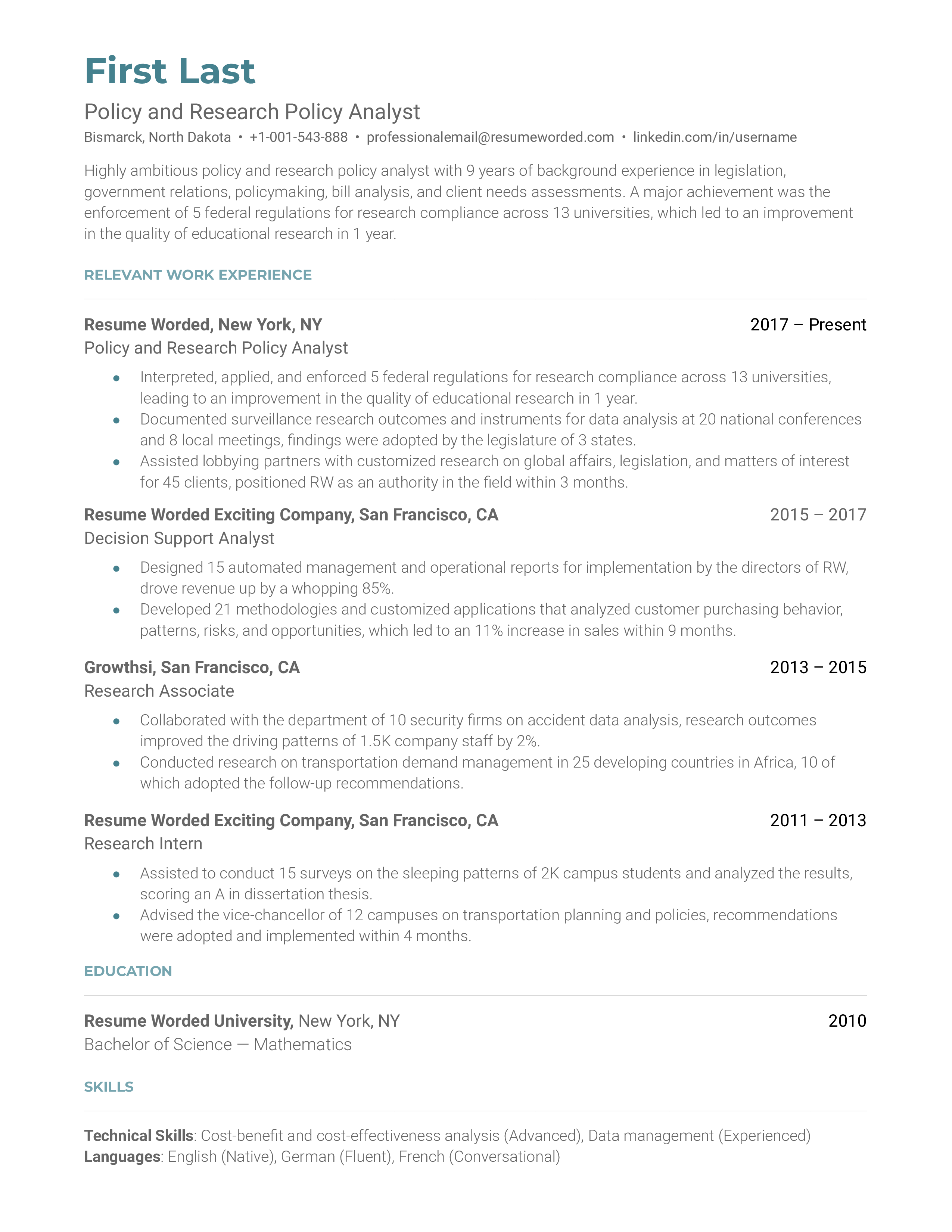
As the title suggests, this position requires an analyst to interrogate current policies or problems, do in-depth research and data analysis around a problem and be able to offer workable solutions. You will most likely work under a senior analyst and possibly as part of a team of analysts. You should therefore be an effective team player. This resume does a great job of highlighting the applicant's extensive research-based background as well as their ability to develop effective solutions. It also does a great job of emphasizing the applicant’s ability to successfully collaborate with colleagues.
Highlight research experience.
You want an employer to be confident in your capabilities to properly research any assigned topic. You also want to make it clear that not only do you have extensive experience as a researcher but you are also capable of synthesizing the research into solutions. So, highlight your crafted solutions - especially those that were adopted.
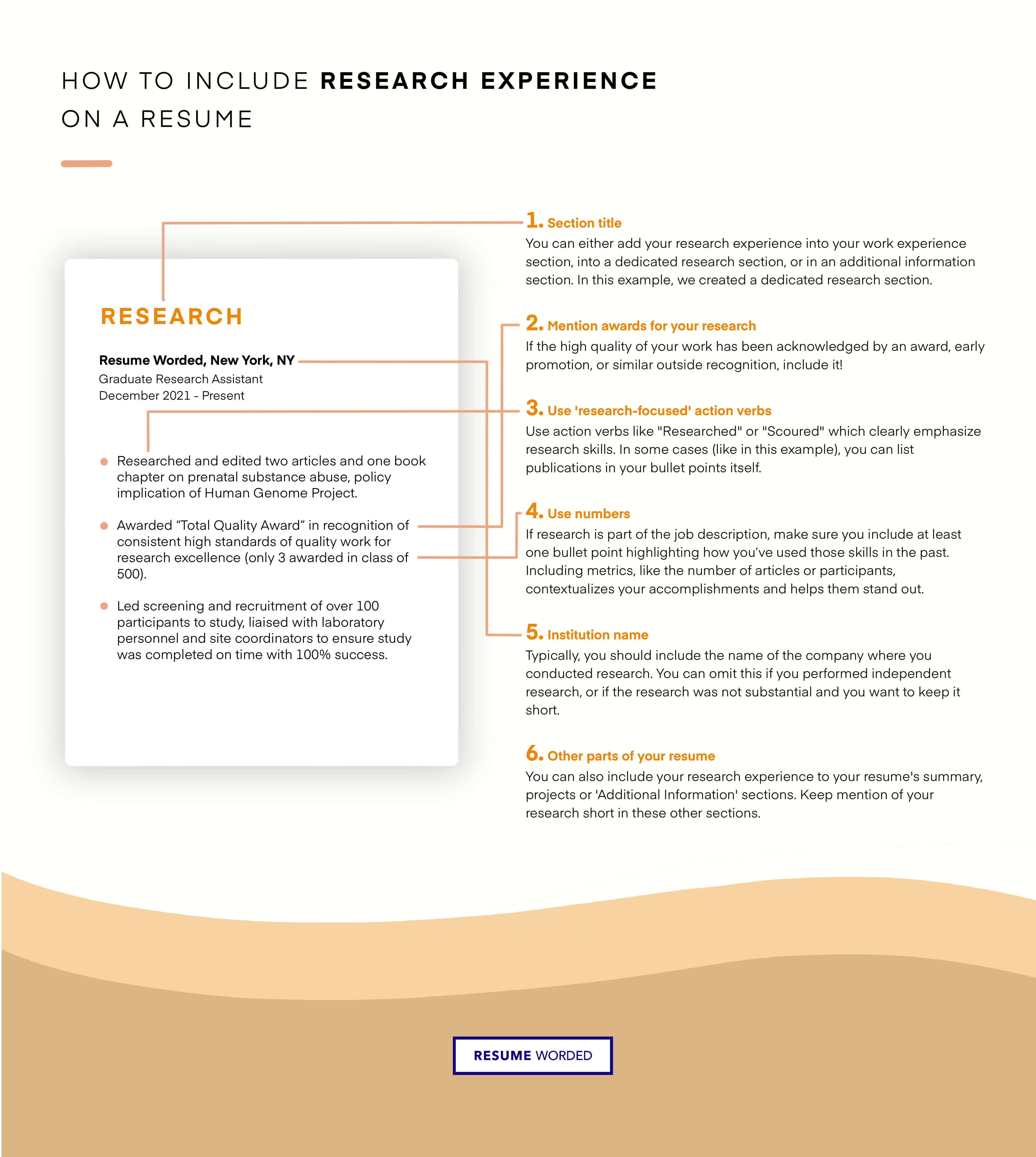
Quantify your value add to employers.
A policy analyst is supposed to create workable solutions that should have positive results. Show your effectiveness by quantifying how your suggestions and policy saved resources, increased revenue, or otherwise benefitted your previous employers.
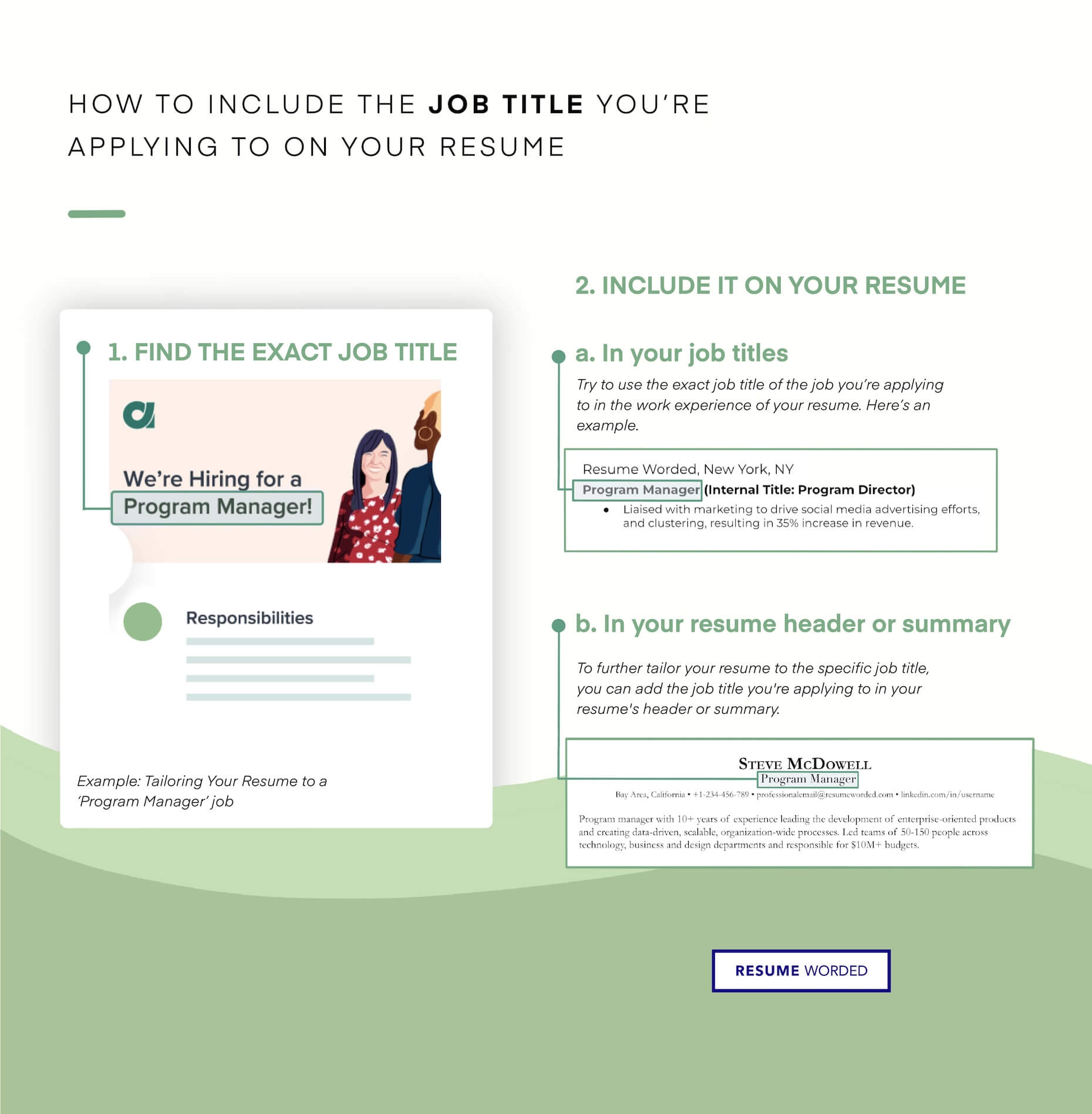
Resume Example Equity Research Associate
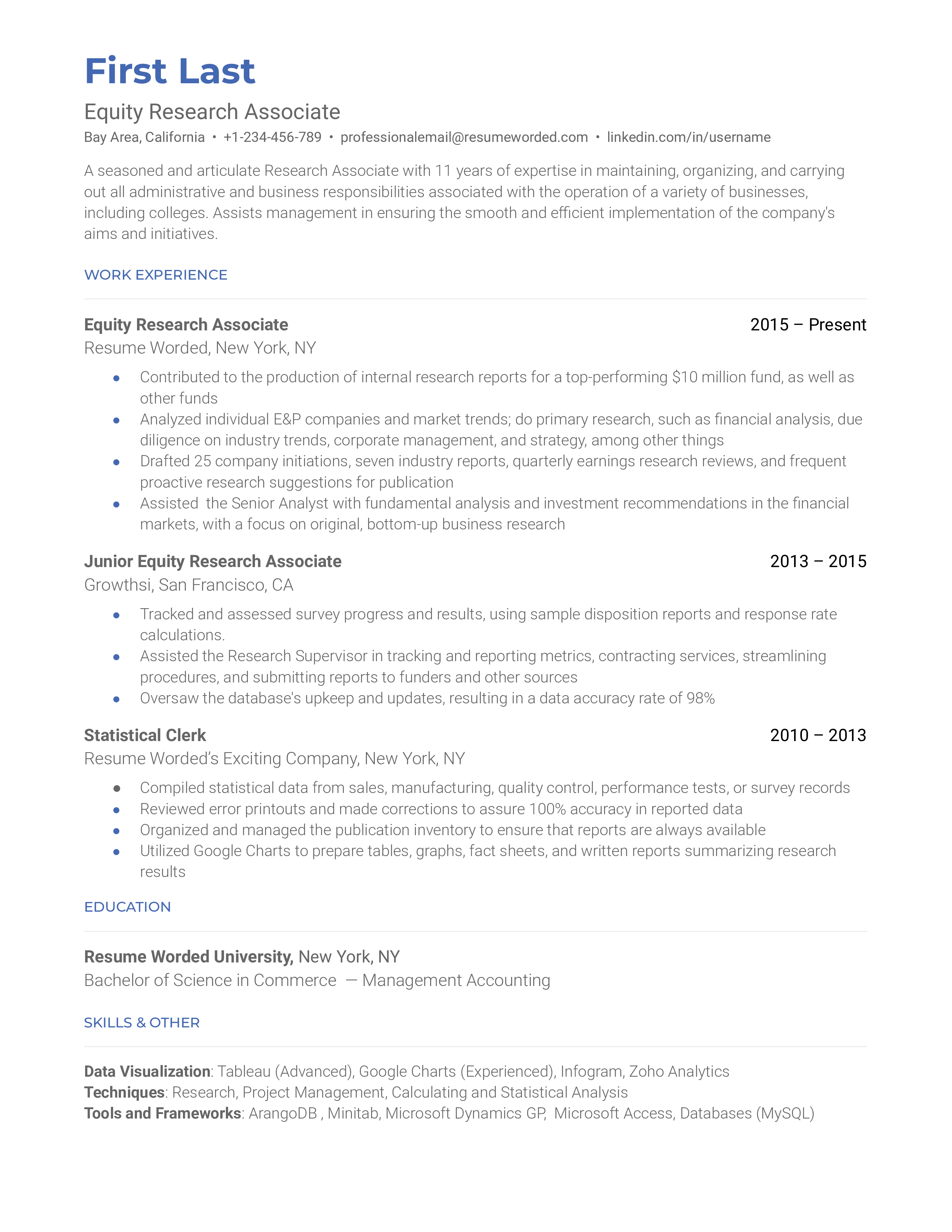
An equity research associate position is commonly an entry-level position in the equity research analyst industry. In this position, you will generally be working under/with a more senior research associate. You will be doing a lot of financial modeling, valuation, and other necessary financial research. Your work will help inform the recommendations the senior analyst will make to the decision-makers. This position has a heavy and varied workload. You will want your resume to show your ability to complete varied research and analysis-related tasks to a high level. If you do not have years of experience, you will also want to clearly list any related educational background and any skills that would enable you to complete expected tasks.
Include research and analysis experience in related industries.
Because this can be an entry related position, you may not always have a lot of equity research experience. So include any positions you have had in related industries. Especially if those positions are research and analysis related.
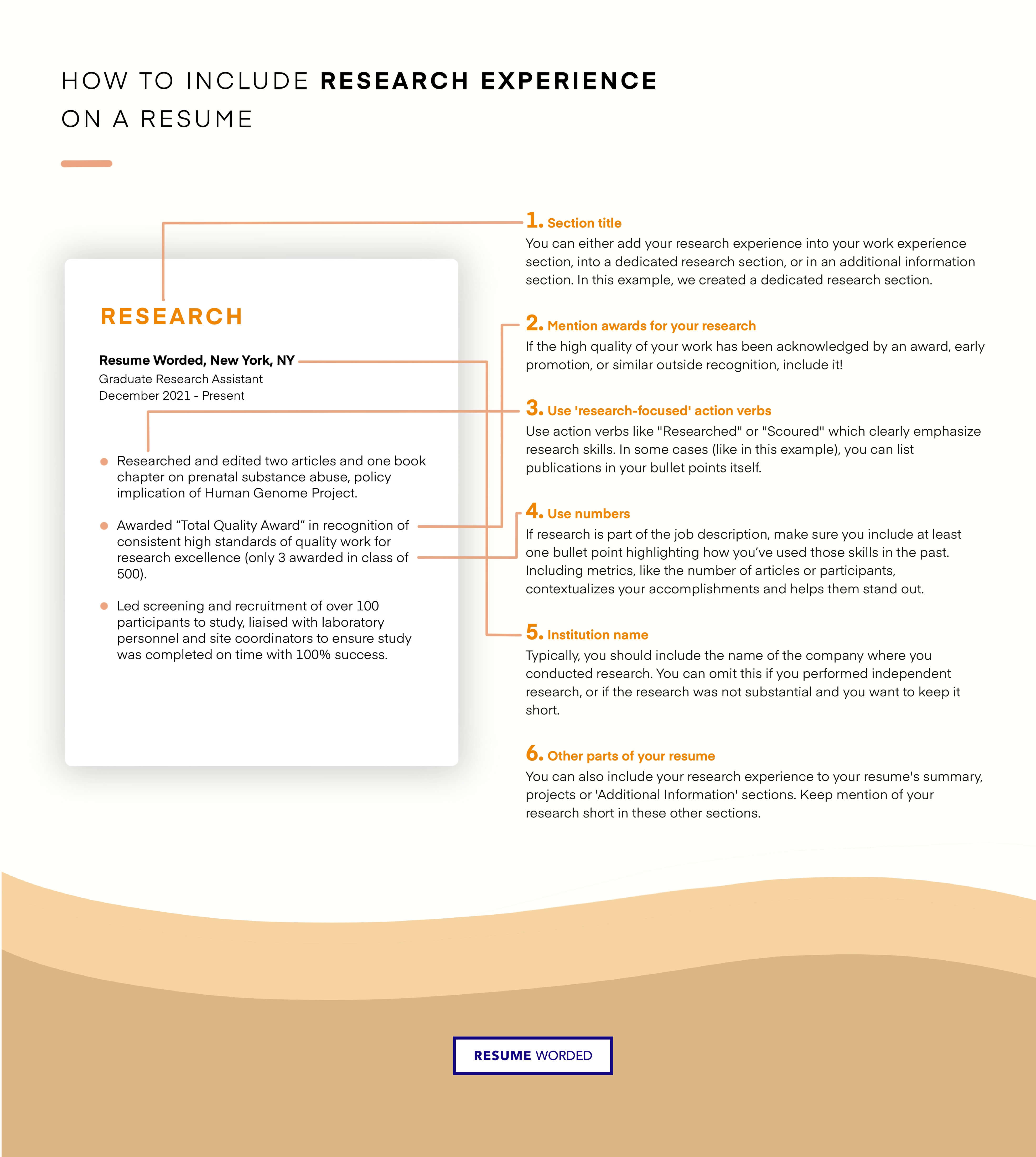
Highlight research and analysis skills and tools.
What you can’t prove in experience, you can prove with your skills list. Ensure you write a comprehensive list of all your learned skills that would be useful in your position. Remember that you can always take courses online to learn new skills to bolster your resume.

Word Cloud for Research Skills & Keywords
The following word cloud highlights the most popular keywords that appear on Research job descriptions. The bigger the word, the more frequently it shows up on employer's job postings. If you have experience with these keywords, include them on your resume.

Get your Resume Instantly Checked, For Free
Upload your resume and we'll spot the issues in it before an actual research recruiter sees it. for free., what are the top skills you should add to your research resume.
The most common skills and keywords we found on Research resumes and job postings were MATLAB, Python (Programming Language), C++, LaTeX, R (Programming Language), Research, Machine Learning and C (Programming Language). Skills like Consumer Behavior, Marketing, Agile Methodologies, Regulatory Submissions and Design Control also appeared on related job postings.
How do resume skills compare between a Research Consultant and a Research Coordinator?
Popular skills we often see on resumes for Research Consultant positions include:
In comparison, skills we see on Research Coordinator resumes include:
What are good resume skills to include for different Research roles and job titles?
Depending on the specific role you apply to, you may need to emphasize different skill sets. Here are a few examples:
- Research Coordinator : Research, Clinical Trials, Clinical Research, Data Analysis and Qualitative Research
- Research Consultant : Quantitative Research, Statistics, IBM SPSS, Program Evaluation and R (Programming Language)
- Vice President Research And Development : Research and Development (R&D), Product Development, Commercialization, Cross-functional Team Leadership and U.S. Food and Drug Administration (FDA)
Target your Resume to a Job Description
While the keywords above are a good indication of what skills you need on your resume, you should try to find additional keywords that are specific to the job. To do this, use the free Targeted Resume tool. It analyzes the job you are applying to and finds the most important keywords you need on your resume. It is personalized to your resume, and is the best way to ensure your resume will pass the automated resume filters. Start targeting your resume
Most resumes get auto-rejected because of small, simple errors. These errors are easy to miss but can be costly in your job search. If you want to make sure your resume is error-free, upload it to Score My Resume for a free resume review. You'll get a score so you know where your resume stands, as well as actionable feedback to improve it. Get a free resume review
Scan your skills and keywords.
Creating an account is free and takes five seconds. you'll get instant access to all skills and keywords, plus be able to score your resume against them - no strings attached., choose an option..
- Have an account? Sign in
E-mail Please enter a valid email address This email address hasn't been signed up yet, or it has already been signed up with Facebook or Google login.
Password Show Your password needs to be between 6 and 50 characters long, and must contain at least 1 letter and 1 number. It looks like your password is incorrect.
Remember me
Forgot your password?
Sign up to get access to Resume Worded's Career Coaching platform in less than 2 minutes
Name Please enter your name correctly
E-mail Remember to use a real email address that you have access to. You will need to confirm your email address before you get access to our features, so please enter it correctly. Please enter a valid email address, or another email address to sign up. We unfortunately can't accept that email domain right now. This email address has already been taken, or you've already signed up via Google or Facebook login. We currently are experiencing a very high server load so Email signup is currently disabled for the next 24 hours. Please sign up with Google or Facebook to continue! We apologize for the inconvenience!
Password Show Your password needs to be between 6 and 50 characters long, and must contain at least 1 letter and 1 number.
Receive resume templates, real resume samples, and updates monthly via email
By continuing, you agree to our Terms and Conditions and Privacy Policy .
Lost your password? Please enter the email address you used when you signed up. We'll send you a link to create a new password.
E-mail This email address either hasn't been signed up yet, or you signed up with Facebook or Google. This email address doesn't look valid.
Back to log-in
Find out what keywords recruiters search for. These keywords will help you beat resume screeners (i.e. the Applicant Tracking System).
get a resume score., find out how effective your resume really is. you'll get access to our confidential resume review tool which will tell you how recruiters see your resume..

Thank you for the checklist! I realized I was making so many mistakes on my resume that I've now fixed. I'm much more confident in my resume now.


Build my resume
- Build a better resume in minutes
- Resume examples
- 2,000+ examples that work in 2024
- Resume templates
- Free templates for all levels
- Cover letters
- Cover letter generator
- It's like magic, we promise
- Cover letter examples
- Free downloads in Word & Docs
9 Academic Resume Examples That Worked in 2024
Best for senior and mid-level candidates
There’s plenty of room in our elegant resume template to add your professional experience while impressing recruiters with a sleek design.
Resume Builder
Like this template? Customize this resume and make it your own with the help of our Al-powered suggestions, accent colors, and modern fonts.
Academic Resume
- Academic Resumes for Students
- Academic Resumes for Advisors
- Other Academic Resumes
How to Write an Academic Resume
If you’re applying to a Ph.D. program, looking to be a research assistant, or planning to teach at the college level, employers may request that you submit a CV instead. There are some key differences between a CV and a resume you’ll want to know about.
If you’re still looking to generate a cover letter or write a resume , stick with us. We’ve reviewed hundreds of academic resumes and highlighted common mistakes job seekers make. With this information, we’ve created the perfect resume for applicants in various academic fields and practices.
Whether you’re looking for a job as an academic advisor or wanting to advance your research or student career, we’ll show you the best nine academic resume samples that worked in 2024.
or download as PDF
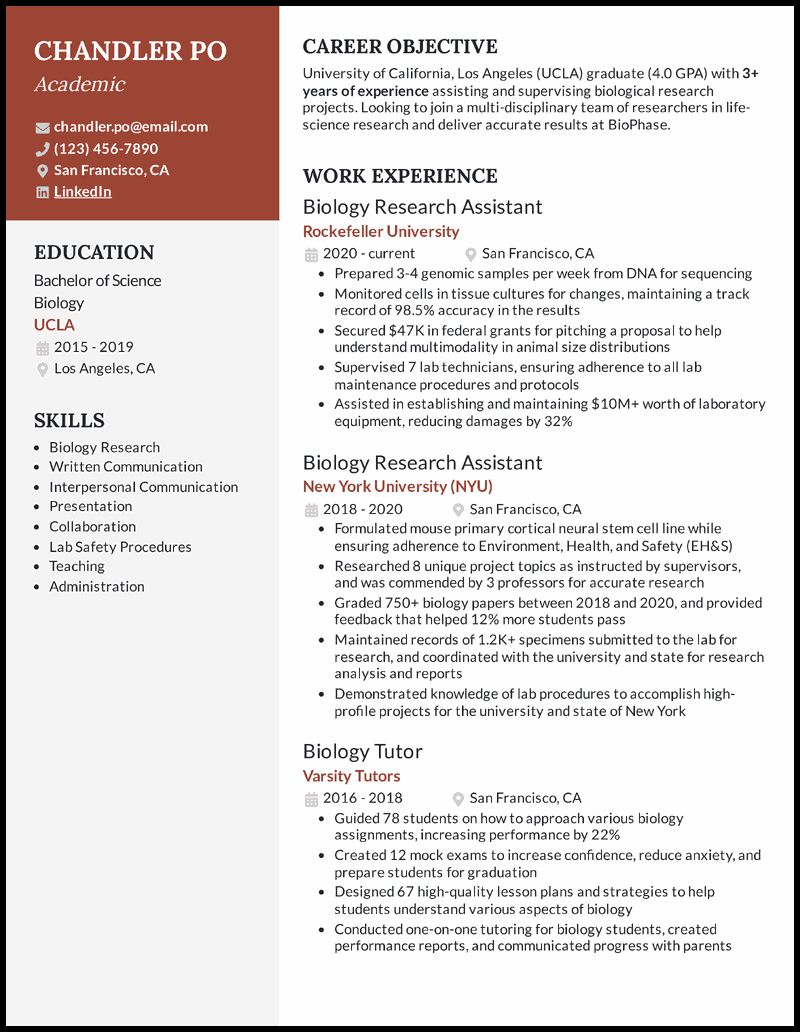
Why this resume works
- Be specific and to the point while conveying your best.
- Customize your objective by mentioning the target business by name and sprinkling in some relevant keywords from the job description .
- Use industry-specific terms in your academic resume and pepper it with solid metrics to demonstrate your impact.
- For example, saying you “prepared 3-4 genomic samples per week from DNA for sequencing” shows your industry familiarity while using numbers to offer an easy-to-read glimpse of your duties.
Scholarship Academic Resume
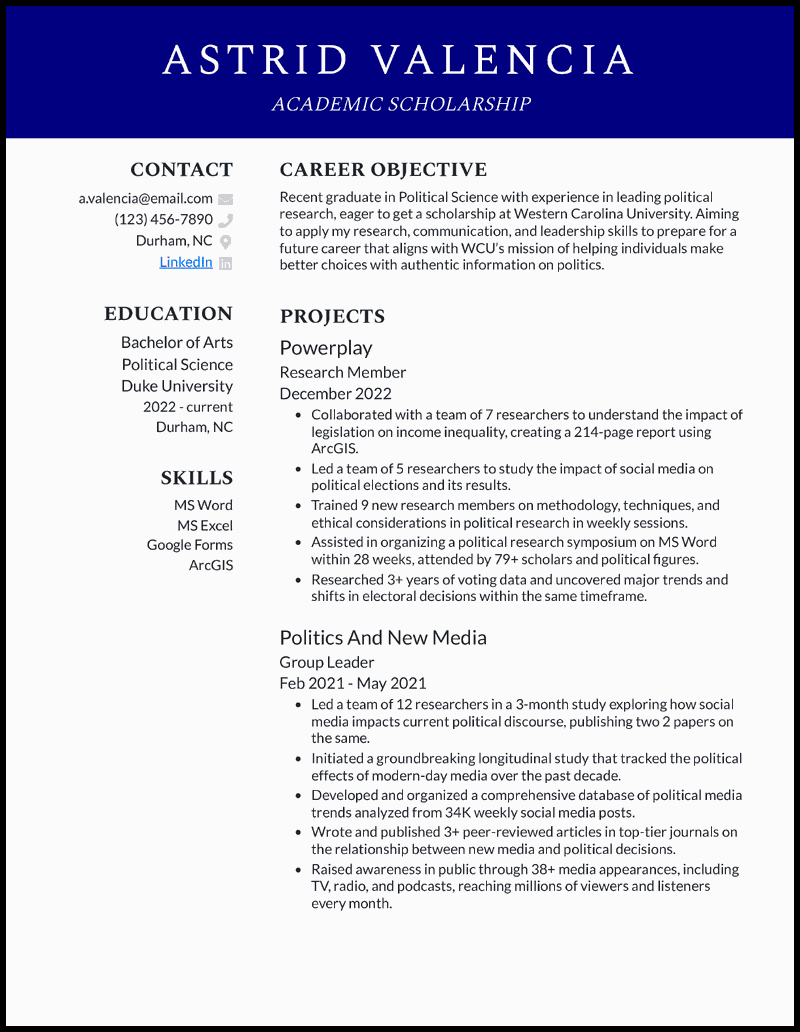
- Add any projects that you’ve been a part of or have volunteered for. Since you’re only a graduate, academic institutions know you won’t have much experience to showcase. As long as your resume contains coherent future goals backed by relevant experience, you’ll be good to go!
High School Academic Resume
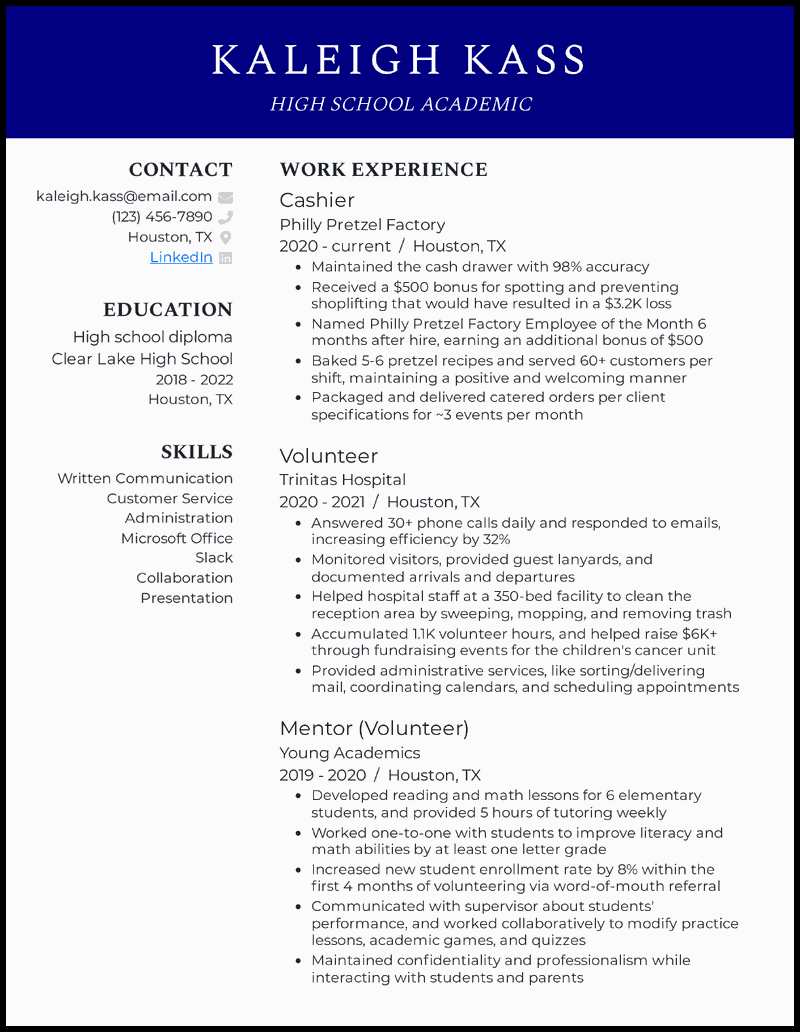
- When writing your high school academic resume , try to be concise without leaving out important information. Using words like ‘successfully’ or ‘skillfully’ will only take up extra space and may be considered filler.
- We suggest using the reverse-chronological resume format for an easy-to-read, logical flow.
- Reverse-chronological formatting orders your work experience and education from the most recent to the oldest, so employers get to the most relevant stuff first.
- Double-check your resume work experience bullet points to ensure they take less than three lines and stick to between 20 to 200 characters per bullet.
College Academic Resume
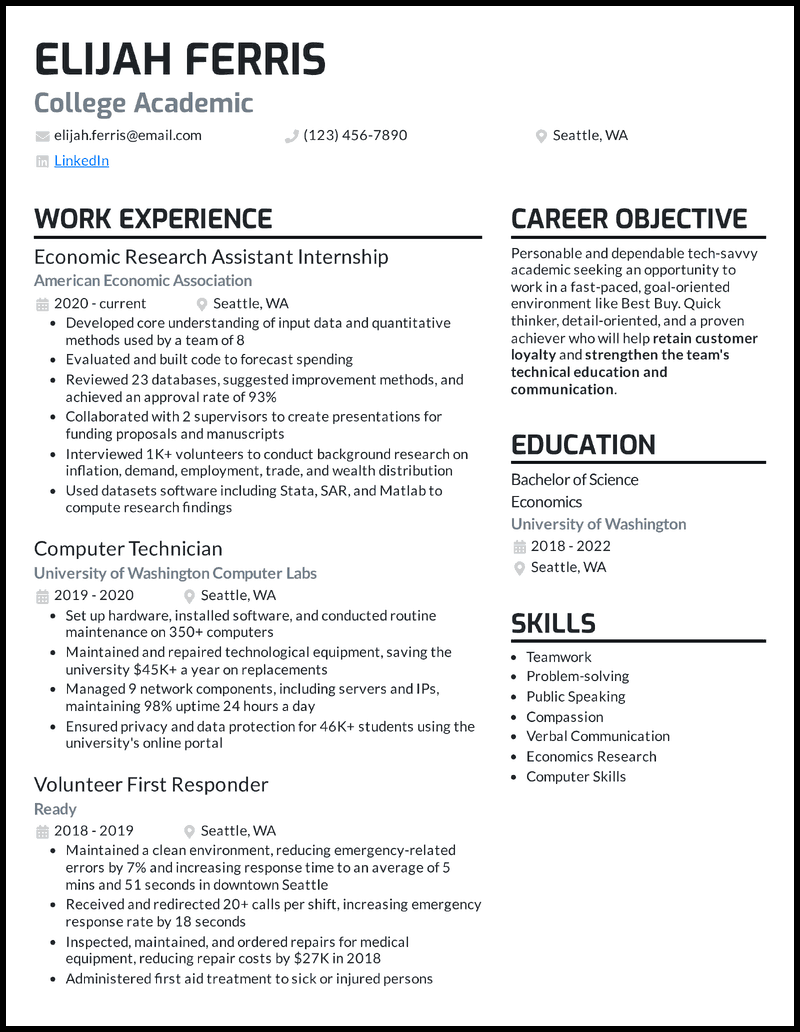
- The most critical sections in your college academic resume are the contact information, work experience, skills, and education.
- For example, “Inspected, maintained, and ordered repairs for medical equipment, reducing repair costs by $27K in 2018” proves that you won’t need a lot of training and will add value right away.
Grad School Academic Resume
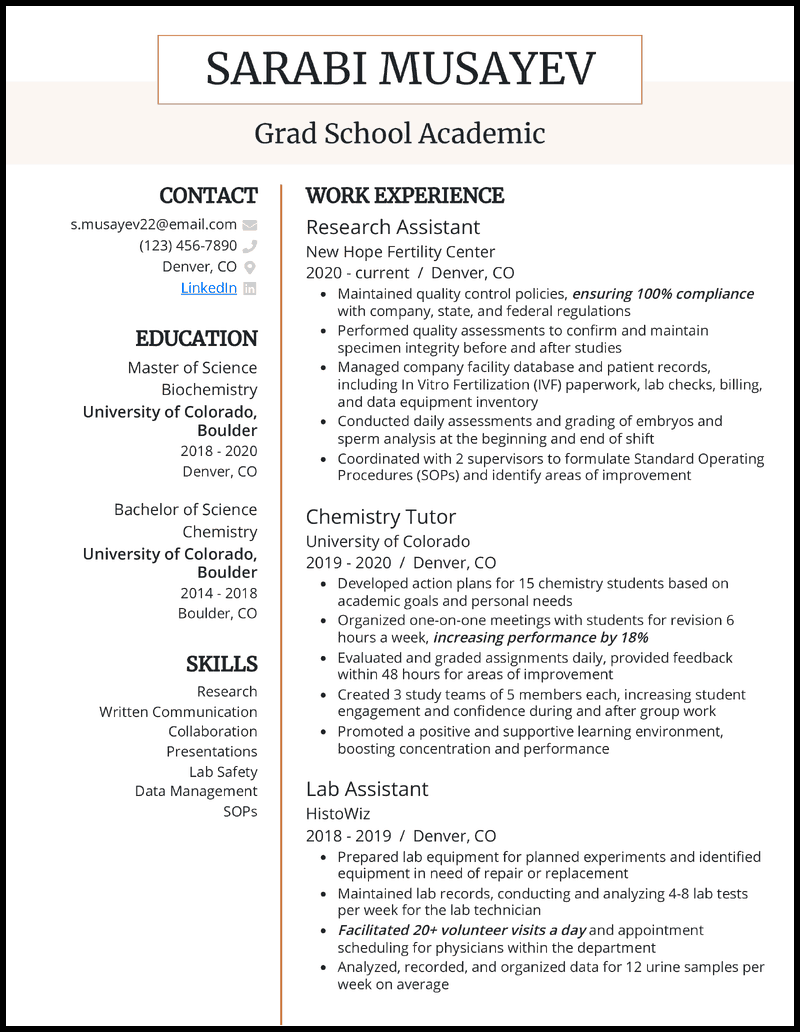
- Your grad school academic resume should highlight your dependability and commitment to excellence.
- For example, “Developed action plans for 15 chemistry students based on academic goals and personal needs”
- Lastly, polish it off with a hint of subtle color for pop while remaining professional, and don’t be afraid to have just a touch of white space.
Academic Advisor No Experience Resume

- If you have any project experience with researching fields of study or guiding students toward their future, add them at all costs! Any amount of experience with improving a student’s learning ability and grades will do wonders too.
Academic Advisor Resume
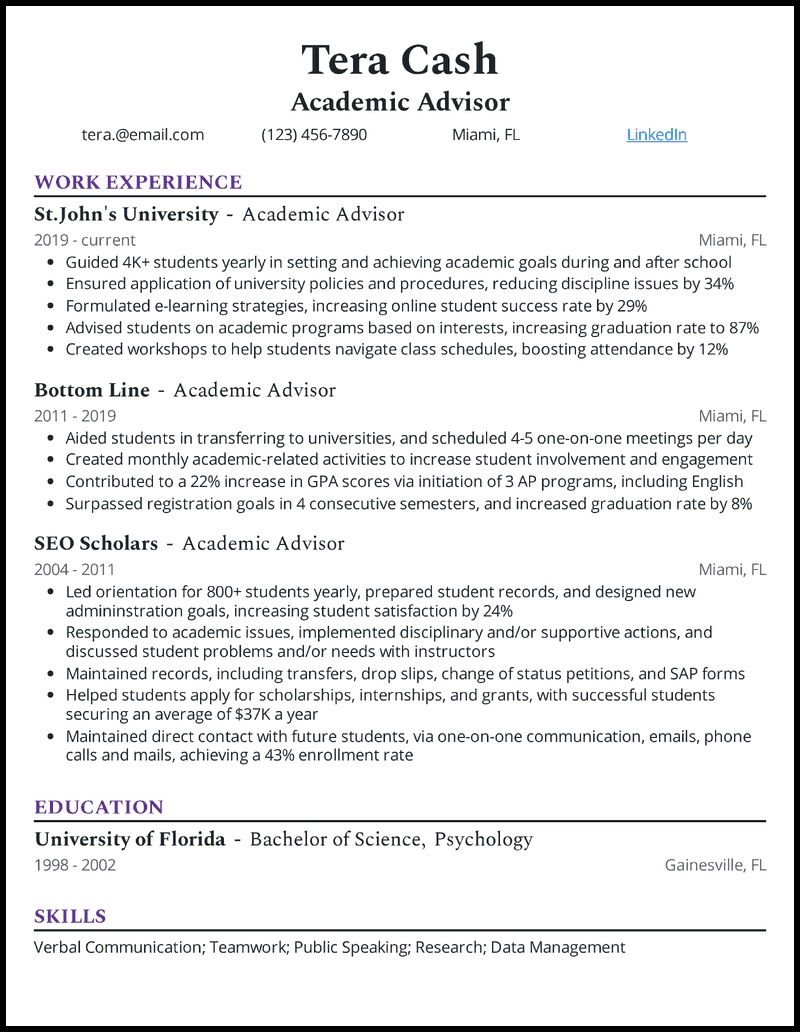
- Quantifying your impact provides a numerical overview of what recruiters can expect from you.
- How many students did I advise?
- Did I help students obtain scholarship money? If so, how much?
- Did I get positive performance reviews?
- Don’t exaggerate your results or resume skills , hoping to impress recruiters. It will break their trust and put too much pressure on you if hired.
Academic Coach Resume

- This won’t just underscore your commitment to continual learning and adherence to international coaching standards. It also reflects your expertise in dealing with familial and youth-related situations, a skill crucial for academic mentorship. Other certifications you could flaunt in your piece are Instructional Coaching Penn GSE and ALC Academic Life Coaching.
Academic Library Resume

- Suppose you once served as a receptionist where you handled social media, managed documents, or used tools like Microsoft Teams to better communicate with internal teams. Transferable skills learned from these experiences can prove useful in your quest for the library role.
Related resume guides
- Grad school
- Teacher Assistant
- College graduate
- Executive assistant

No matter where you are in your academic career, we can walk you through in four easy steps how to write your own academic resume. As you work through these steps, you’ll find the academic resume samples above will help you stay on track and give you the inspiration you need to make your own.
Use a reverse-chronological format to list experience, volunteer efforts, and personal and academic projects. If you’re between early high school or post-graduate school, we bet you have academic and personal projects, like research, internships, mentoring, volunteering, etc. that you can talk about in reverse-chronological order.
Functional and combo formats are tempting, but a reverse timeline will give recruiters the best insight into your skills and what you offer.
Especially if pursuing higher education, list the school, degree, and year you earned the degree in your academic resume. If you’re still studying, set the date to the anticipated graduation year.
List relevant courses to your degree plan. For example, if you’re a Biology major wanting a research assistant position, Biology of Mammalian Cells and Tissues would be a relevant course. You can also include a high GPA as well as honors, awards, and affiliations.
Briefly explain how the skills you’ve gained from your academic background (UCLA graduate with 3+ years of assisting and supervising biological research) couple well with the role (collaborate with a multi-disciplinarian team in life-science research) you’re seeking at a specific organization.
As you read a company’s job ad, what qualities and traits are important for the role that resonate with you? Let that be your springboard to write a customized career objective.
Share results whether the work you’ve done has been paid work, volunteer work, or even class projects. For example, maybe you volunteered to mentor students at a tutor center.
Rather than say you developed lessons or communicated with parents, discuss outcomes that speak to your abilities. “Worked one on one with students to improve math scores by one letter grade” or “increased student enrollment by 8% with new referral program” speaks volumes about your work!
These kinds of bullet points also make a great launching pad for story-telling in your academic cover letter .

Jobscan > Resume Examples > Education Resume Examples, Skills, and Keywords > Research Assistant Resume Examples, Skills and Keywords
Research Assistant Resume Examples, Skills, and Keywords
Research assistants work to support researchers with their daily work, and their resume needs to demonstrate those skills. Here’s how to write a research assistant resume that shows you can do the job well.
Research Assistant Resume Sample
A research assistant resume should show potential employers that you know how to do the job. Your goal is to explain your experience, training, and specific skills without sounding generic. The easiest way to accomplish this is to focus on what the hiring manager needs you to do and answer their questions in advance.
Research assistants handle routine tasks so researchers have more time to focus on their subject. You need to have hard skills relevant to your field , whether that’s lab work or research. You also need soft skills like the ability to work on a team and pay attention to detail. If you can anticipate what a researcher will need from an assistant, you can build a resume that will get their attention .
If you need inspiration, look at this research assistant’s sample resume.
Seattle, WA 98101 • (555) 555-1234 • [email protected] • linkedin.com/in/joe-jobscan
RESEARCH ASSISTANT
Expertise in data science with a knack for math, statistics, data mining, machine learning, and optimization-based numerical methods; built skills in data gathering, data modeling, data preparation, data wrangling of complex and large data sets and creating ETL processes and data pipelines.
Python, Matlab | C++ | Java | R | MySQL | Javascript | Jupyter notebook | PySpark | PyTorch | TensorFlow | Scikit-learn | Scipy | Pandas | numpy | Hadoop | Map/Reduce | Hive | Spark | HBase | Spark | AWS (SageMaker, ML, S3, Redshift) | Agile | Scrum
Gained extensive quantitative research skills and established a practical experience building models and prototypes, designing, coding and optimizing products, and using machine learning algorithms and data mining techniques in more than three projects sponsored by organizations such as NIH, DARPA and QuintilesIMS. And resulted in 3 peer-reviewed publications.
- Formulated a statistical learning model for clustering hospitals with clustering homogeneity enhancement by 60% based on admission behavior and similarities among disease symptoms during admission decision; spanning feature selection, feature engineering, classification, clustering, regression, and spatial and time series analysis.
- Served as both a leader and an integral member of a team to collaborate on building strategic plans, timelines, writing proposal reports and performance metrics to gauge progress towards project and product development goals.
- Individually and collaboratively, collected and presented findings to audiences of varying degrees of technical expertise and business stakeholders.
Coordinated and led in-class teaching for graduate and undergraduate students enrolled in the College of Science and Technology.
- Courses included the Knowledge Discovery and Data Mining graduate course, as well as the undergraduate course Mathematical Concepts in Computing.
Ph.D. in Computer and Information Science
Master of Science Degree in Computer Science
Bachelor of Science Degree in Computer Science
Why this resume works
Research Assistant Resume Skills and Keywords
Research fields are crowded, and every research assistant job will receive lots of applications. To make the hiring process less overwhelming, employers will use applicant tracking systems (ATS) . These systems filter applications for the research assistant resume keywords they want to see. Candidates who don’t include these keywords aren’t considered because they never make it through the filters. That’s why it’s so important to list the right resume skills .
Top Research Assistant Resume Skills
- Microsoft Office
- Verbal and written communication
- Attention to detail
- Quality control standards
- Application review
- Statistical and graphical data analysis
- Data entry
- Lab maintenance procedures
- SAS testing
- Problem-solving
- Research methods
- Safety protocols
- Cataloging
- Project management
- Presentations
- Organization
- Domain knowledge
- Report generation
- Statistics
- Experimental procedure
- Database management
- Spring Framework
- Time management
- Dependability
- Resilience
5 Resume Writing Tips for Research Assistants
When you’ve decided what skills you want to include on your resume, you can build a document that gets results with these five resume tips.
1. Use the right format
The very first thing that potential employers will see is the format of your resume . Before they read anything, they’ll notice how things look on the page. It’s best to use a traditional resume format such as reverse chronological order unless an employer asks for something different.
Traditional formats are traditional for a reason: they’re easy to read and condense a lot of information into one page. While you can explore different font choices and header designs, the body of your resume should follow standard guidelines. If you’re not sure about your formatting, ask a friend or colleague to look it over for you.
2. Introduce yourself effectively
After your header, the first element of your resume is a personal statement or resume summary . This is a short paragraph describing your experience in the field, your most essential skills, and your major achievements. Hiring managers use this summary to decide whether they want to keep reading, so take the time to write it well.
Here’s an example of a good personal statement: “Enthusiastic biochemistry student looking to provide research support to Greenfield Labs. 2+ years of experience including working with confidential information, leading 3+ successful volunteer research projects, and implementing new data entry procedures to reduce errors by 15%.”
This summary will get attention for several reasons. It explains the candidate’s objective right away and mentions the employer by name. That means that the candidate took the time to customize their application. It also lists three relevant accomplishments, so the hiring team has an idea of what they can expect.
3. Be upfront about your skills
Some research facilities only hire assistants who already have the skills they need. Others are willing to train people on the job. Either way, you should be clear about the skills you have so you can make it through ATS filters.
While you can’t control how employers filter resumes, you can take steps to meet their filtering criteria. A skills section lets you include keywords that weren’t relevant to previous jobs or your educational history. It also lets you include research assistant skills that don’t fit elsewhere. And best of all, it makes your resume easy to skim, which can be the difference between getting the interview and getting overlooked.
4. Use action words to get attention
It can be tempting to describe your past responsibilities vaguely. That’s not going to help your application. Writing that you “participated in research” doesn’t tell hiring managers what you actually did. They understand you may not have years of past experience. They just want to know what you’ve already done and what they need to train you to do.
Instead of generic phrases, use action words to describe your responsibilities, like:
- Determined
- Formulated
- Maintained
5. Highlight your education
Research assistant jobs are often the first step toward a career as a research scientist. Many people apply for these positions when they’re fresh out of school or working to change industries. That means employers are used to seeing candidates with little experience, and they’re just as interested in your education.
If you’ve just received a degree in the field, you can list courses that trained you for the position. You can also include extracurricular activities, especially if you volunteered on research projects in the past.
Meanwhile, if you’re retraining or getting certifications in the field, list those qualifications proudly. It shows that you’re putting in the effort to learn new, relevant skills. You may even add a separate heading for certifications if your education was in a different field.
Build an ATS-friendly resume for free
Many resume builders are advertised as free, but they often charge a fee to download your resume. Jobscan's online resume builder has no hidden costs and it’s ATS-compatible.

Optimize Your Research Assistant Resume

AI Essentials Guidelines and Approaches for UTSA Students
A starting point for research, exploration and creativity.
The following approaches and guidelines serve as a starting point to exploration of Generative Artificial Intelligence (GenAI). Developed collaboratively by a team of UTSA students, faculty and staff, it provides tools and guidance aimed at developing knowledge and skills for the use of GenAI. These resources ensure all Roadrunners are prepared to use this new technology responsibly, ethically and productively during their academic careers and beyond!
The guidelines will be updated regularly, based on student and faculty experiences to adapt to changes in GenAI models and tools. Our approach emphasizes our dedication to fostering innovation while respecting individual choices.

AI Essentials: Guidelines & Approaches
Want to learn how you can leverage GenAI in building academic and career success? Launch AI Essentials, a learning module built specifically for UTSA students.
Explore opportunities and discover the potential of Generative AI

Coursera Career Academy
Earn a certificate and enhance your resume
Join the UTSA Learning Program and gain free access to career related micro-credentials in GenAI from leading industry providers like IBM and Meta. These industry-recognized credentials can help you stand out to employers.
Start earning microcredentials >>

Adobe Creative Skills
Sharpen your Adobe creative skills
As an Adobe Creative Campus, UTSA provides access to Adobe's suite of Creative tools to UTSA students. The Adobe Education team has curated these short courses to introduce you to Adobe tools in two hours or less, including on its GenAI tools. Login with your UTSA credentials to get started today!
Get started with Adobe Creative Cloud >>

LinkedIn Learning
Explore hundreds of GenAI courses across different fields
Students can access hundreds of courses that address GenerativeAI on LinkedIn Learning at no cost.
Get started on LinkedIn Learning >>

Discover the latest GenAI developments
GenAI news happens fast! Get a curated list of the latest GenAI insights, research and real-world stories from students and faculty about this transformative tech.
Read more GenAI news >>
Discover how UTSA is using GenAI for teaching and learning
Learn how the Roadrunner community is using GenAI in the classroom and in our community to build new skills, solve grand challenges and create bold futures.
Using GenAI to succeed in a digitally-connected future
Melissa Vito, Vice Provost for Academic Innovation, explains why mastering generative AI skills is crucial for today’s students and explains why you don’t need a deep technical background to succeed.
Exploring creativity with GenAI and Adobe
Explore demos from UTSA's resident Adobe Creative Cloud specialist and learn how GenAI can enhance your work, research and resume! Check out the YouTube channel for a full list of training tutorials.
Building a HigherEd GenAI Community of Practice
UTSA hosted a conference on GenAI in teaching and learning, attracting top-tier talent from across the UT System and other innovative leaders in HigherEd. Watch to learn how students played a role in the event!
View more stories
Learn more about GenAI from other Roadrunners
Does your student organization use GenAI? Email us to get added to the list!
Adobe Student Ambassadors
The ambassadors' program offers workshops, lectures, field trips, special Adobe programming, networking and Adobe swag, not to mention showing Roadrunners to career opportunities with Adobe!
The Association for Computing Machinery
The association's chapter at UTSA is dedicated to giving members and students the opportunity to gain experience, network, socialize, learn and grow outside the classroom in all fields of technology and computing.
The UTSA University Career Center
Turn your GenAI experience into resume highlights, connect with employers, and build new skills at the UTSA Career Center. Plus, get a professional headshot in the Iris Booth.
UTSA's Faculty Guide to GenAI
UTSA faculty have developed their own set of guidelines and approaches to using GenAI. Explore the faculty resource page to see what UTSA instructors are doing with GenAI.
Visit the Teaching & Learning with GenAI >>
Academic Affairs
Phone: (210) 458-4110
Email: [email protected]
Main Building, Suite 4.120
The University of Texas at San Antonio
One UTSA Circle
San Antonio, TX 78249

UTSA's Mission
The University of Texas at San Antonio is dedicated to the advancement of knowledge through research and discovery, teaching and learning, community engagement and public service. As an institution of access and excellence, UTSA embraces multicultural traditions and serves as a center for intellectual and creative resources as well as a catalyst for socioeconomic development - for Texas, the nation and the world.
UTSA's Vision
To be a premier public research university, providing access to educational excellence and preparing citizen leaders for the global environment.
UTSA's Core Values
We encourage an environment of dialogue and discovery, where integrity, excellence, inclusiveness, respect, collaboration and innovation are fostered.
UTSA'S Destinations
- UTSA will be a model for student success
- UTSA will be a great public research university
- UTSA will be an innovative place to work, learn and discover
UTSA is a proud Hispanic Serving Institution (HSI) as designated by the U.S. Department of Education.


IMAGES
VIDEO
COMMENTS
Time management is a powerful soft skill that is especially valuable in research environments. It allows you to manage your time effectively, break large tasks into manageable chunks and prioritize them properly, set up measurable, attainable, and time-bound goals, and even juggle your responsibilities.
Finally, the research you do will usually need to be shared with others in one way or another. Learning to communicate well, compose presentations and collaborate with others is critical to ensuring your research goes as far as it can. Communication skills for your resume: Collaboration. Active listening.
How to put research on your resume. Follow these steps to add research skills to your resume: 1. Review the job description. Start by reviewing the job description closely and identifying whether the employer is looking for specific types of research skills. Make a list of all of the research-related skills they're looking for in a candidate. 2.
Resume examples showcasing research skills. Example #1: Academic Research. Simon Marks. 767 Brighton Blvd. | Brooklyn, NY, 27368 | (683)-262-8883 ... Should you put research skills on your resume? Yes, you should include research skills on your resume as they are an important professional skill.
Academic accomplishments. Research experience. Work experience/history. College activities. ... Including your research skills in your resume can help show a potential employer that you have the ability to suggest new ideas and use critical thinking to find solutions to problems. Most research skills will use attention to detail, problem ...
There are a number of ways you can highlight research experience on your resume: In a dedicated section. In your work experience. In your education section. Listing research publications. In a projects section. In your skills section. In your resume summary.
Maintain margins between 0.5" to 1" to ensure your resume reads easily. Opt for a traditional template which is a must in academia. Choose professional fonts like Bitter and Volkhov in size 12 pt, and stick to a black-and-white color scheme to maintain a formal appearance. Reserve italics only for publication titles.
For students, an academic resume can be particularly advantageous when applying for internships, scholarships, or graduate school. For job seekers, an academic resume can be helpful when applying to research-based or academic positions, as well as positions that require strong academic achievement or research skills. What this Guide will Cover
Then: Add bullet points that show research skills and general academic engagement, think projects, classes, and accomplishments. This undergraduate research resume example shows how: Undergraduate Research Resume Example—Education Section Good Example. BS in Molecular Biology. Columbia University, New York City, NY. Expected graduation: 2022
At any rate, your research experience must be presented in a logical and coherent manner. Here's how you put research on your resume: List all research work you have done previously, no matter what kind it may have been. It may have been academic research from your schooling. It may have been market research you did in your previous positions.
government positions, and research experience for academic and other research positions. RESUME GUIDELINES Getting Started A resume is a concise and informative summary of your education, training, experiences, skills and accomplishments as they relate to the type of employment you are seeking. It should highlight
Organize the information. Your resume will be packed with data and achievements that must be organized. Use a professional resume template with clear headings for education, research, and top skills like Western blotting and molecular biology. Use bullet points with research experience and an easily readable 12-14 point font.
The five (plus) definite sections your resume for a researcher job should include are: Header with your headline, contact details, and/or a preview of your work. Summary (or objective) to pinpoint how your success aligns with the role. Experience with bullets of your most relevant achievements in the field.
When it comes to landing a job in the field of research, having a well-crafted resume can be the key to standing out in a competitive job market. A researcher resume is a document that summarizes your professional experience, education, skills, and other relevant information for a potential employer. An impressive researcher resume can make all the difference in securing an interview and ...
Below is the information you should include in your academic resume, academic skills, and how a resume writing service can help you create the perfect academic resume. ... University or college faculty roles or research positions are ultra-competitive. An academic CV is primarily credential-focused. Because of that, it should include a more ...
Remember, you can also add your research skills to your skills section, if you have one! This is a good place to directly state the skills you used in your research experience. It's important to state your technical skills, such as programming, equipment, etc. and transferrable skills such as communication, data analysis, etc.
3 Grad School Academic. Resume Examples for 2024. Stephen Greet January 14, 2024. While your career is only just getting started, as a grad school academic you already have years of experience with rigorous research, report writing, and teaching. By now, you have likely made contributions to scholarly journals in your field.
Research Resume Keywords and Skills (Hard Skills) ... That means that the employers reading your resume -- labs, government agencies, or academic institutions -- are looking for evidence of your experience and skills in those areas. Do your research to find what types of software the job posting notes, whether that's MATLAB, Solidworks, or ...
Use industry-specific terms in your academic resume and pepper it with solid metrics to demonstrate your impact. For example, saying you "prepared 3-4 genomic samples per week from DNA for sequencing" shows your industry familiarity while using numbers to offer an easy-to-read glimpse of your duties.
Critical thinking. Critical thinking refers to a person's ability to think rationally and analyze and interpret information and make connections. This skill is important in research because it allows individuals to better gather and evaluate data and establish significance. Common critical thinking skills include: Open-mindedness.
2. Research skills Academic assignments, like projects or essays, often require students to conduct research. These skills involve knowing the questions you want to answer, finding credible sources and using effective search strategies. Careers in journalism, analysis and even some medical fields all benefit from well-developed research skills.
On average, the typical resume for a Research Assistant includes 18 skills. Skills such as data collection, research paper writing, collaboration, and Microsoft Office are top choices for Research Assistants. The average resume length for Research Assistants is 2.9 pages.
Top Research Assistant Resume Skills. Microsoft Office. Verbal and written communication. Teamwork. Attention to detail. Quality control standards. Application review. Statistical and graphical data analysis. Data entry.
A starting point for research, exploration and creativity. The following approaches and guidelines serve as a starting point to exploration of Generative Artificial Intelligence (GenAI). Developed collaboratively by a team of UTSA students, faculty and staff, it provides tools and guidance aimed at developing knowledge and skills for the use of ...